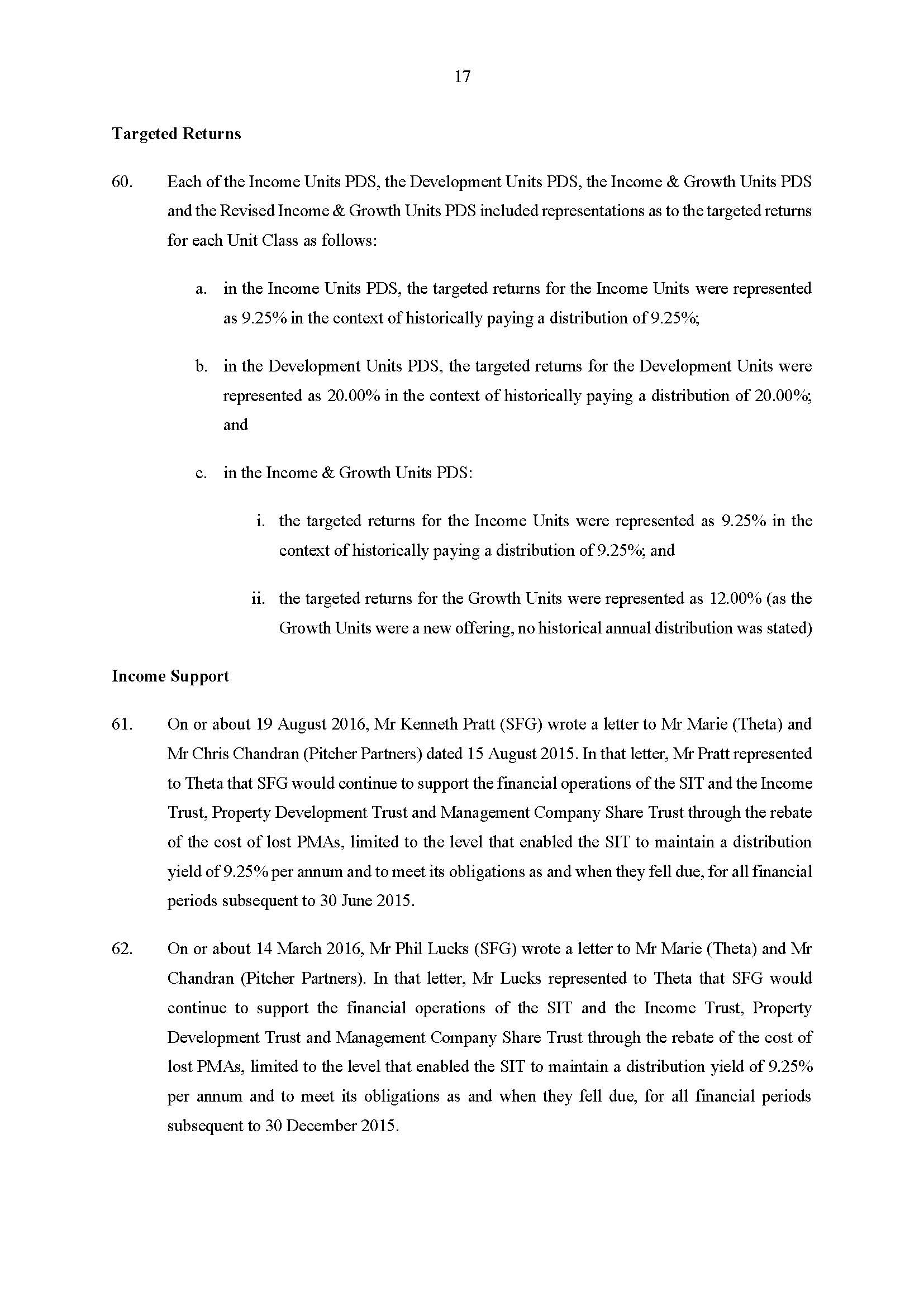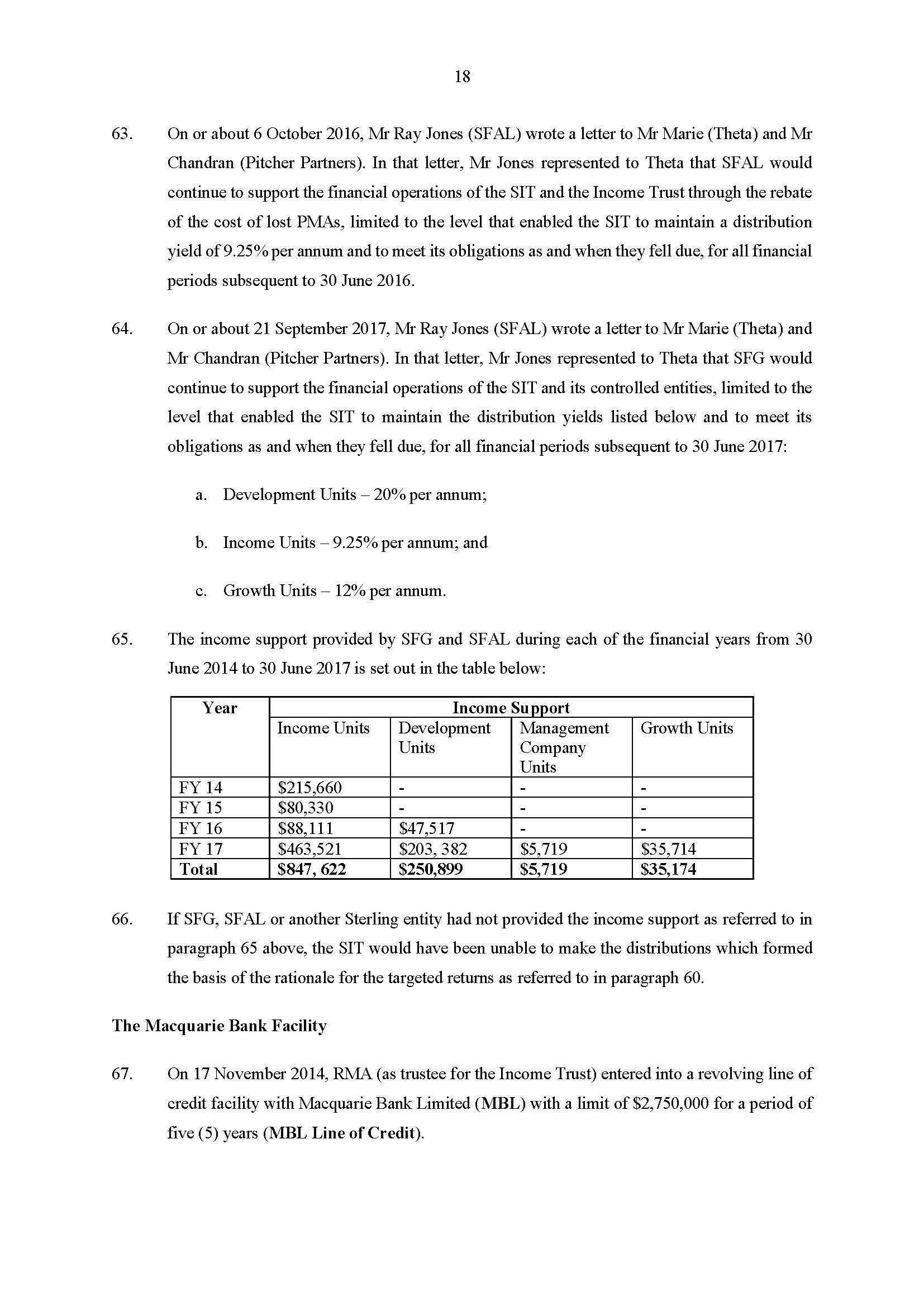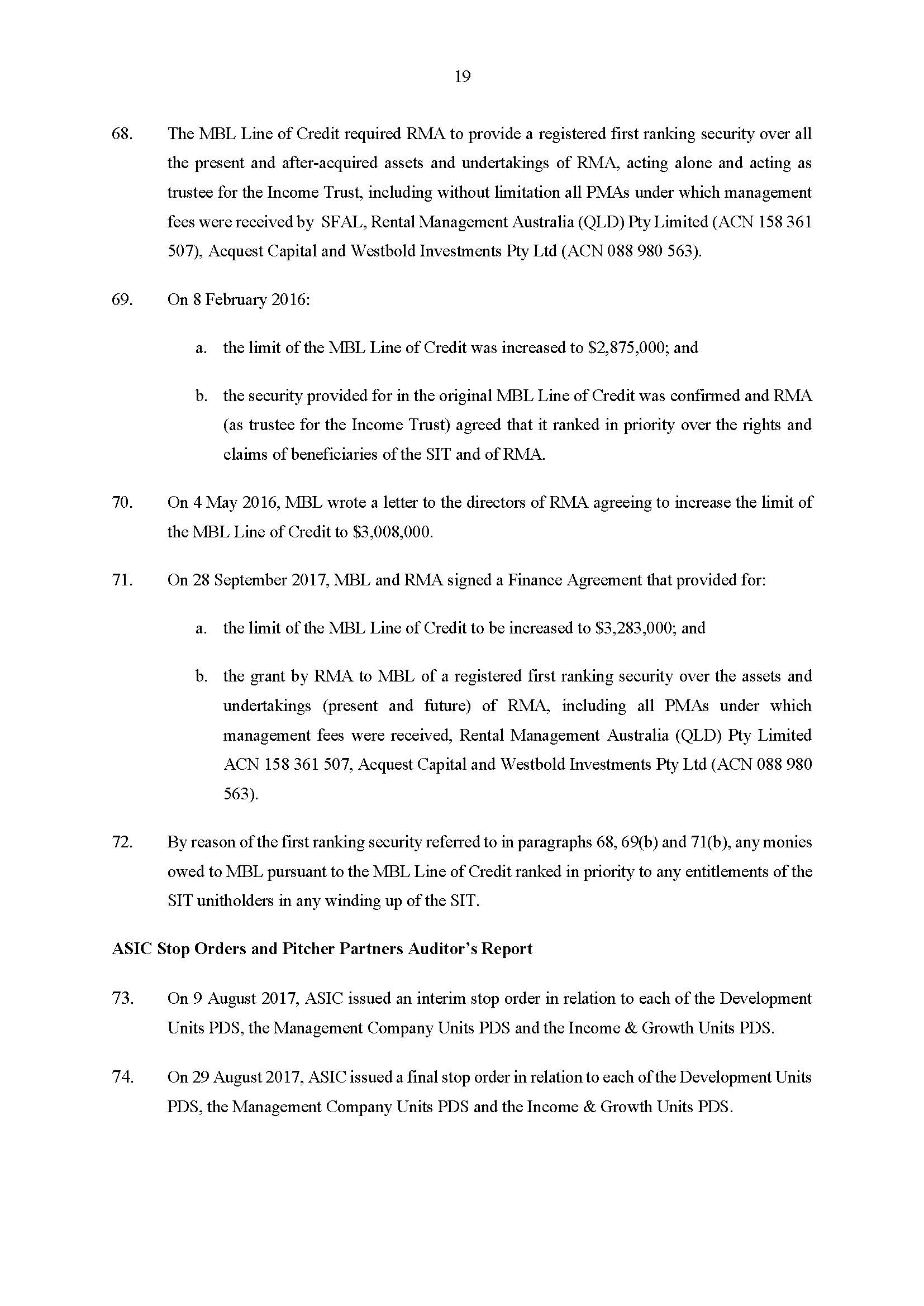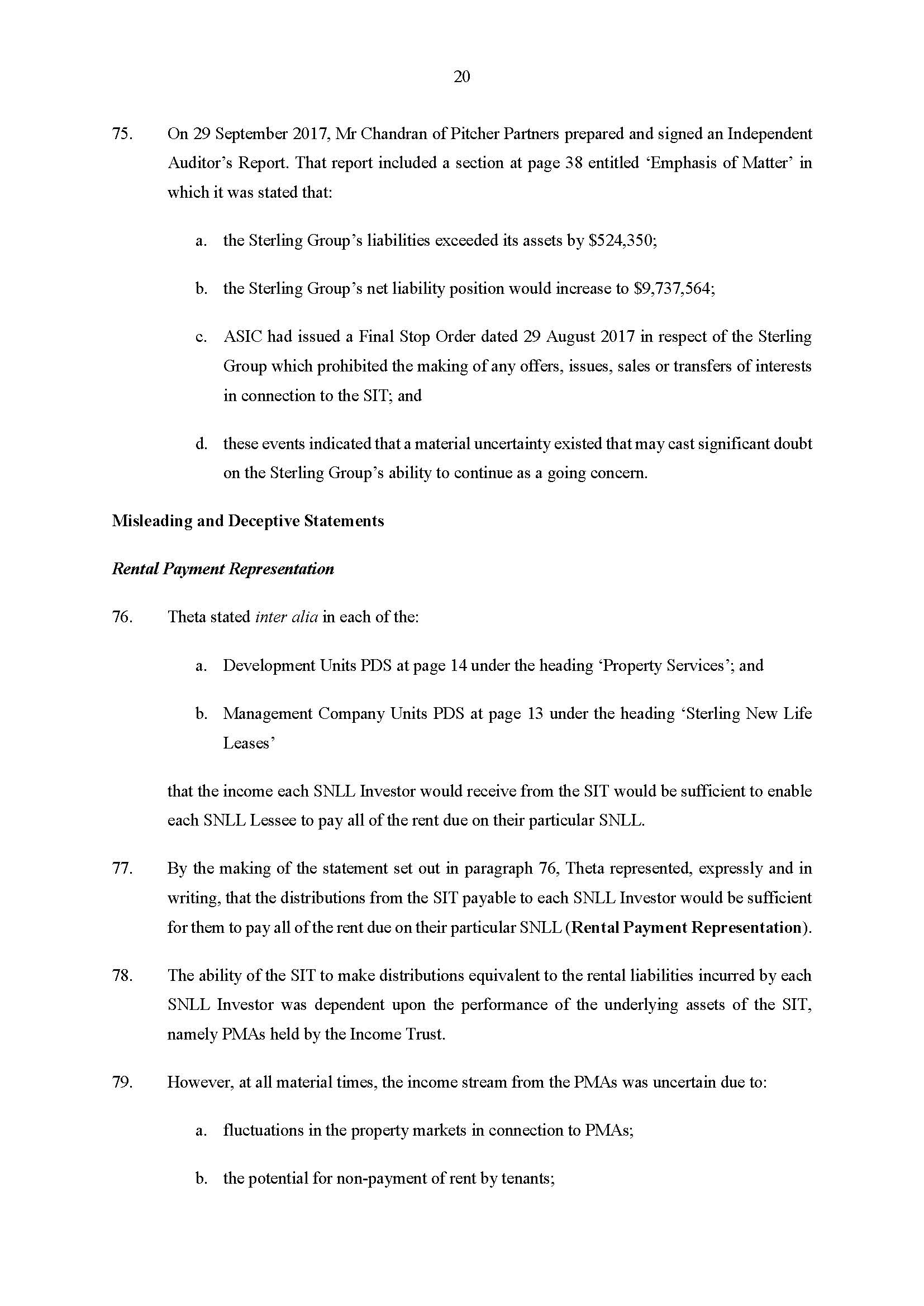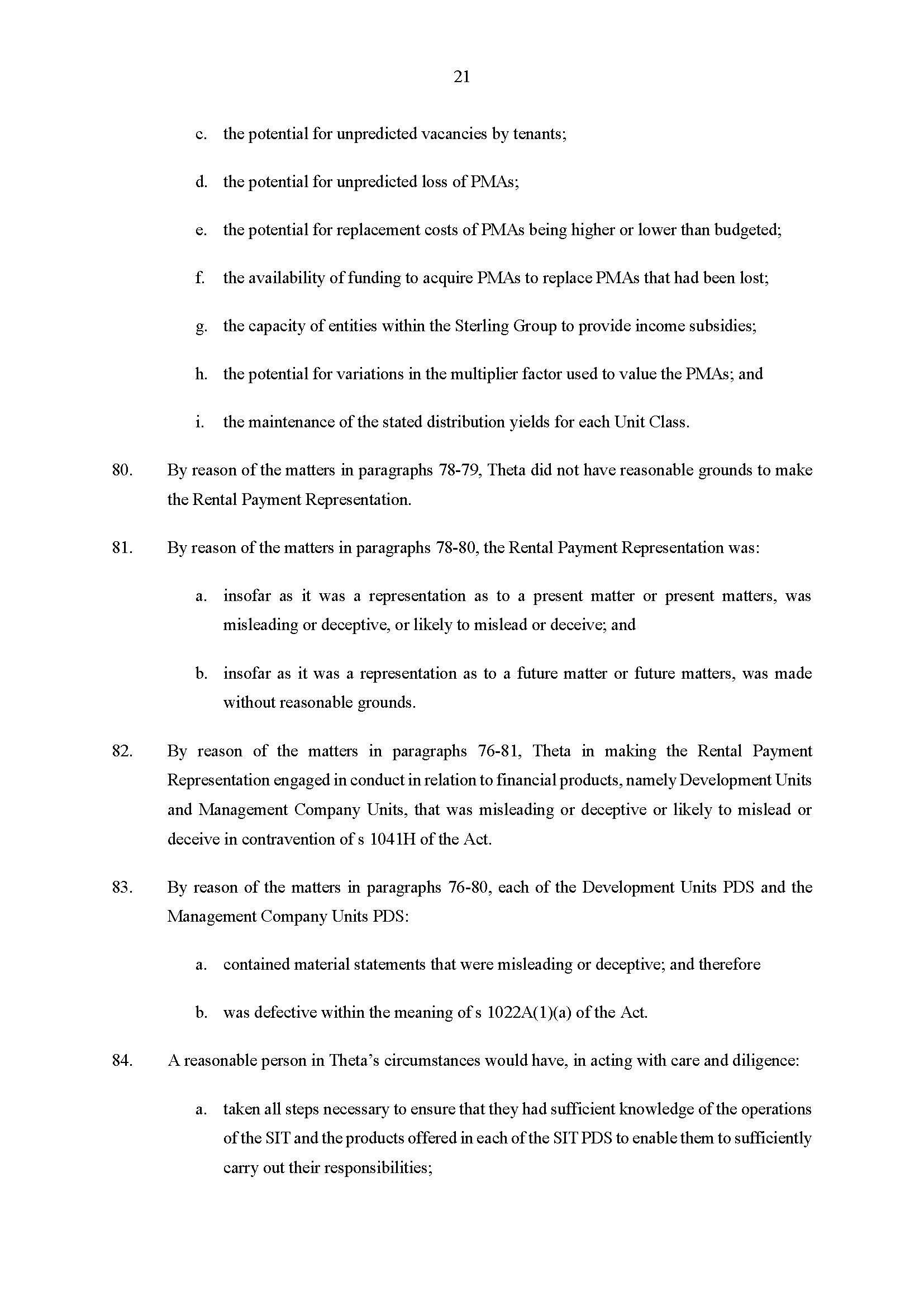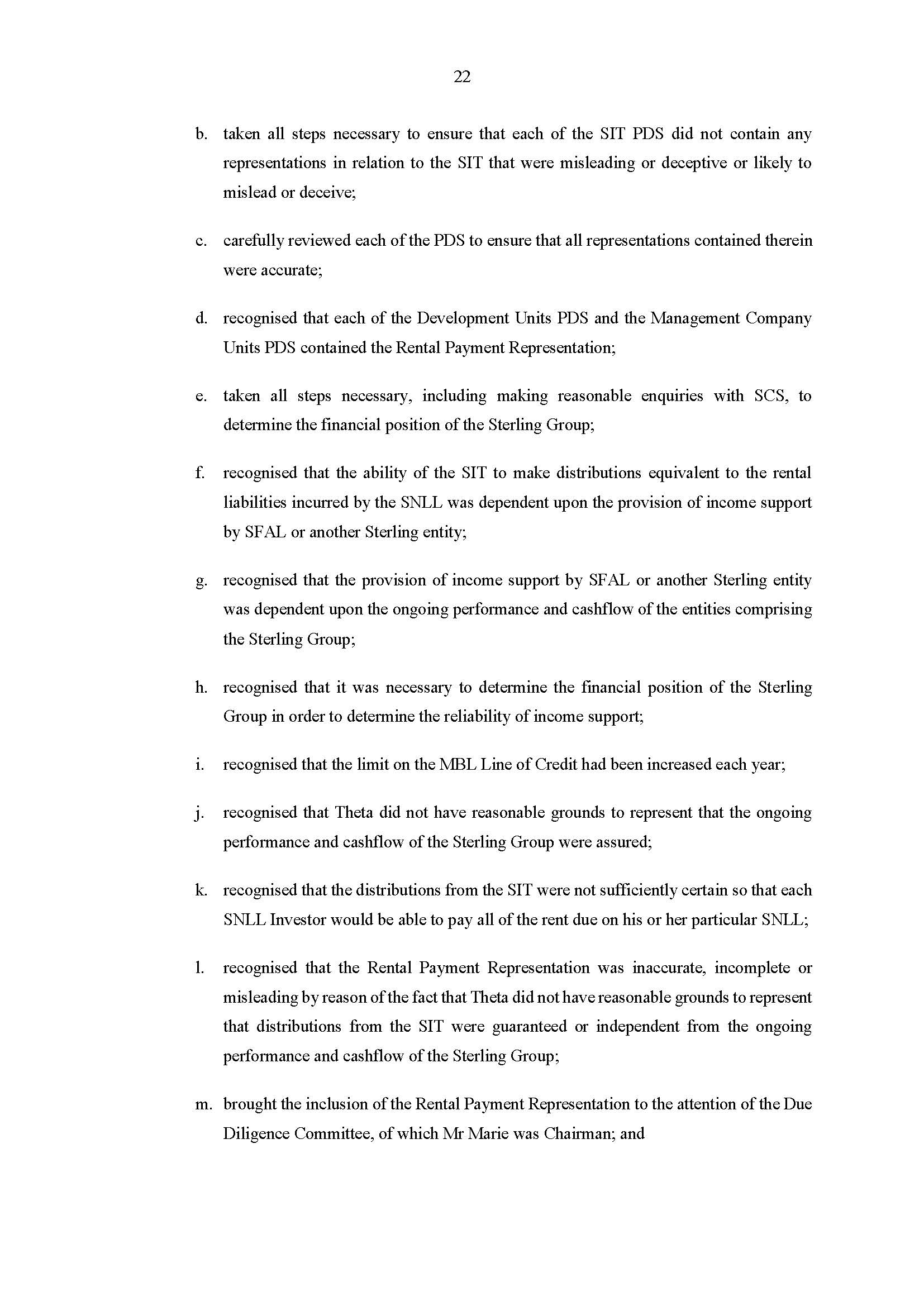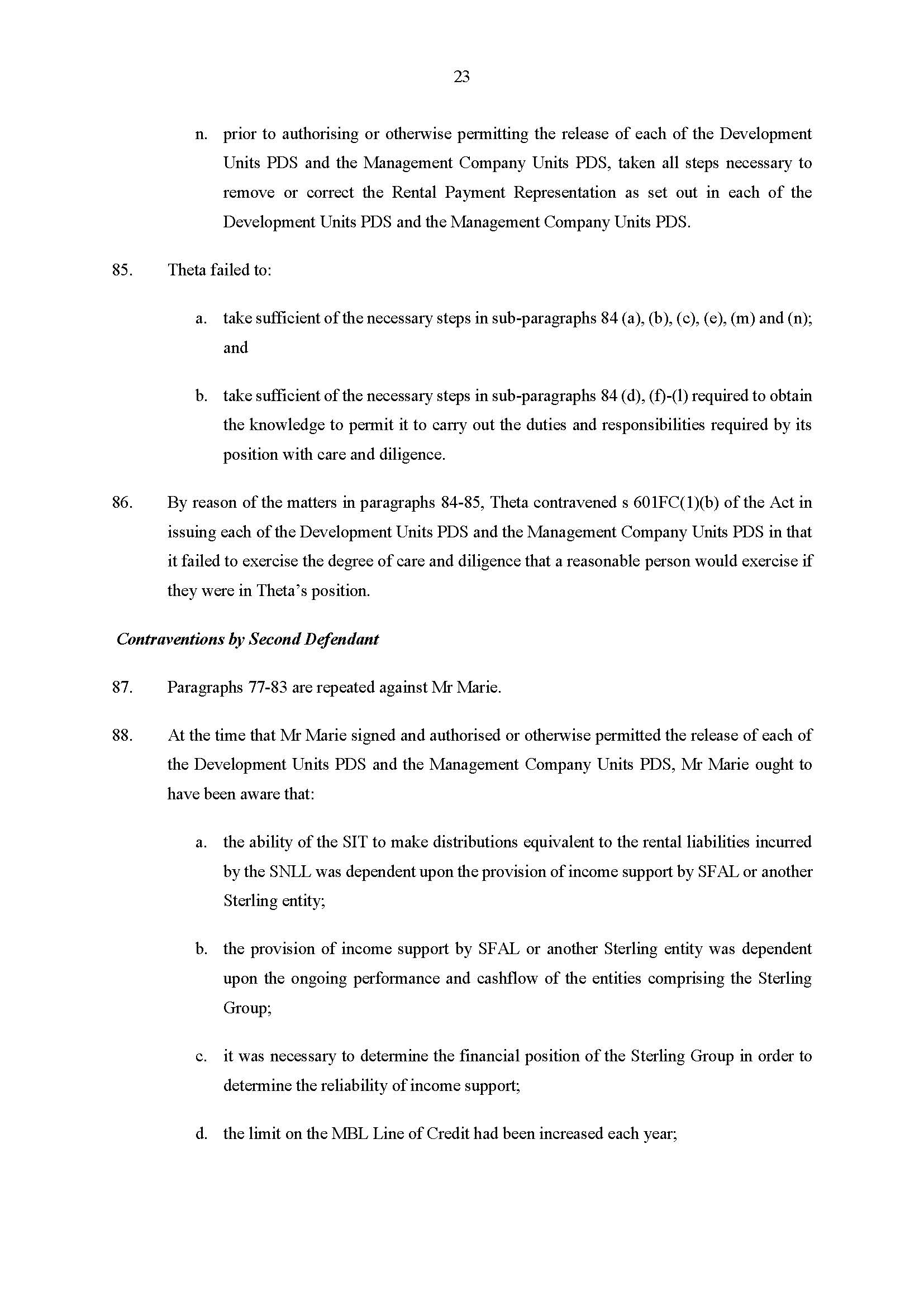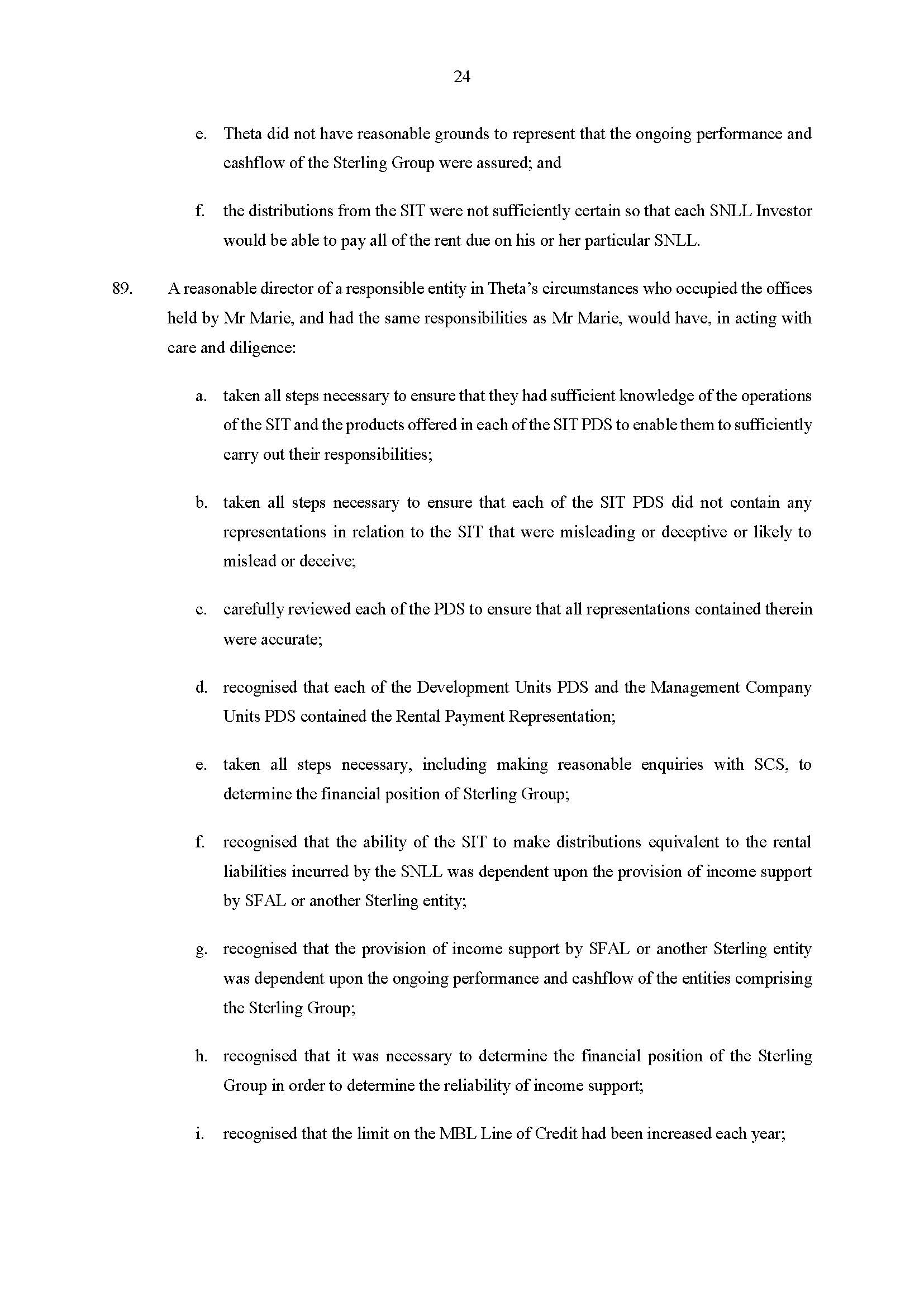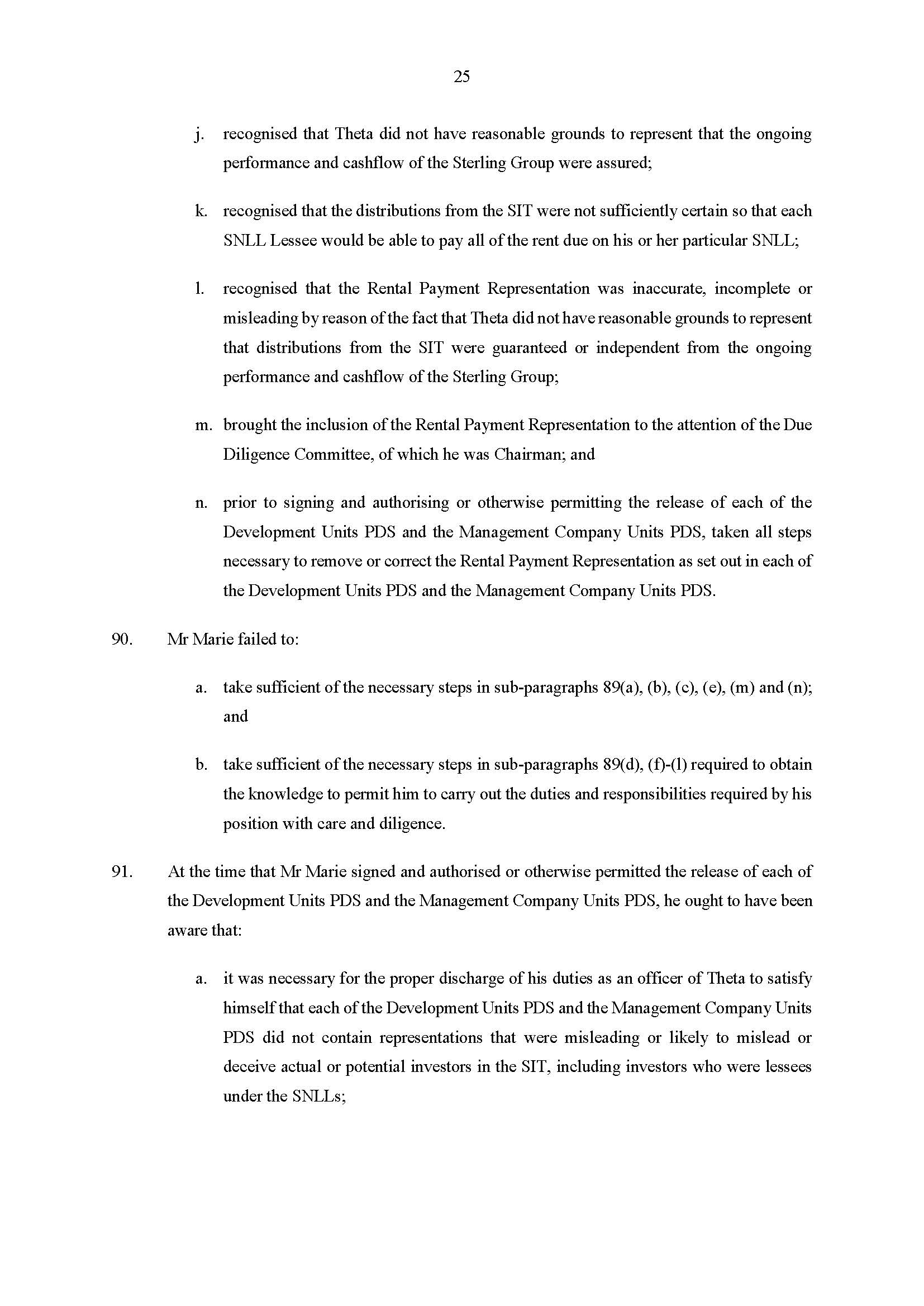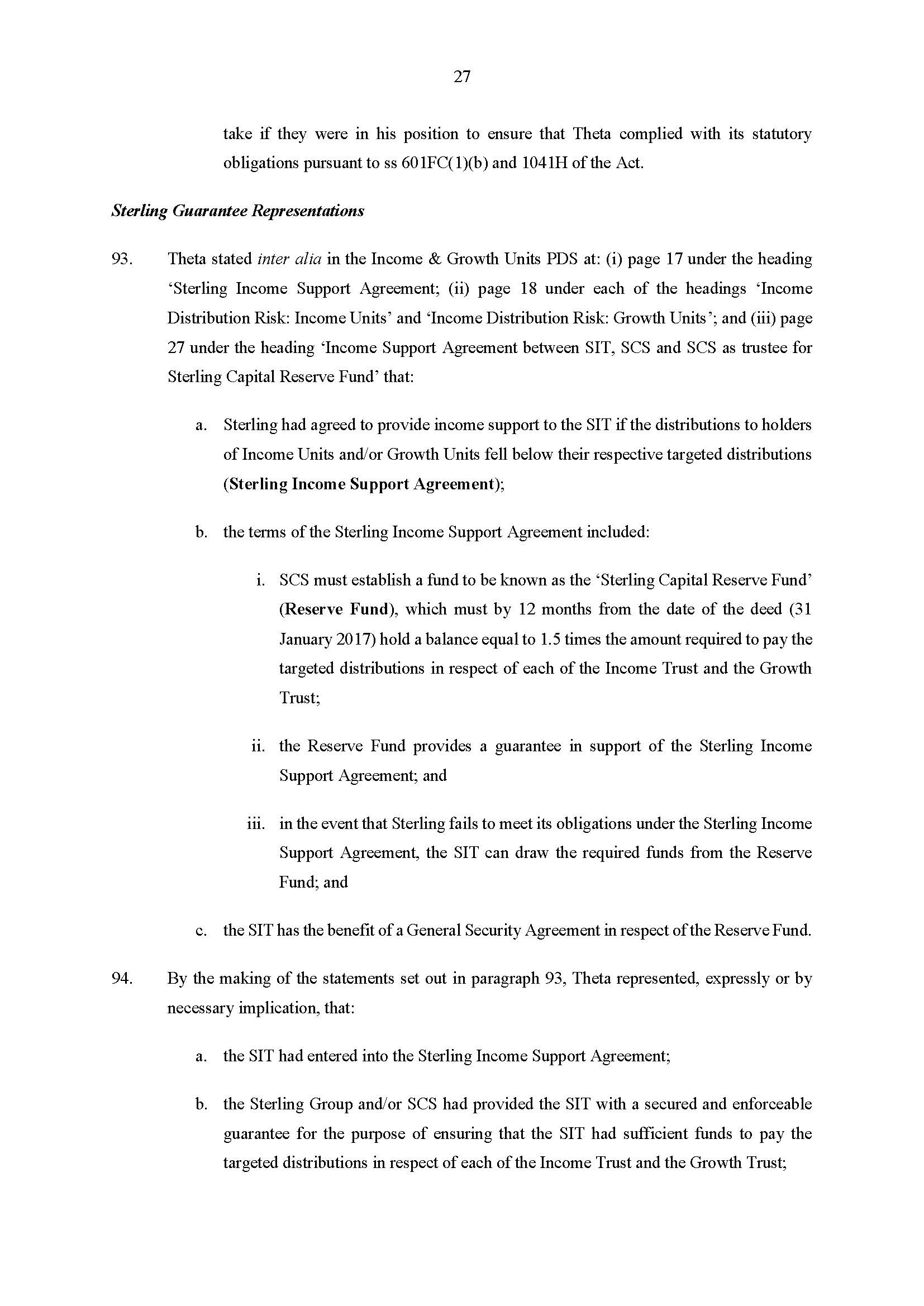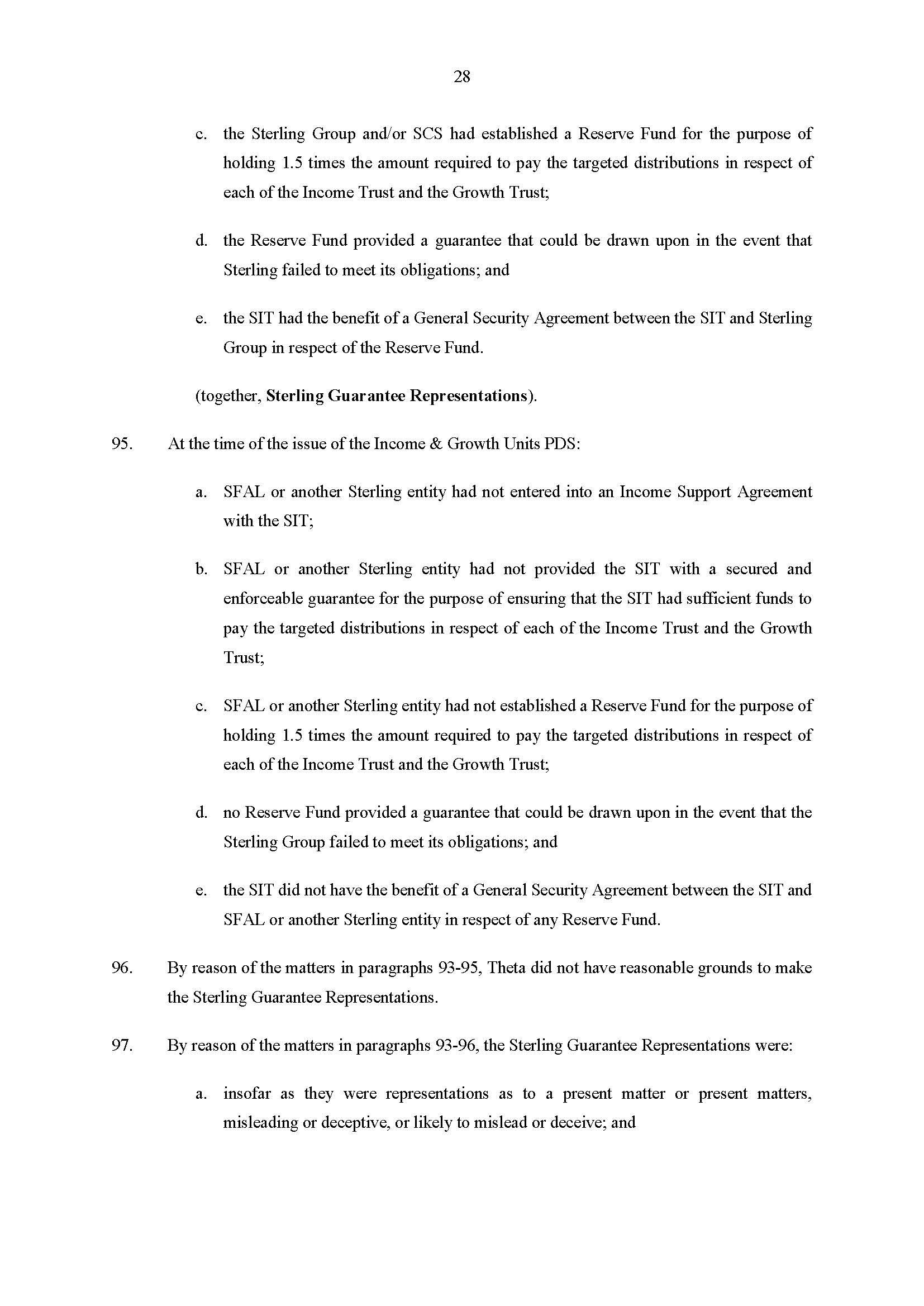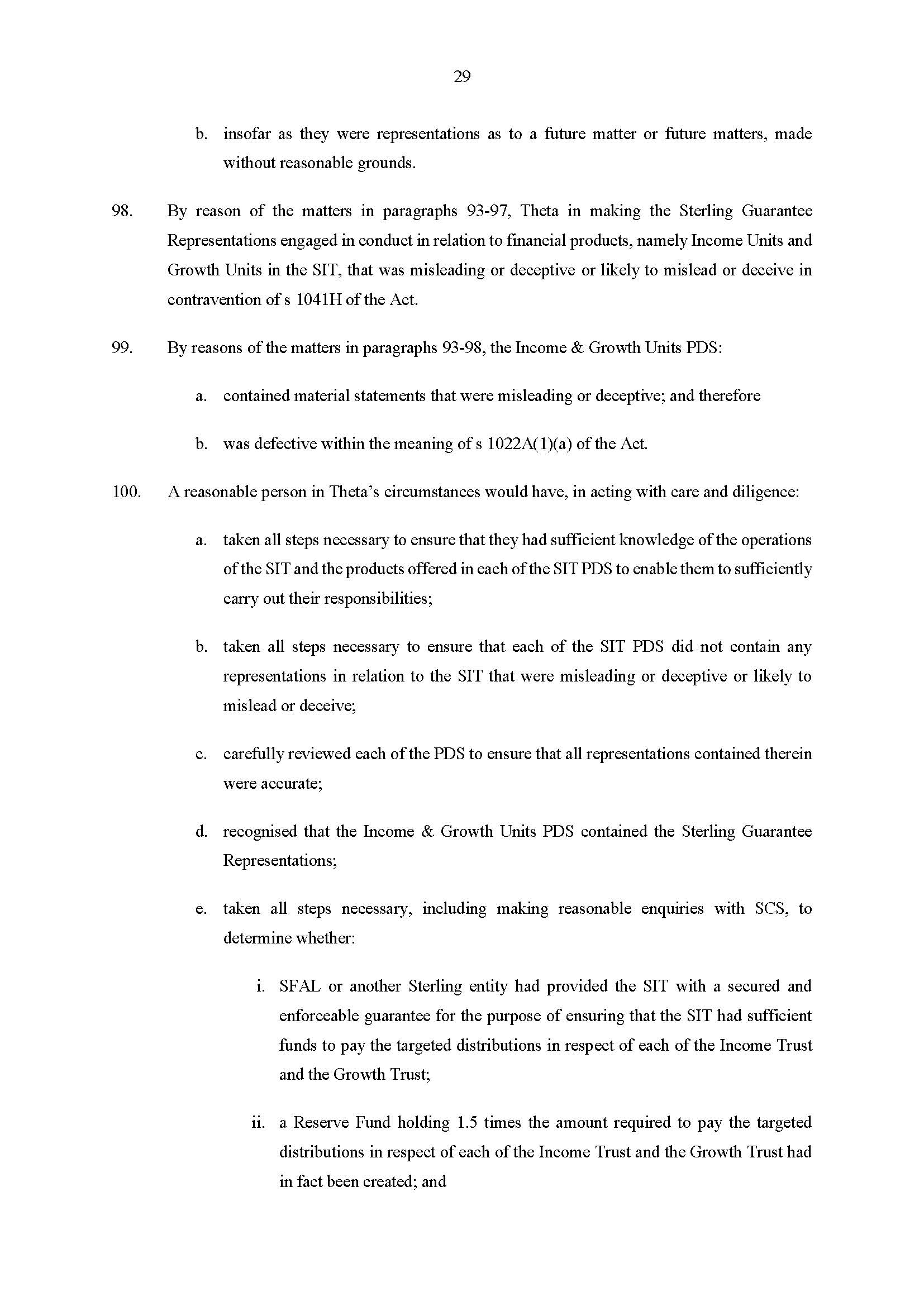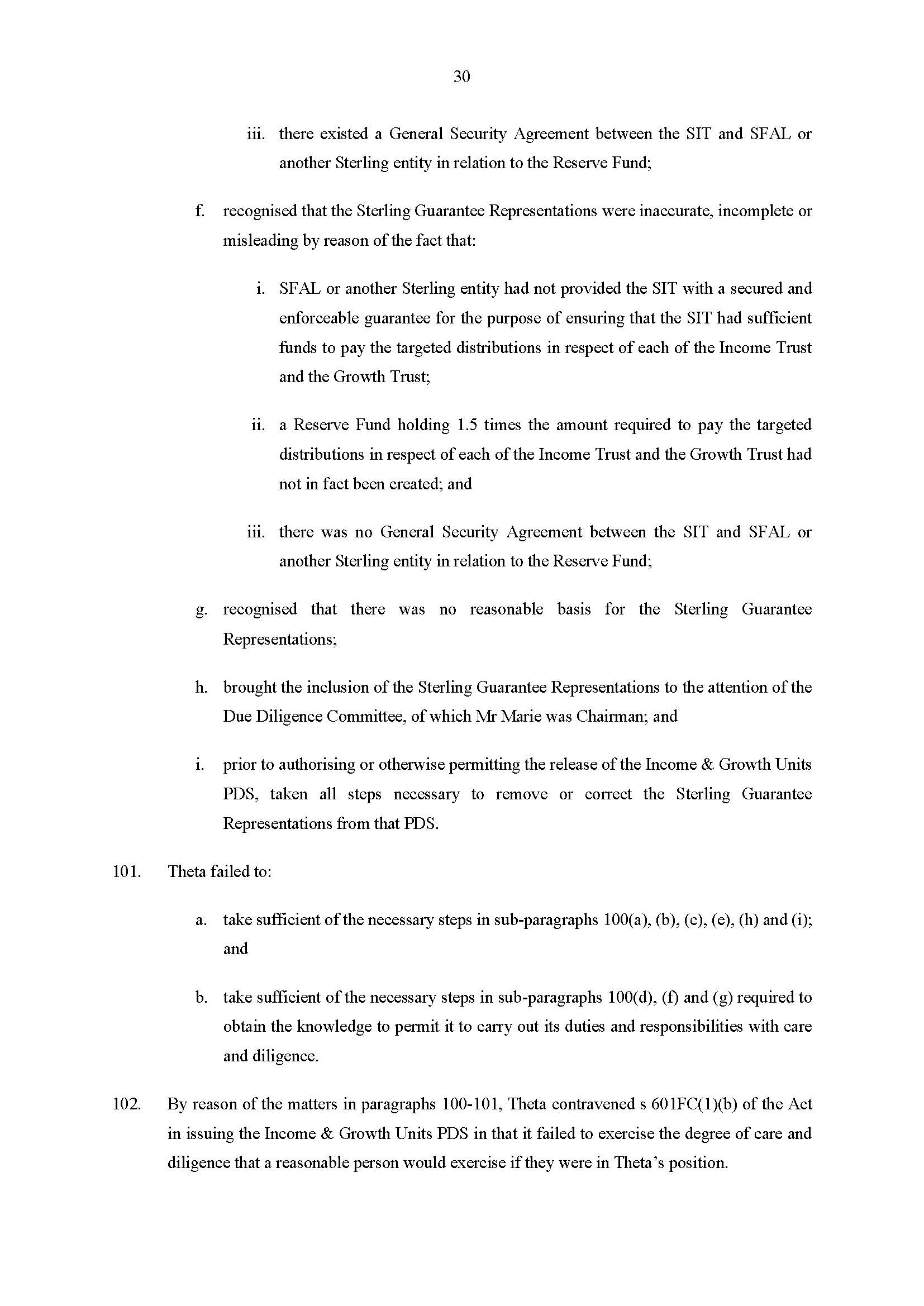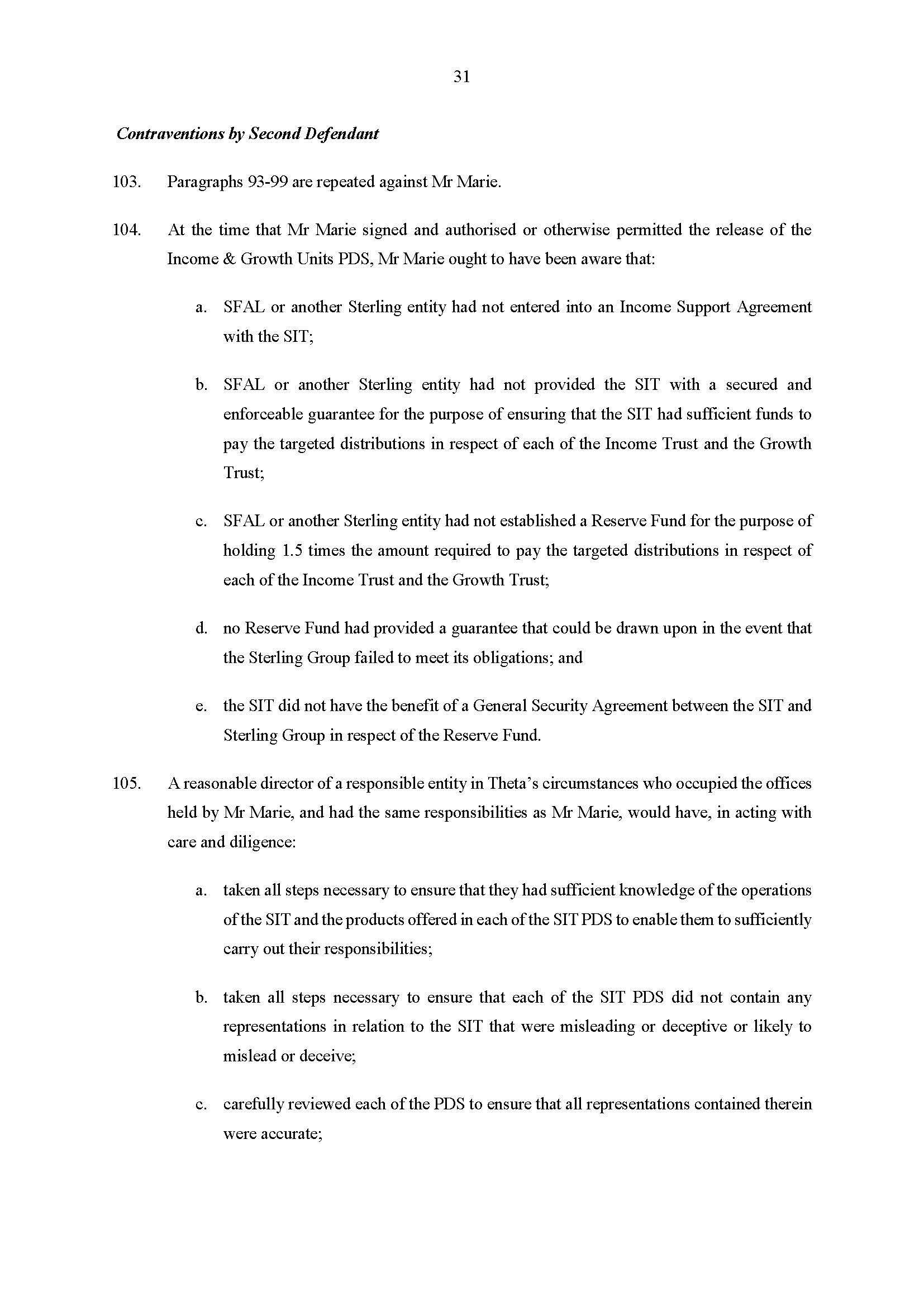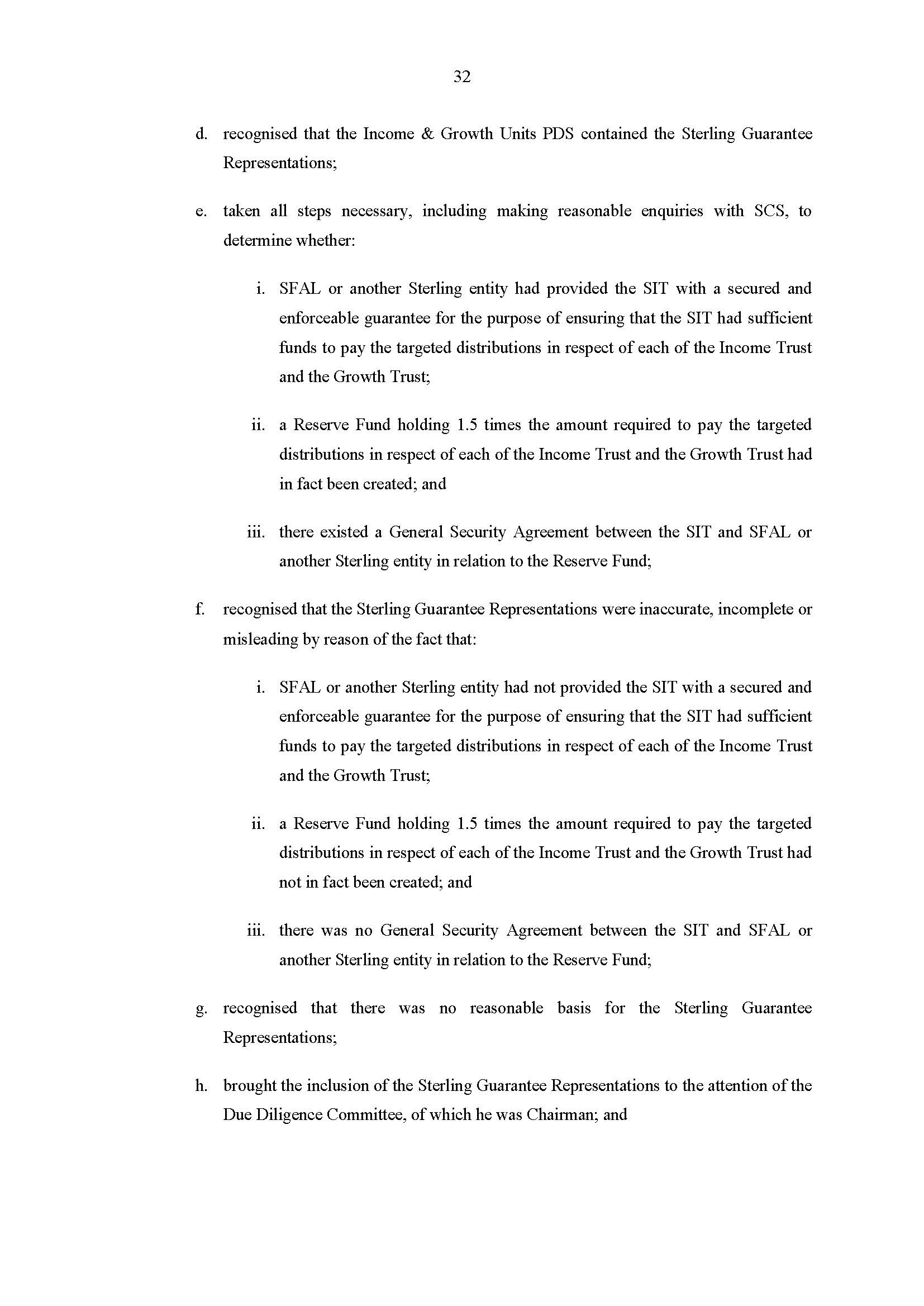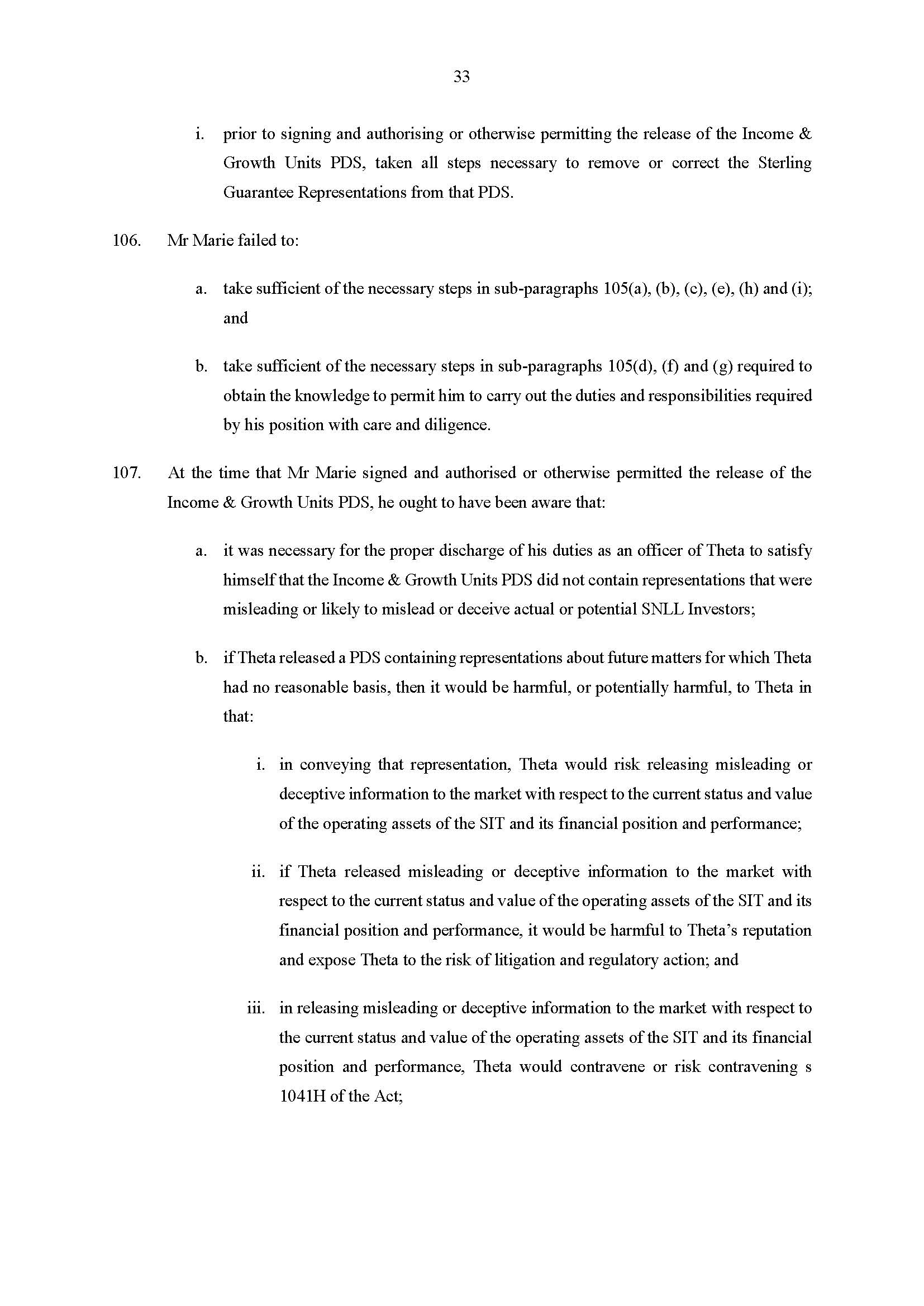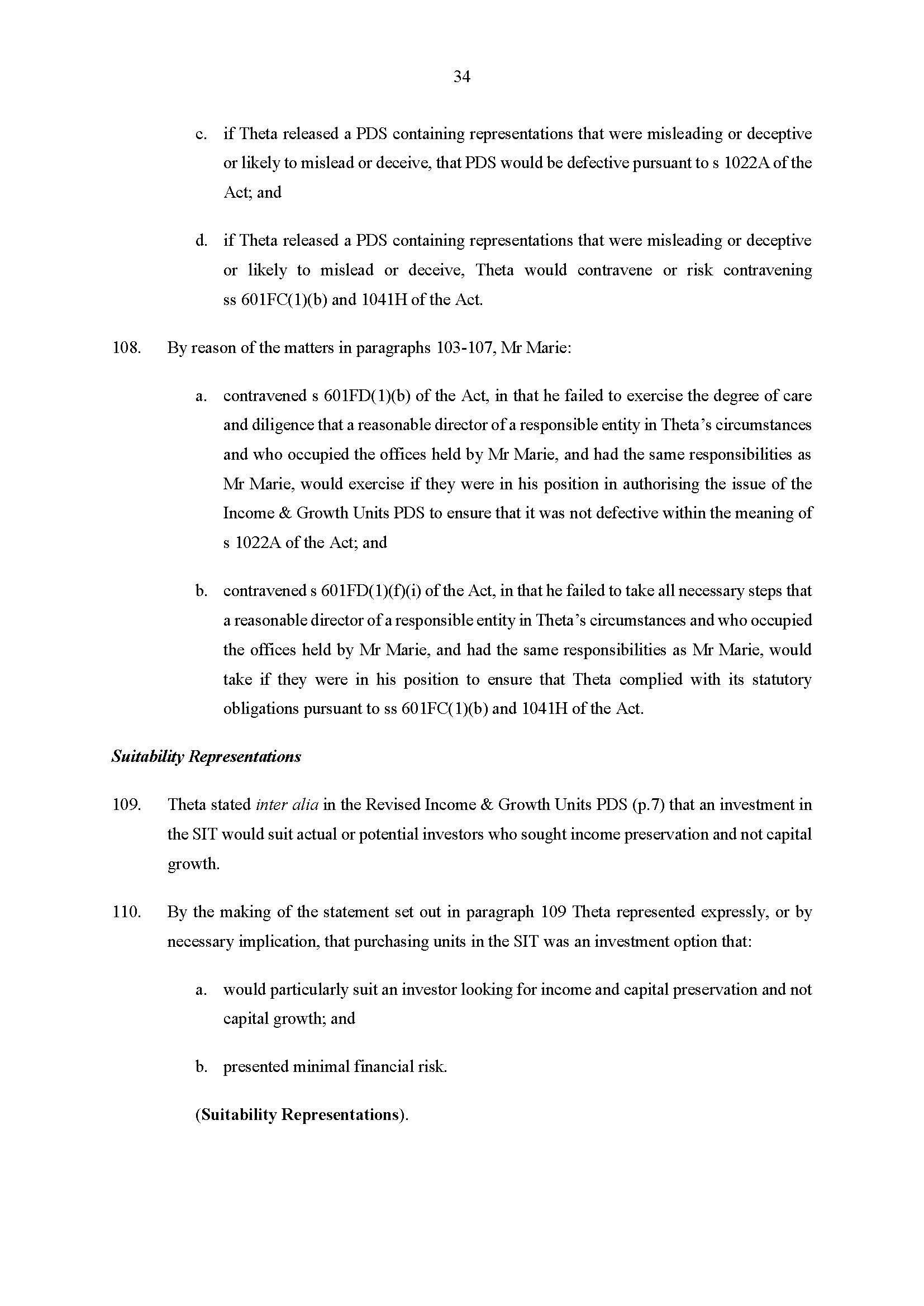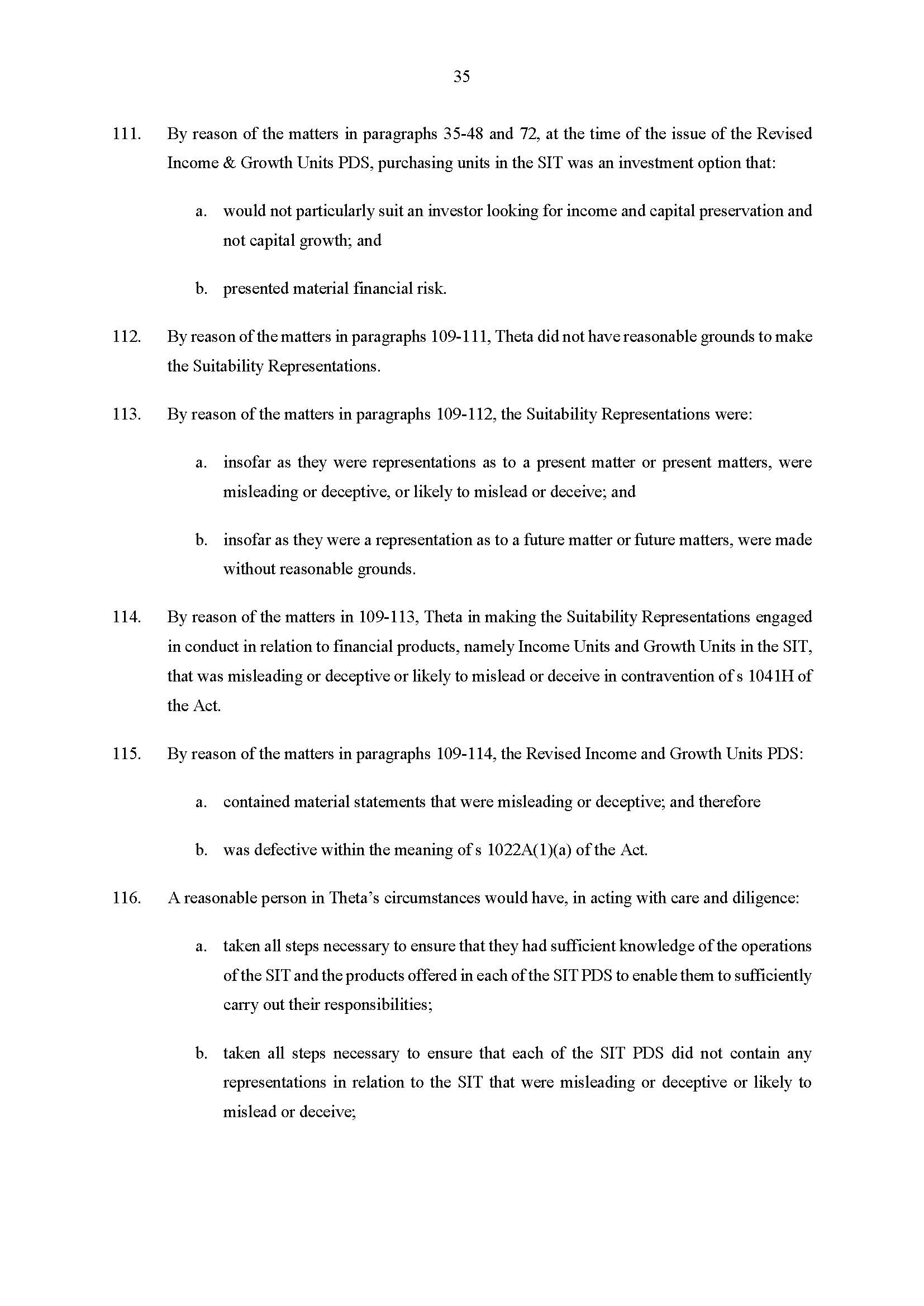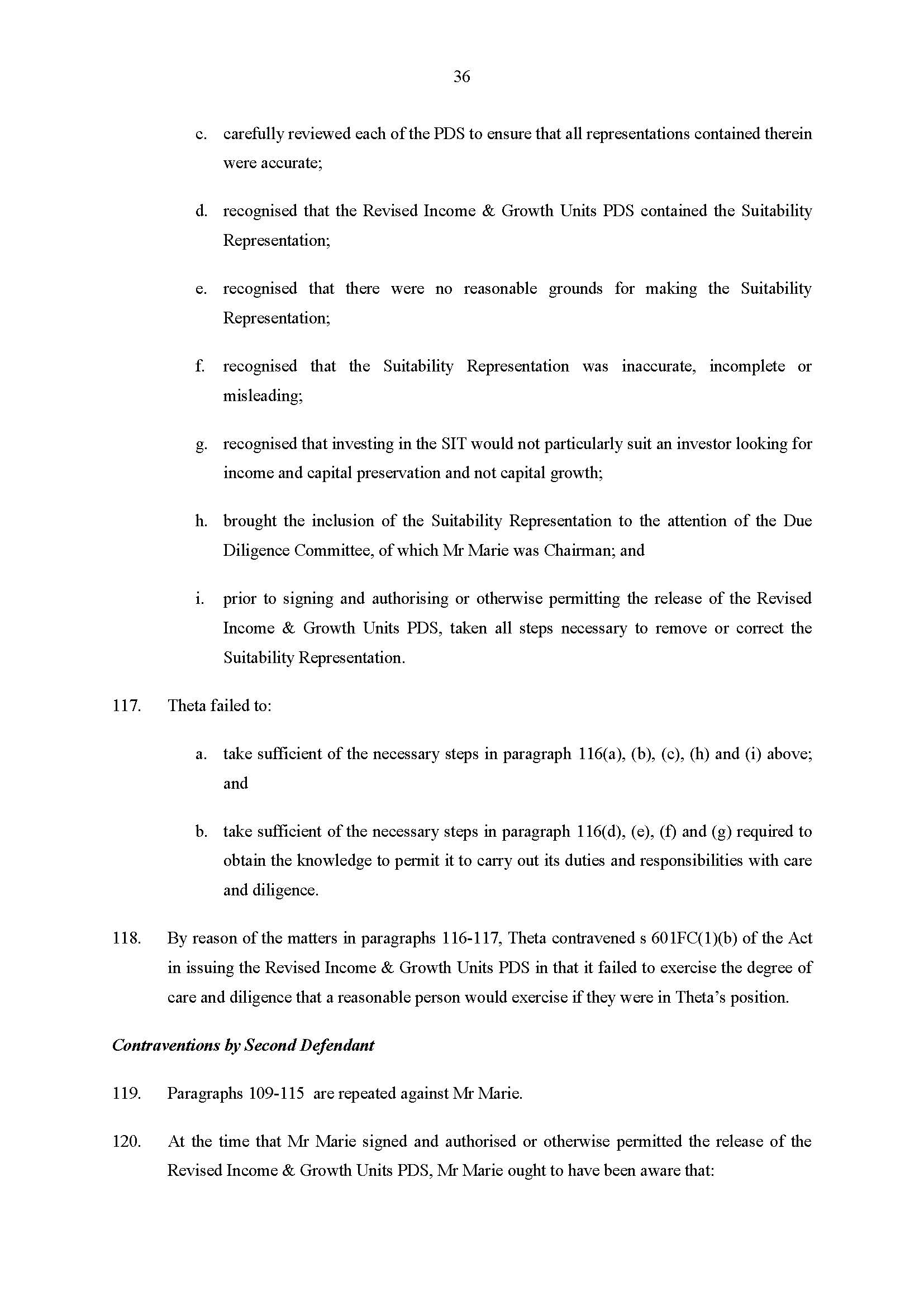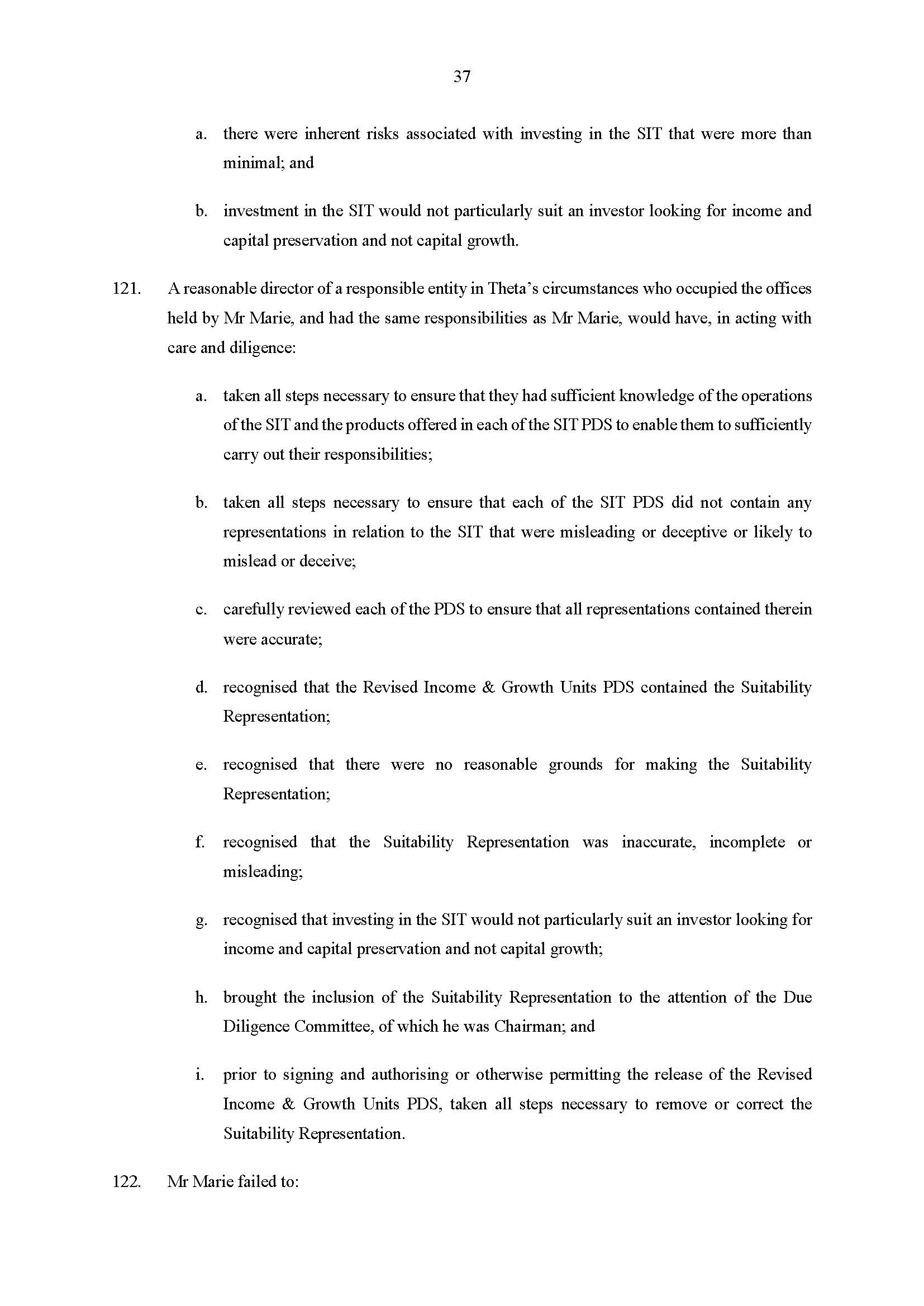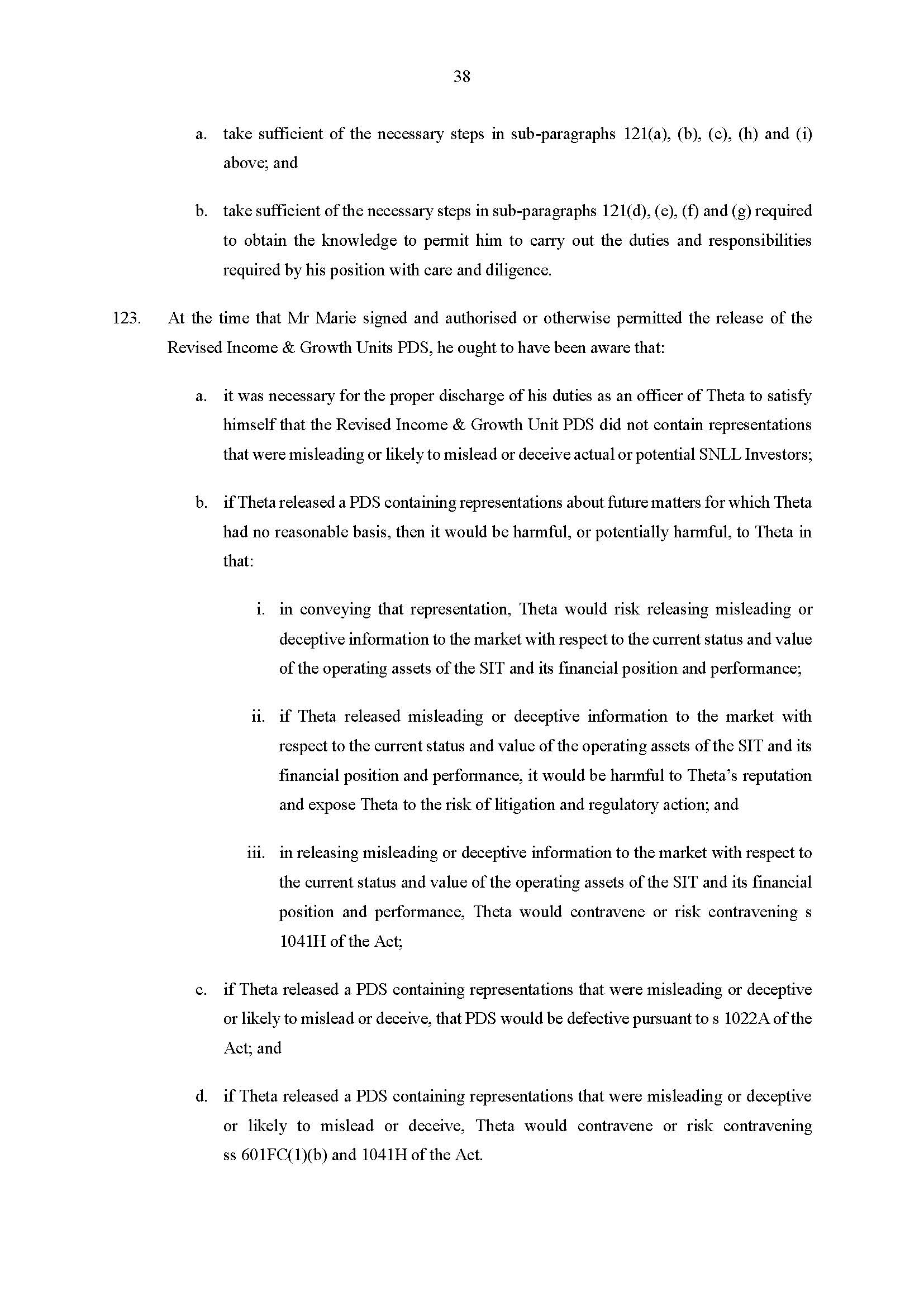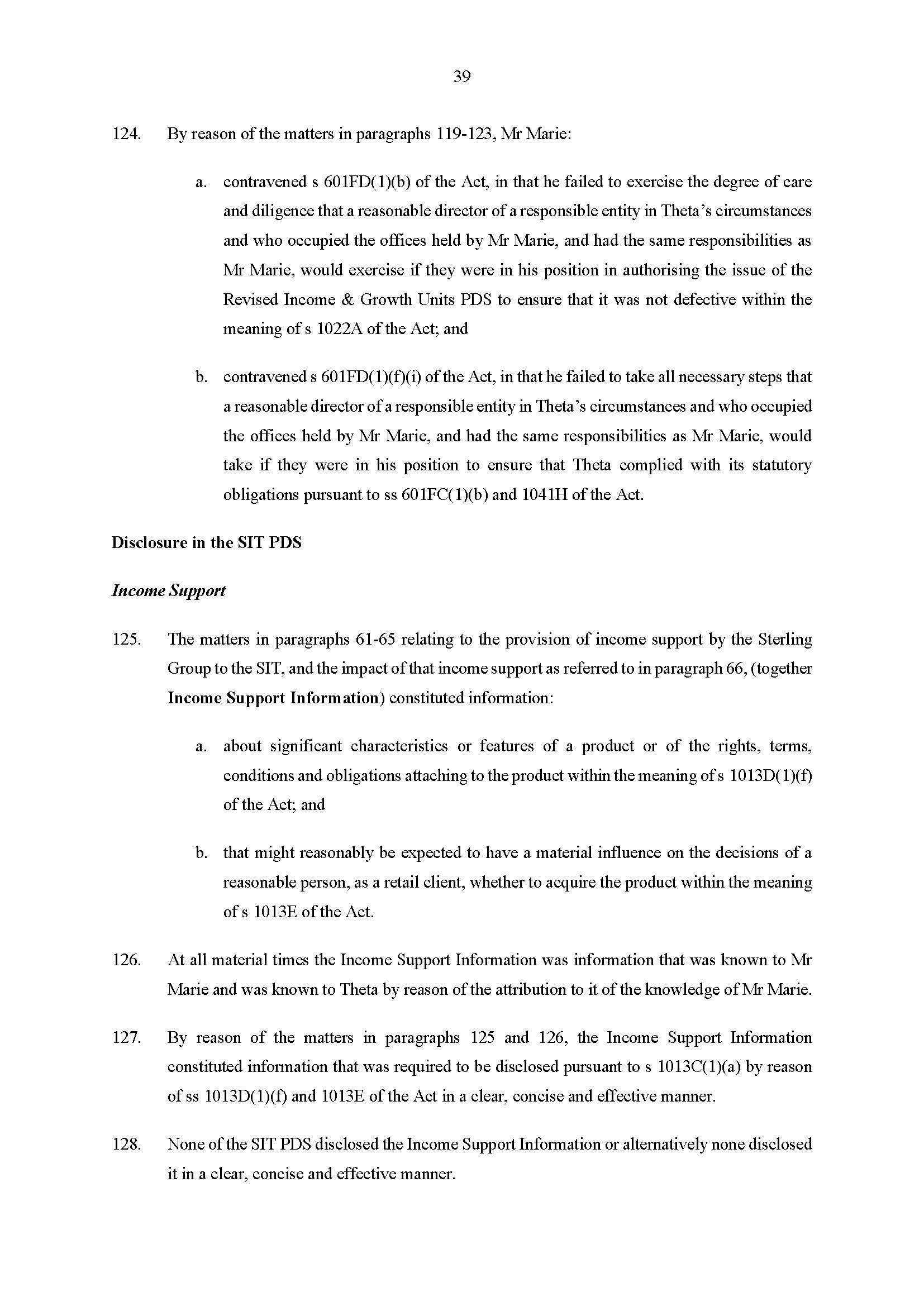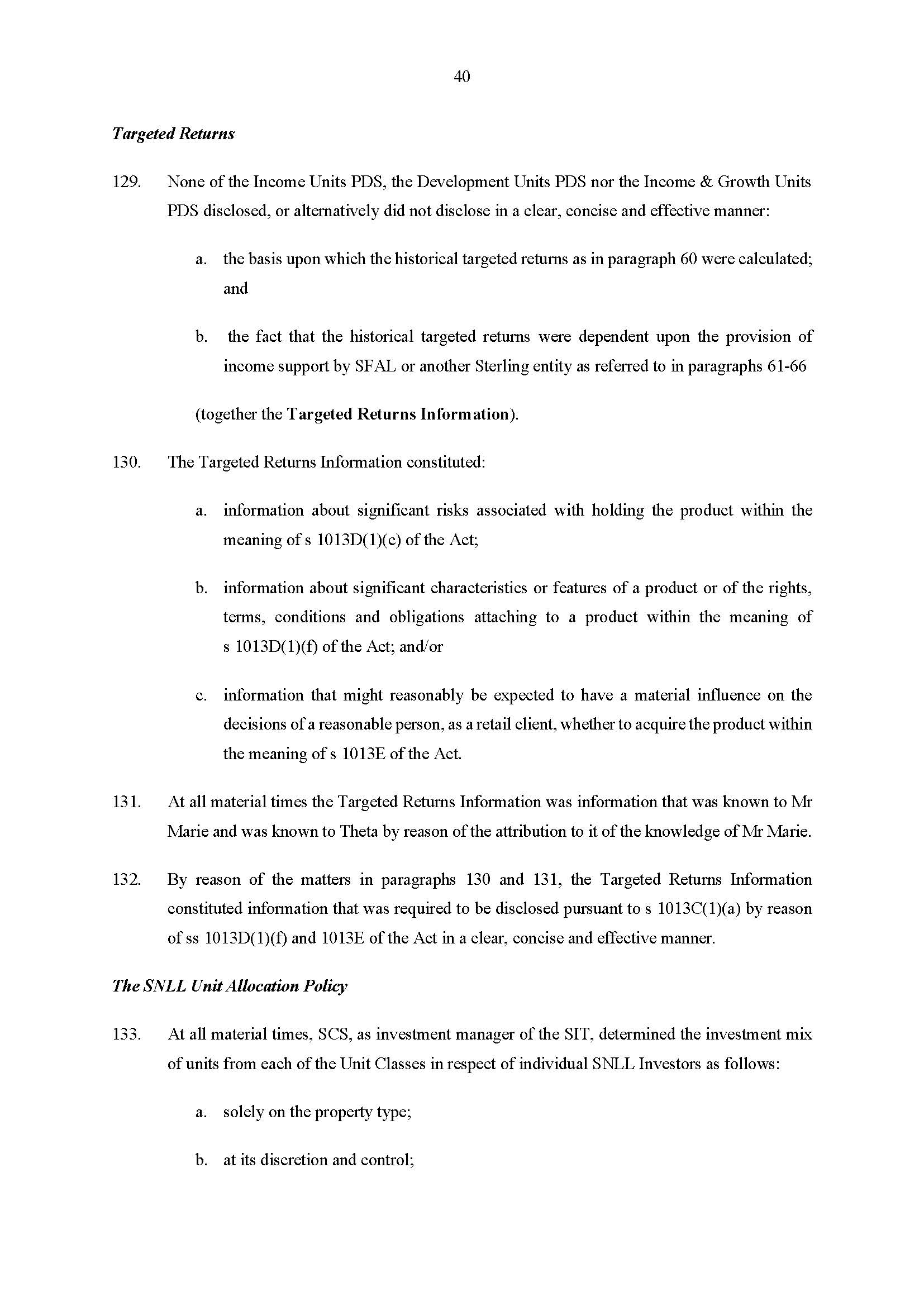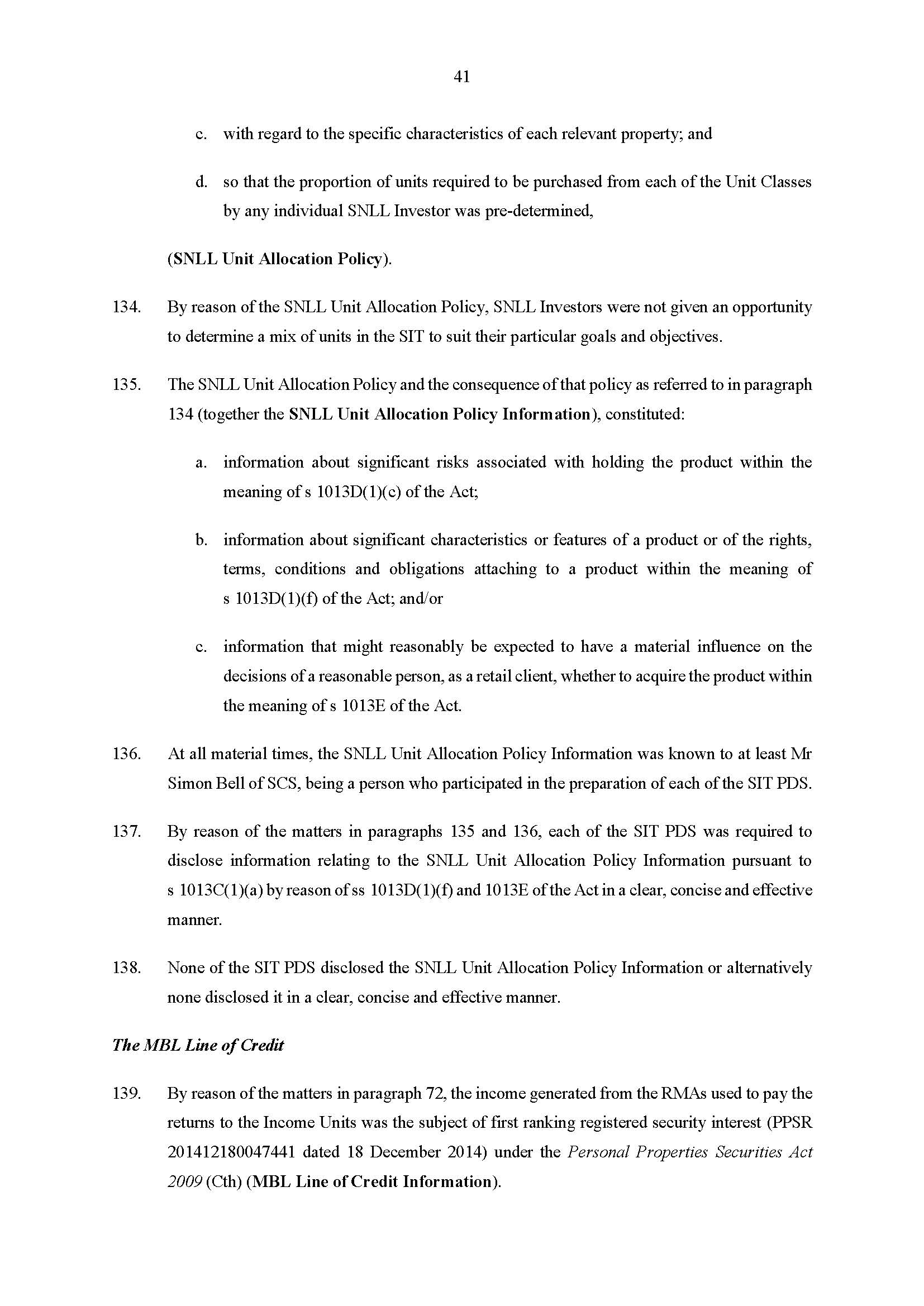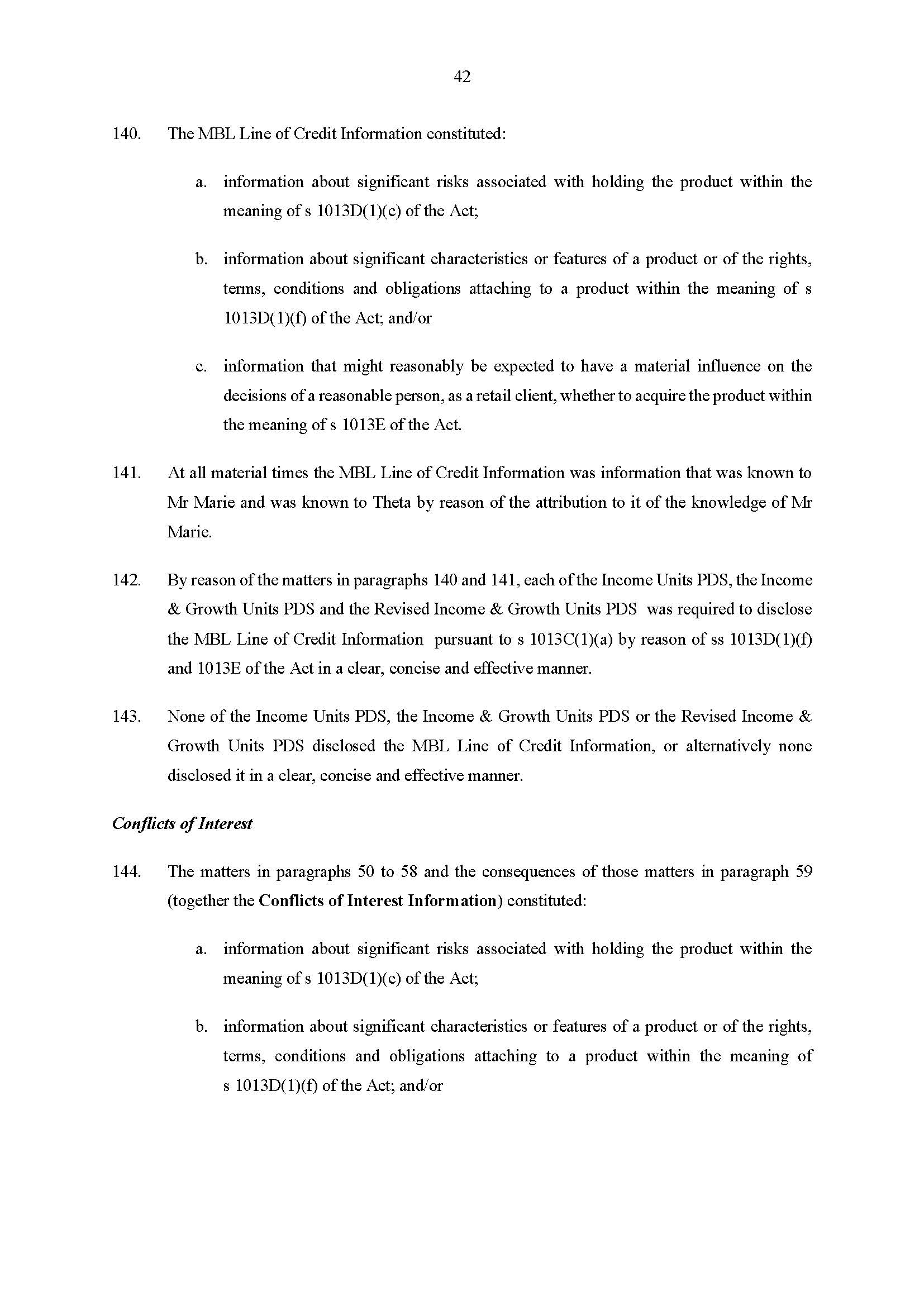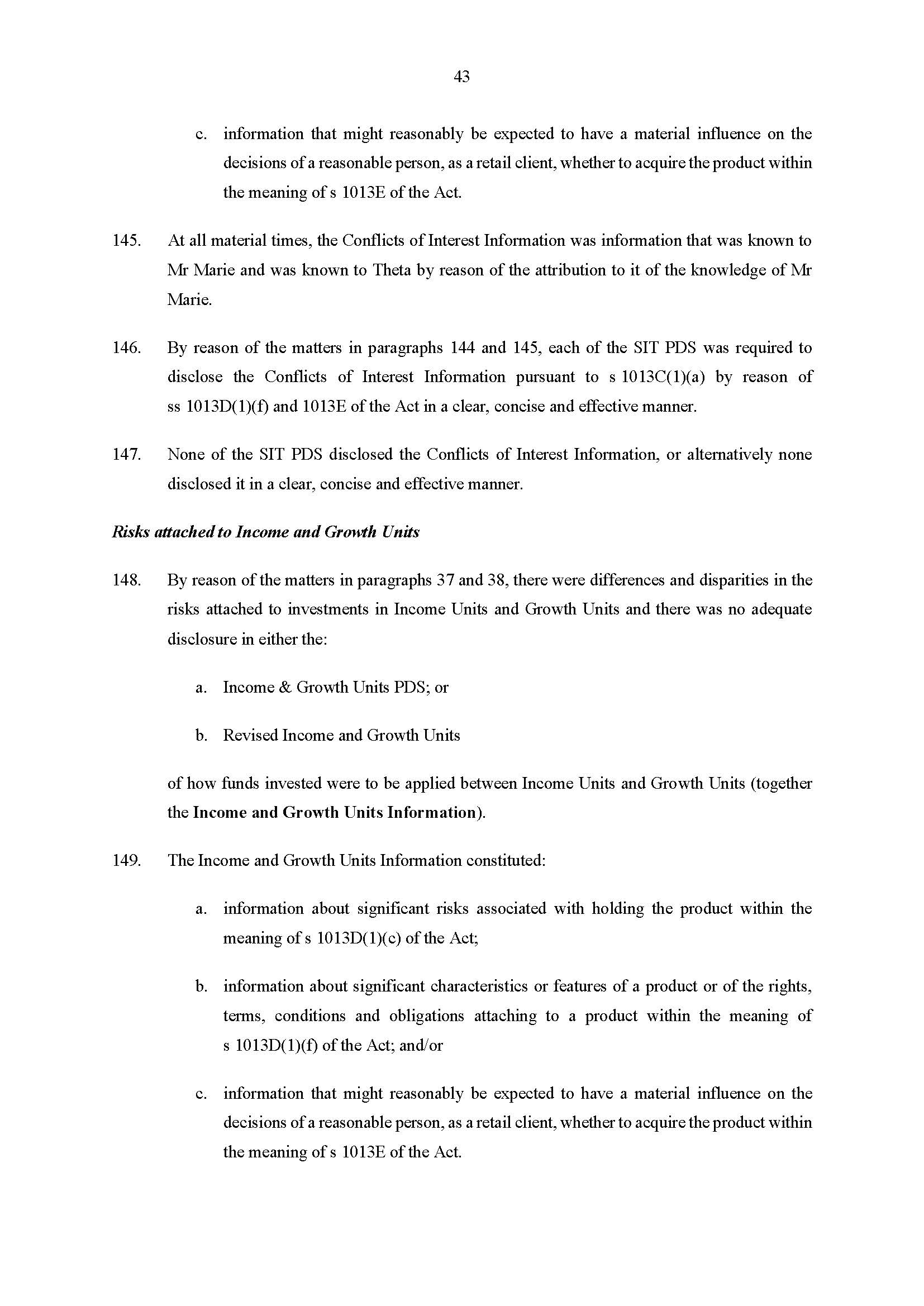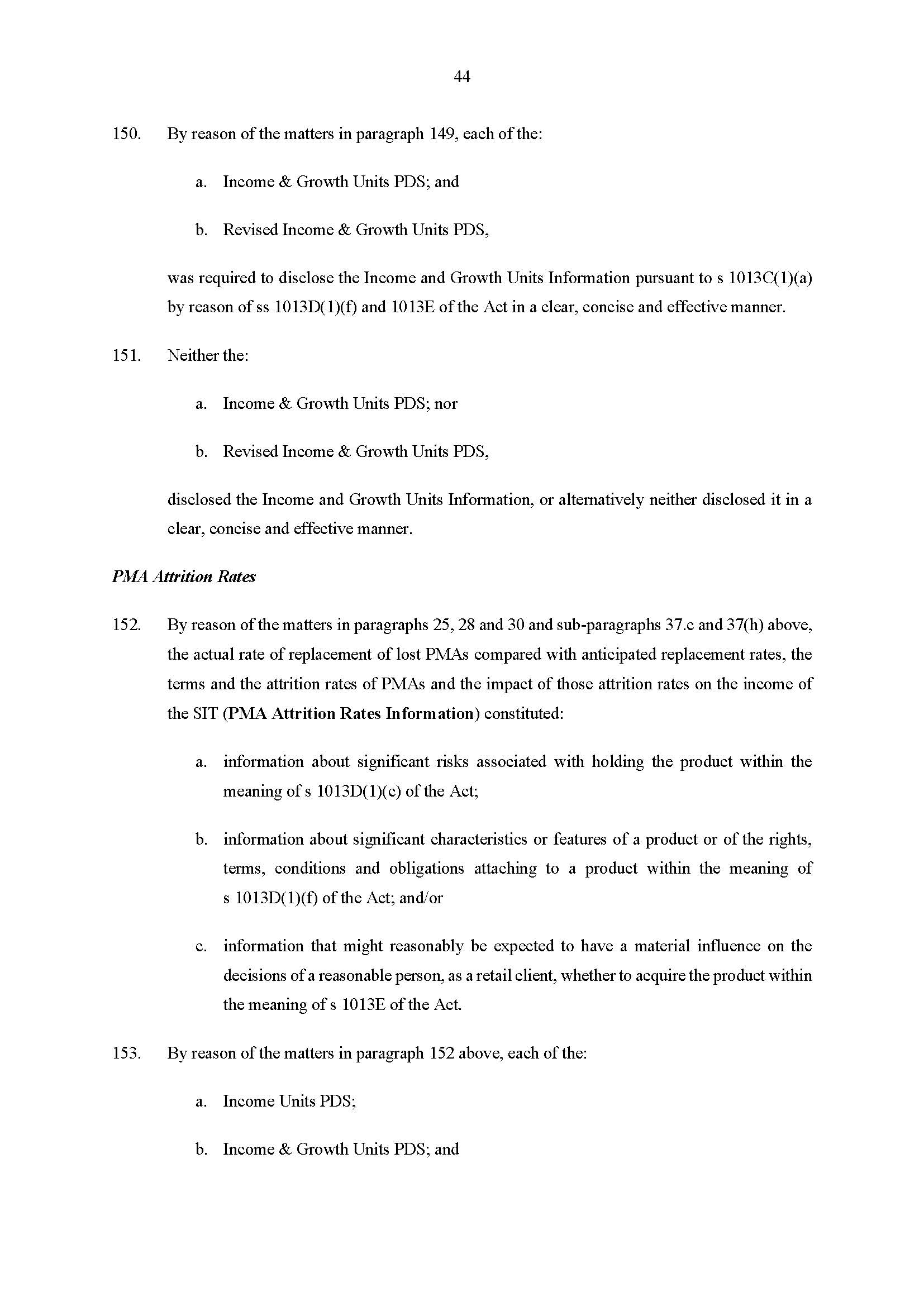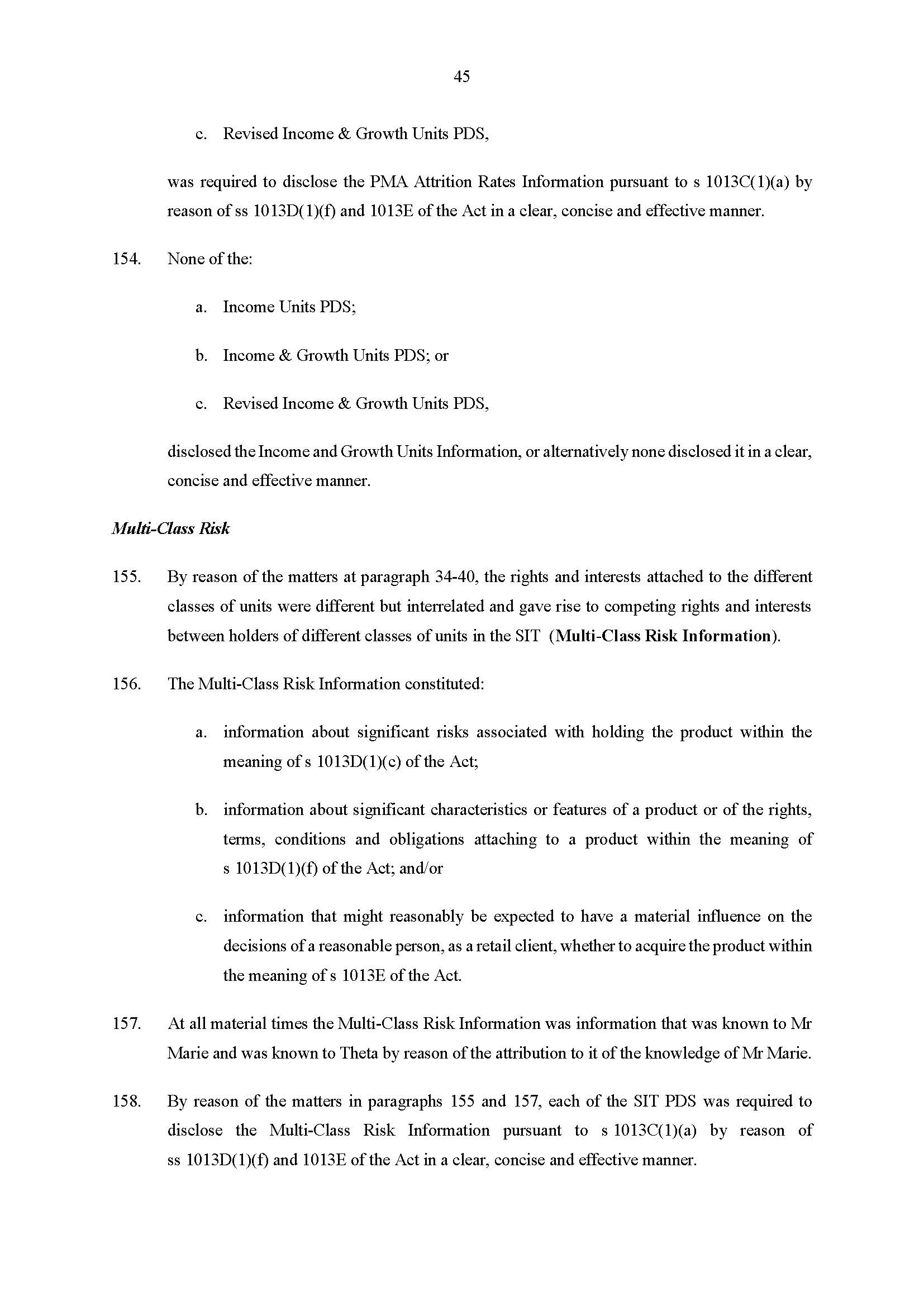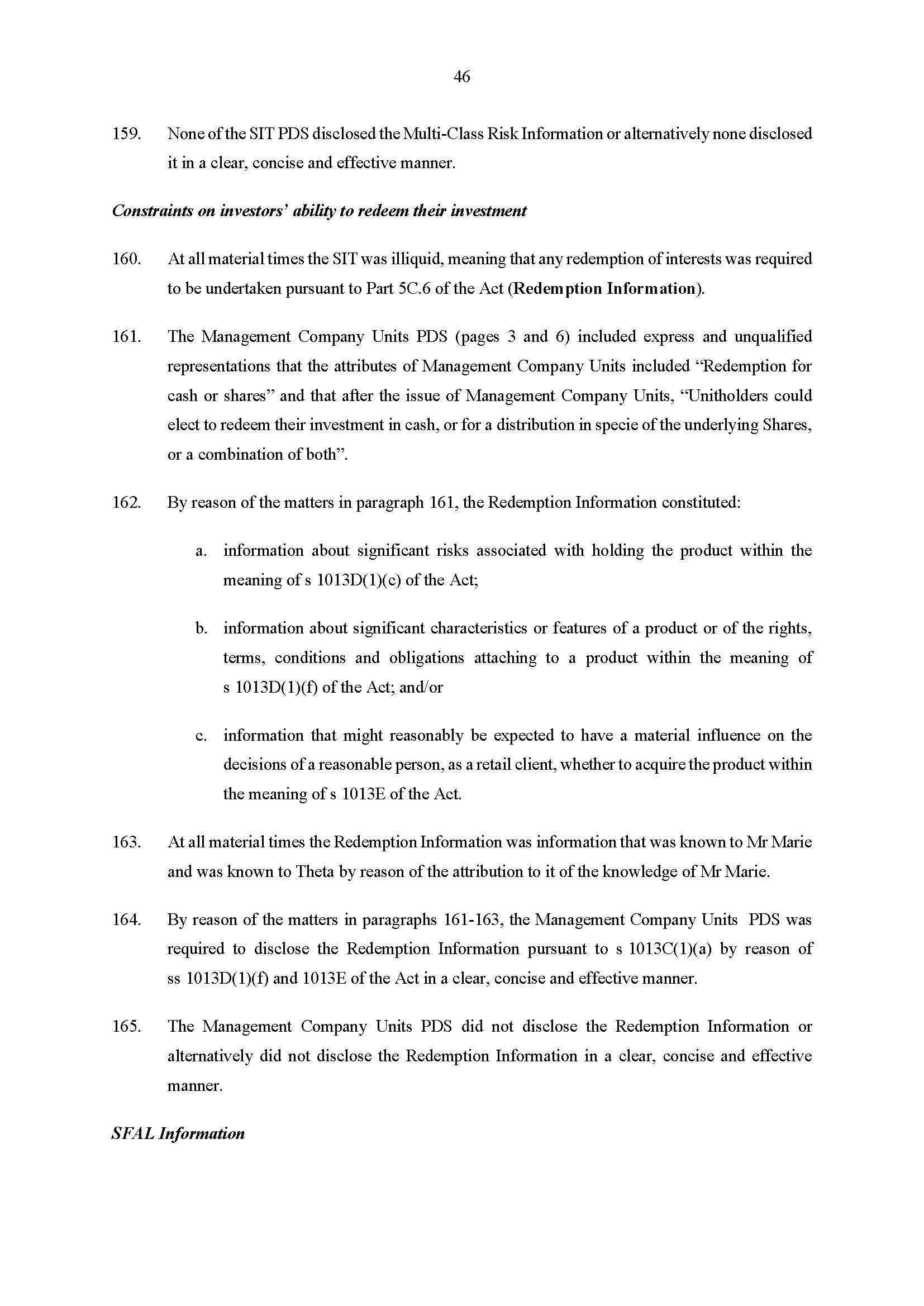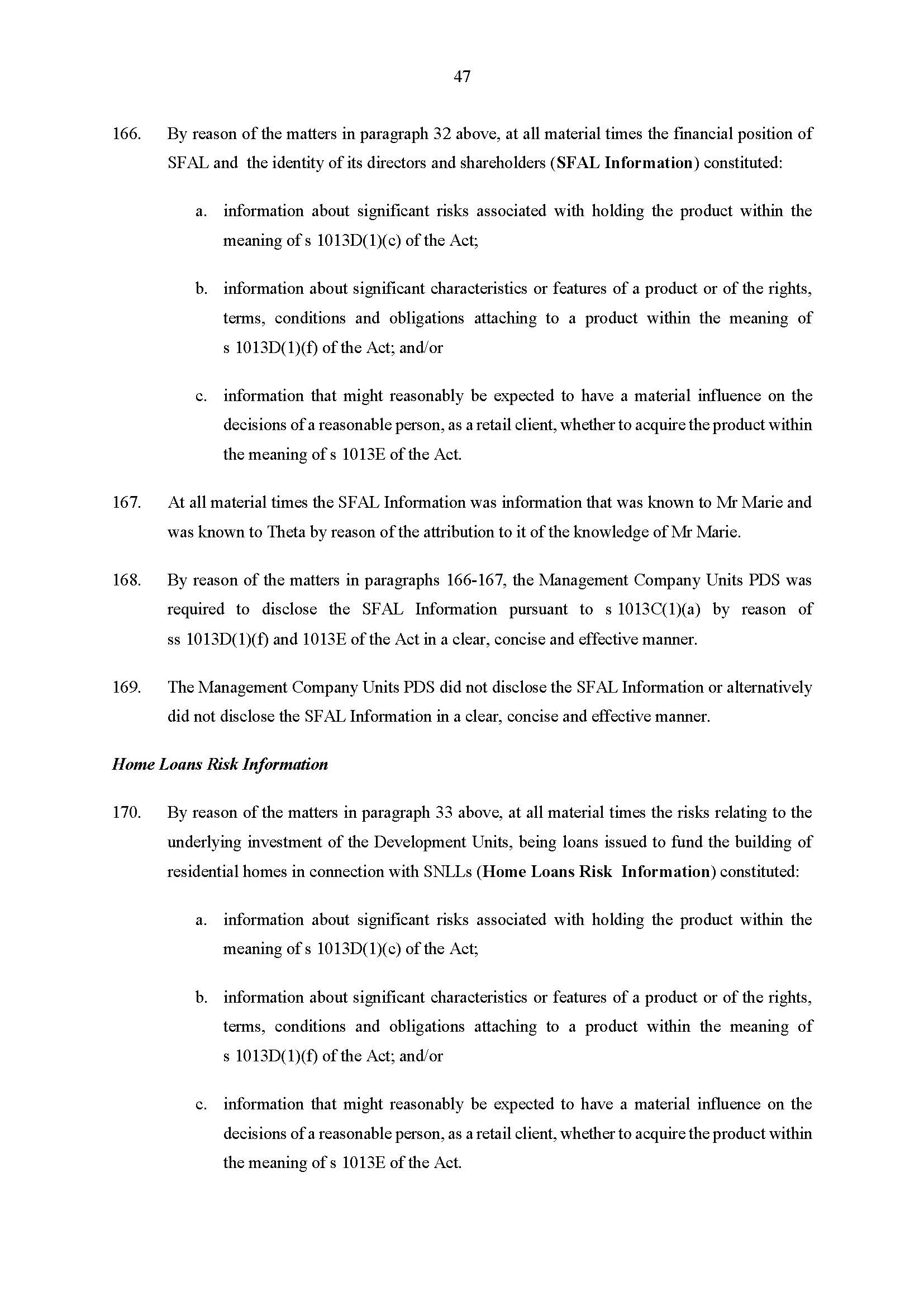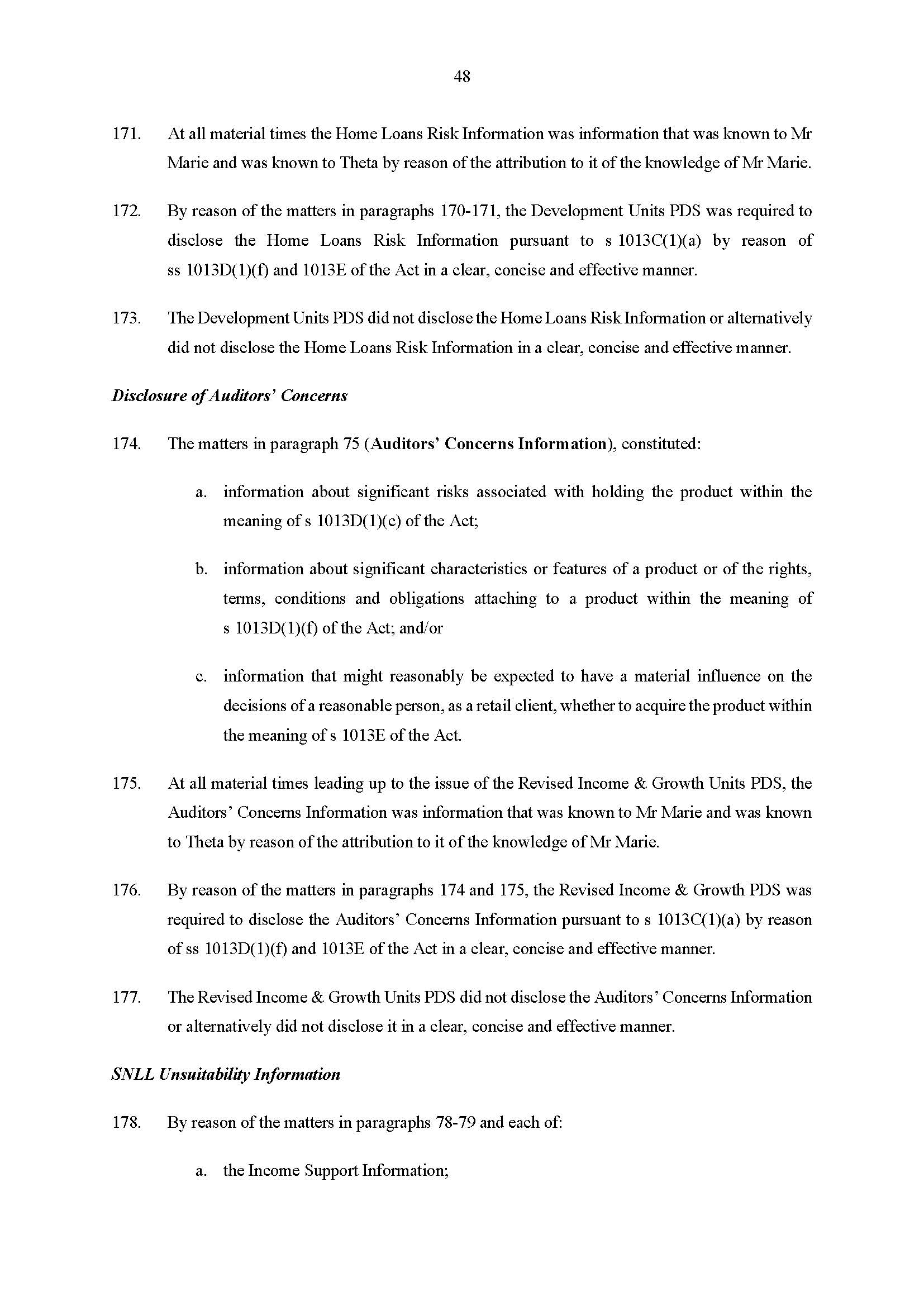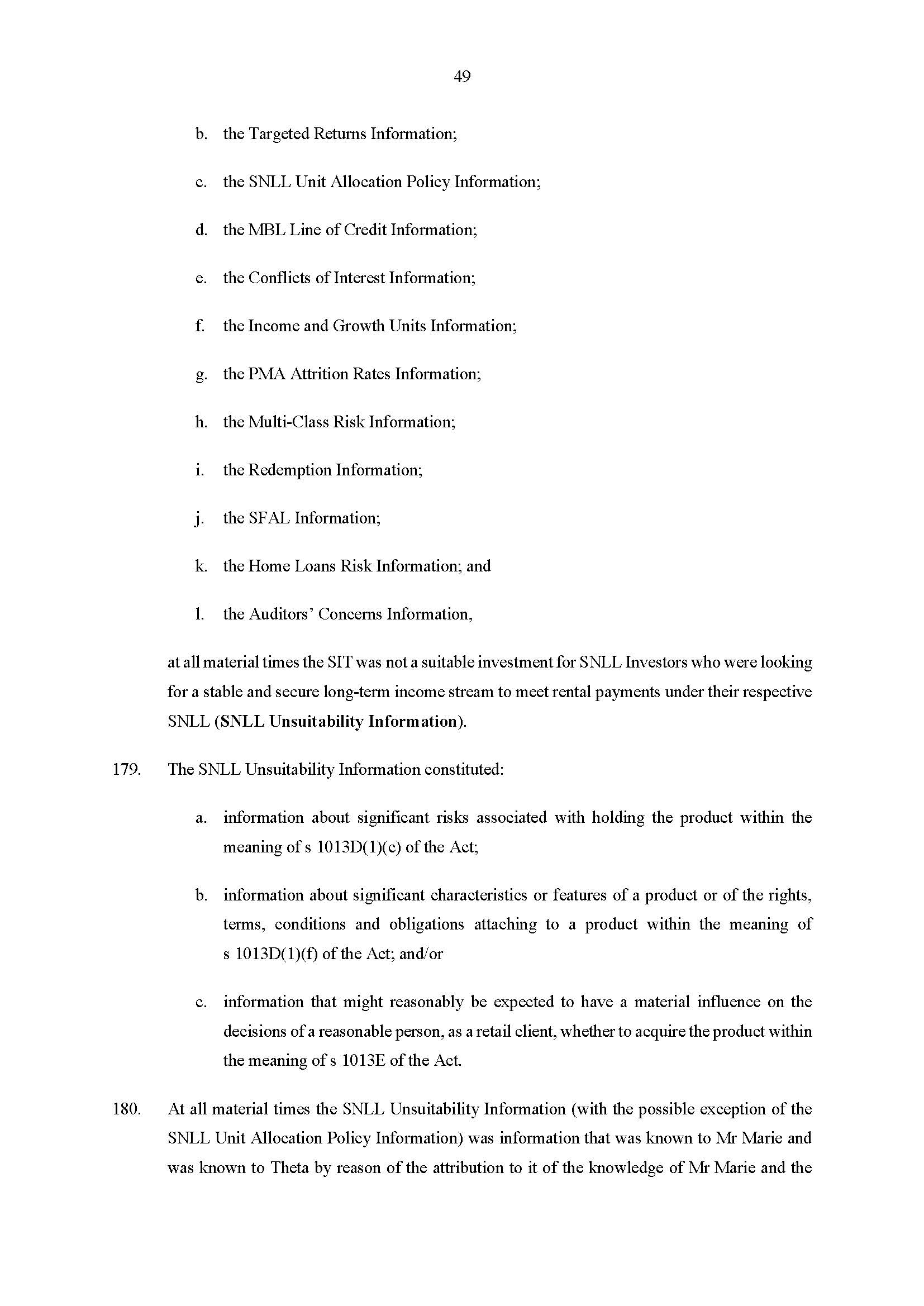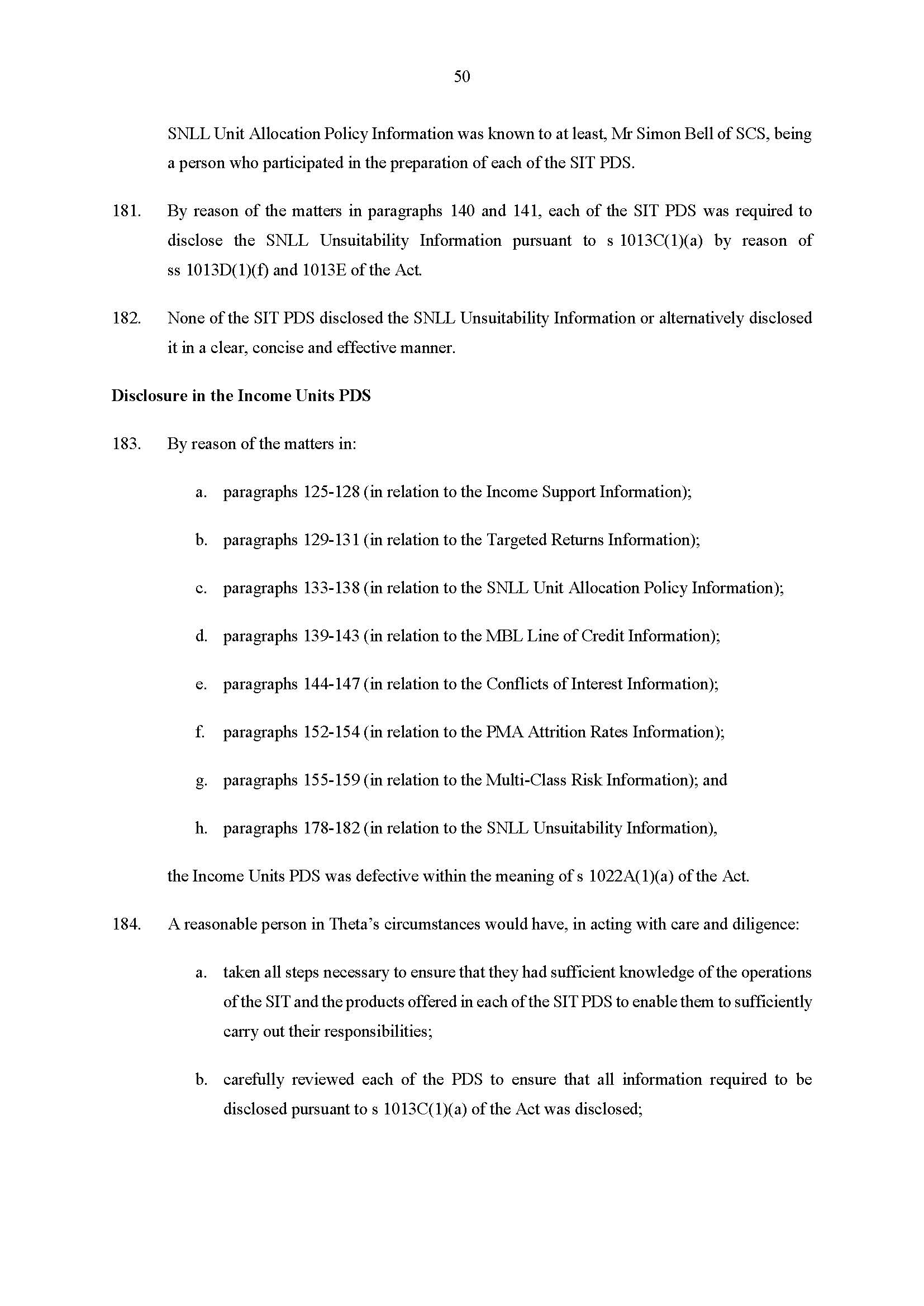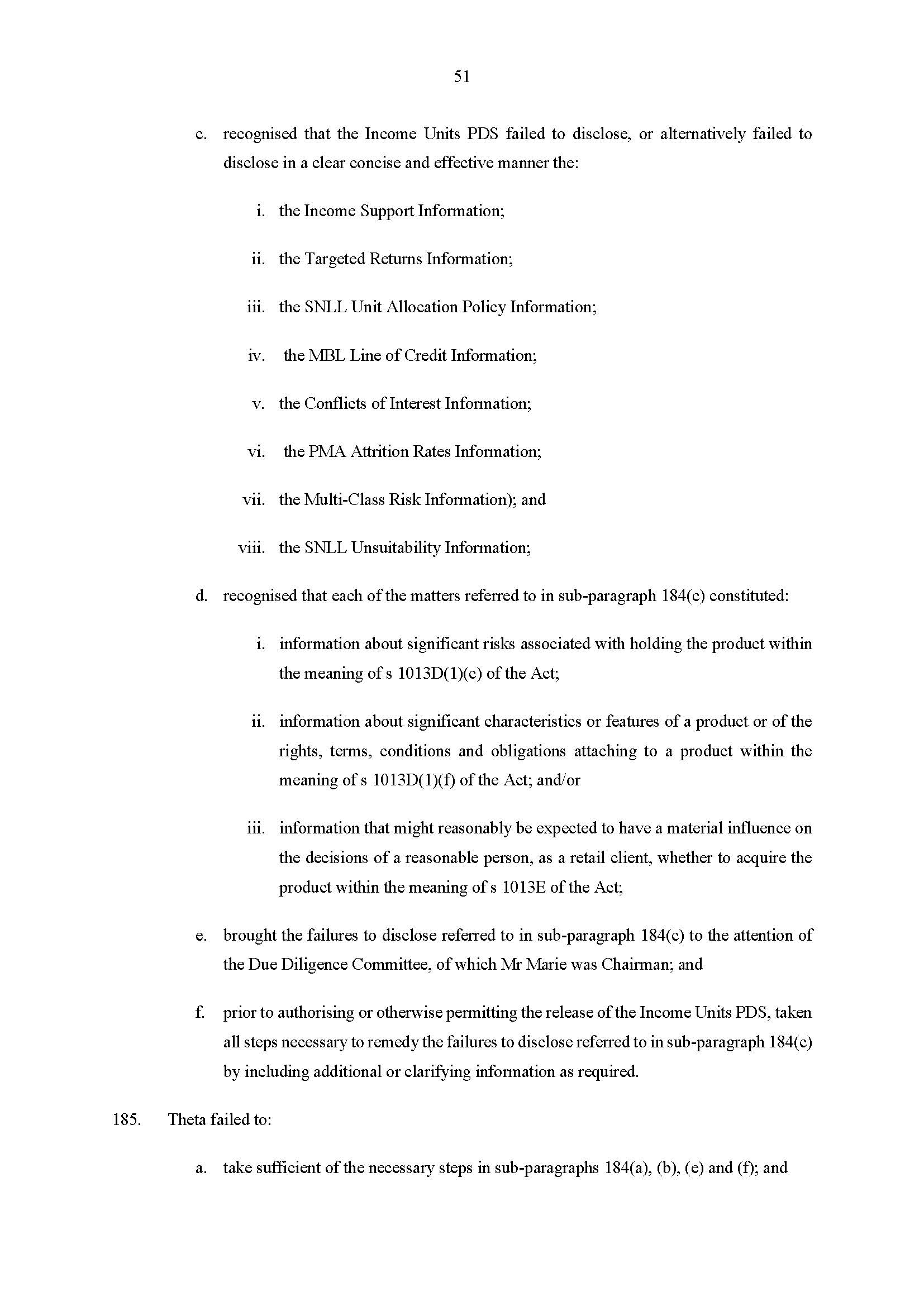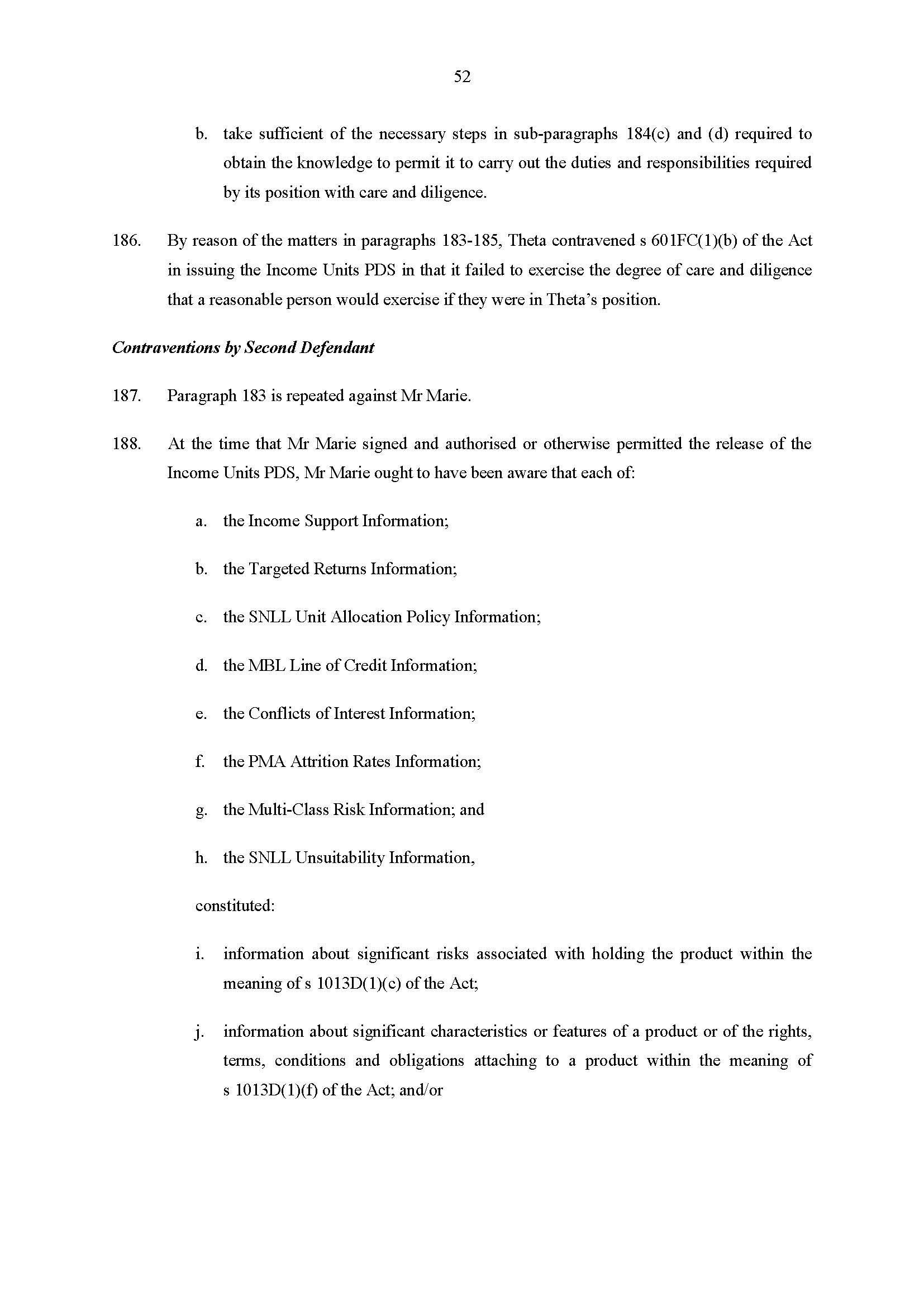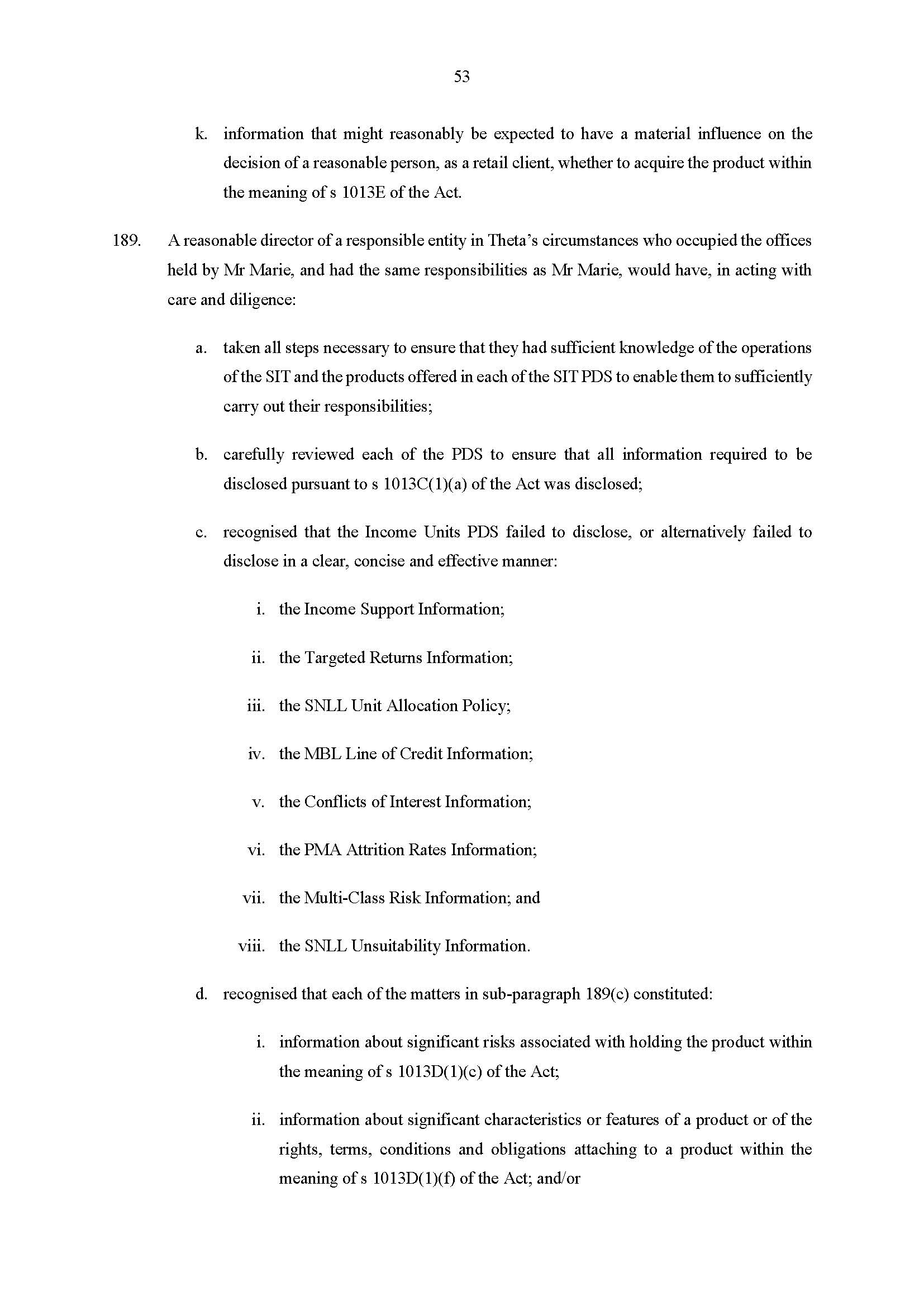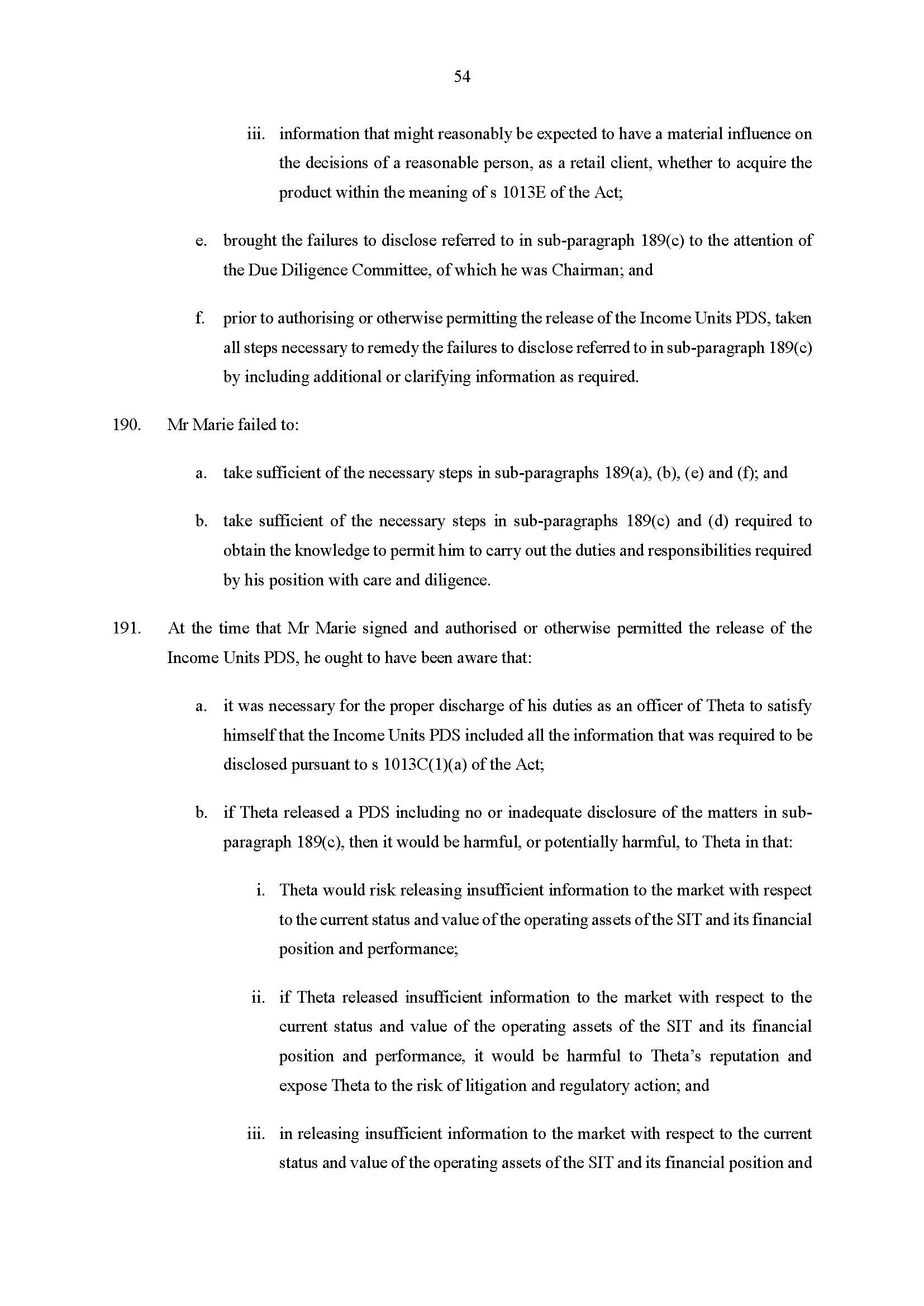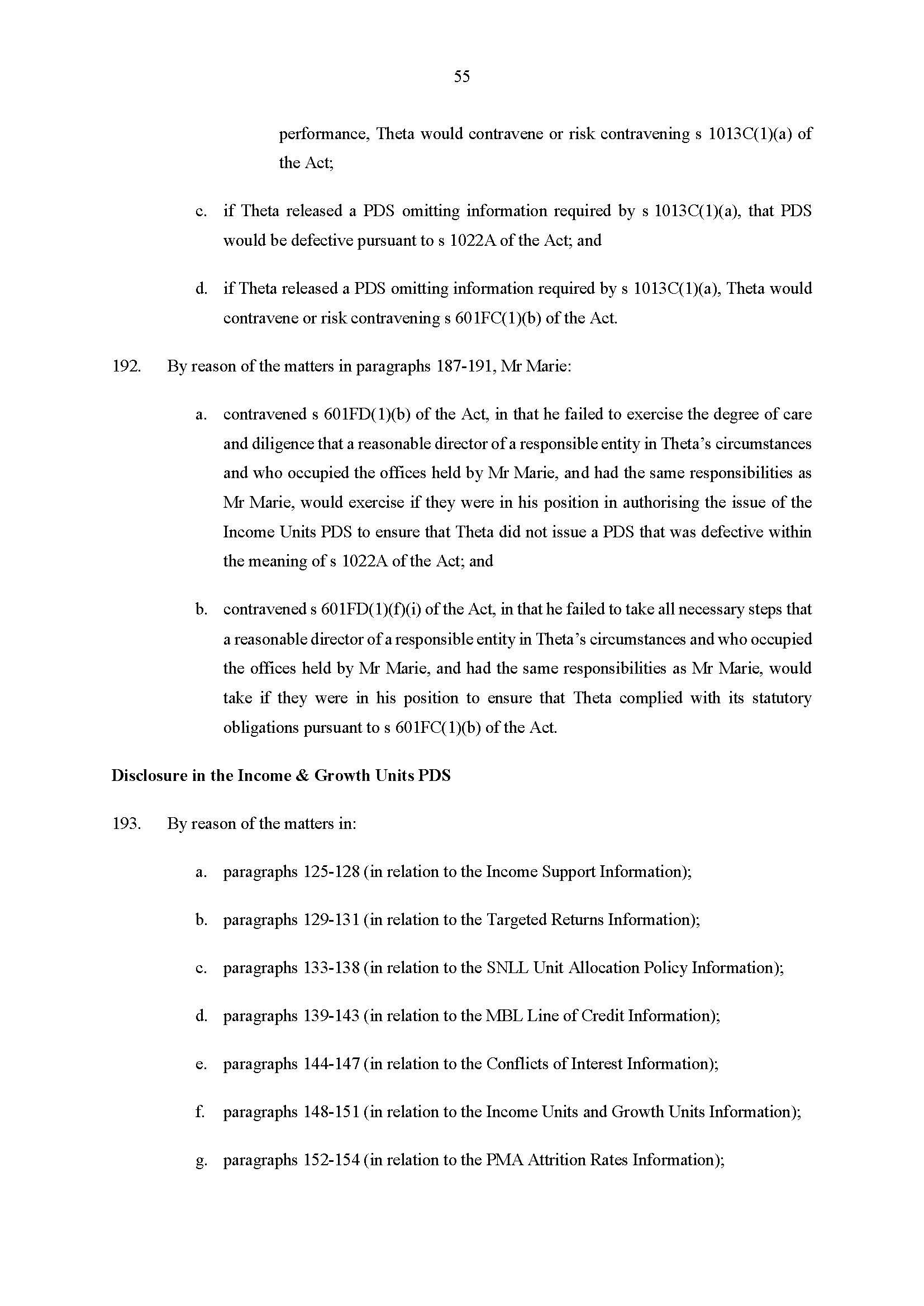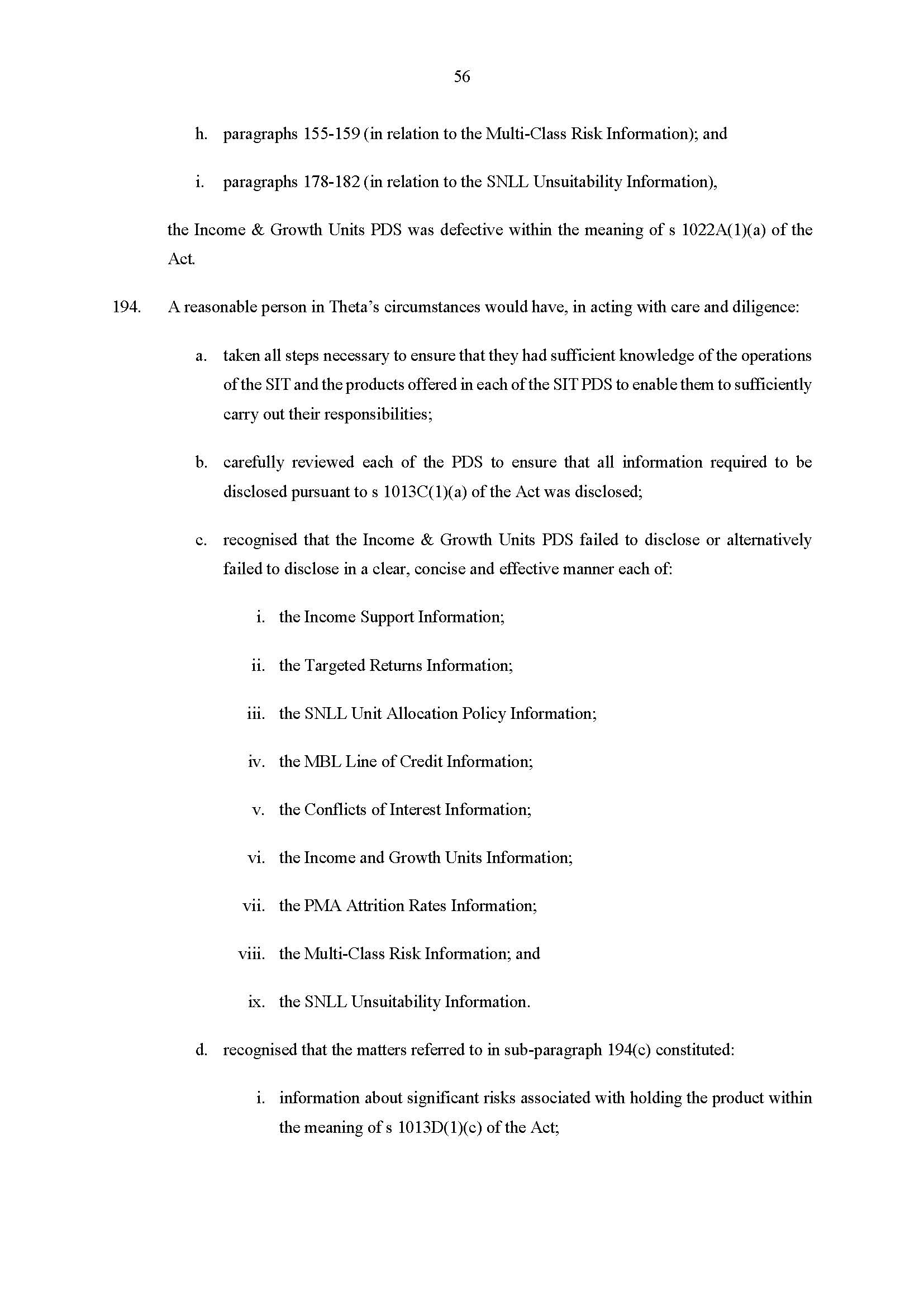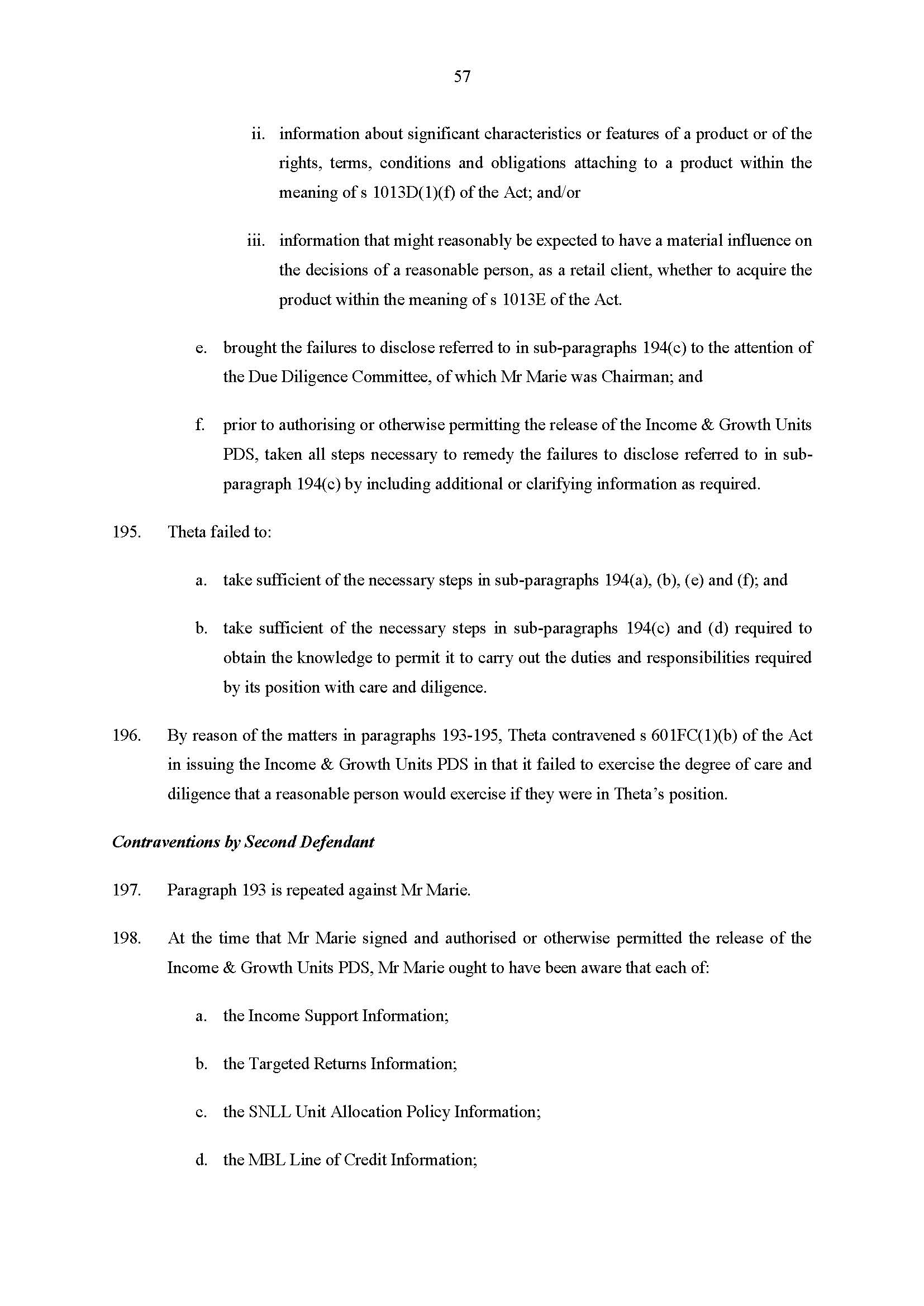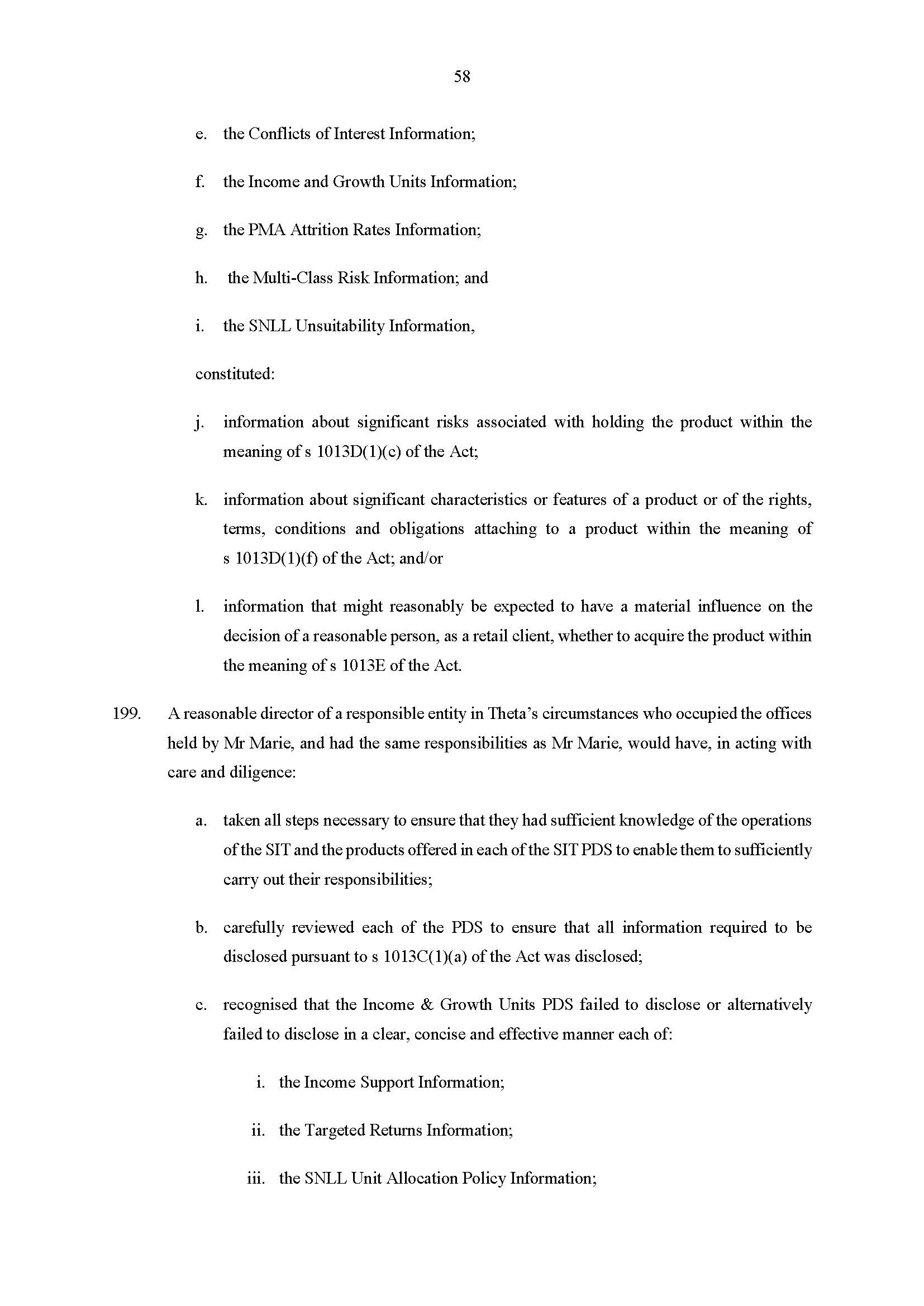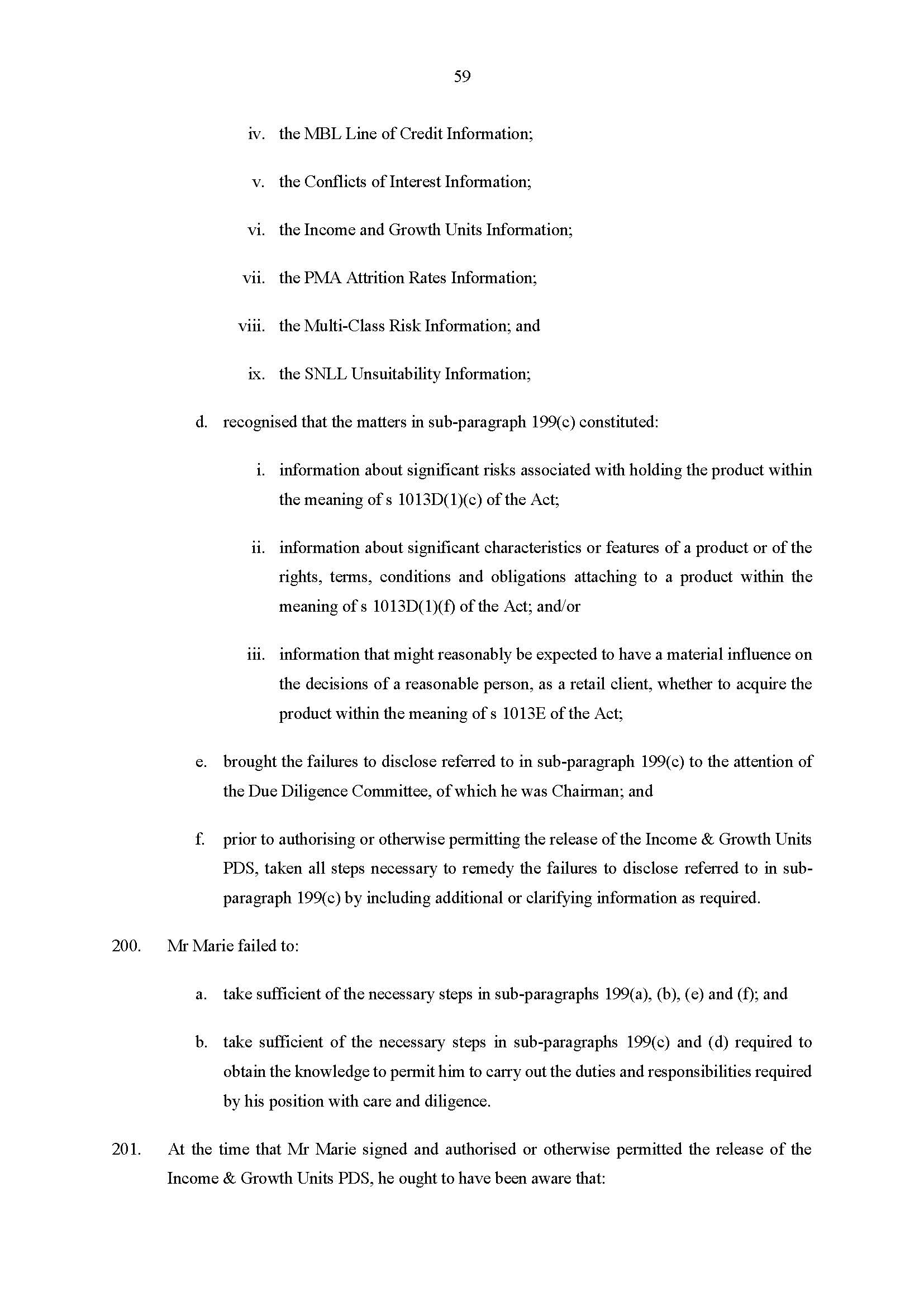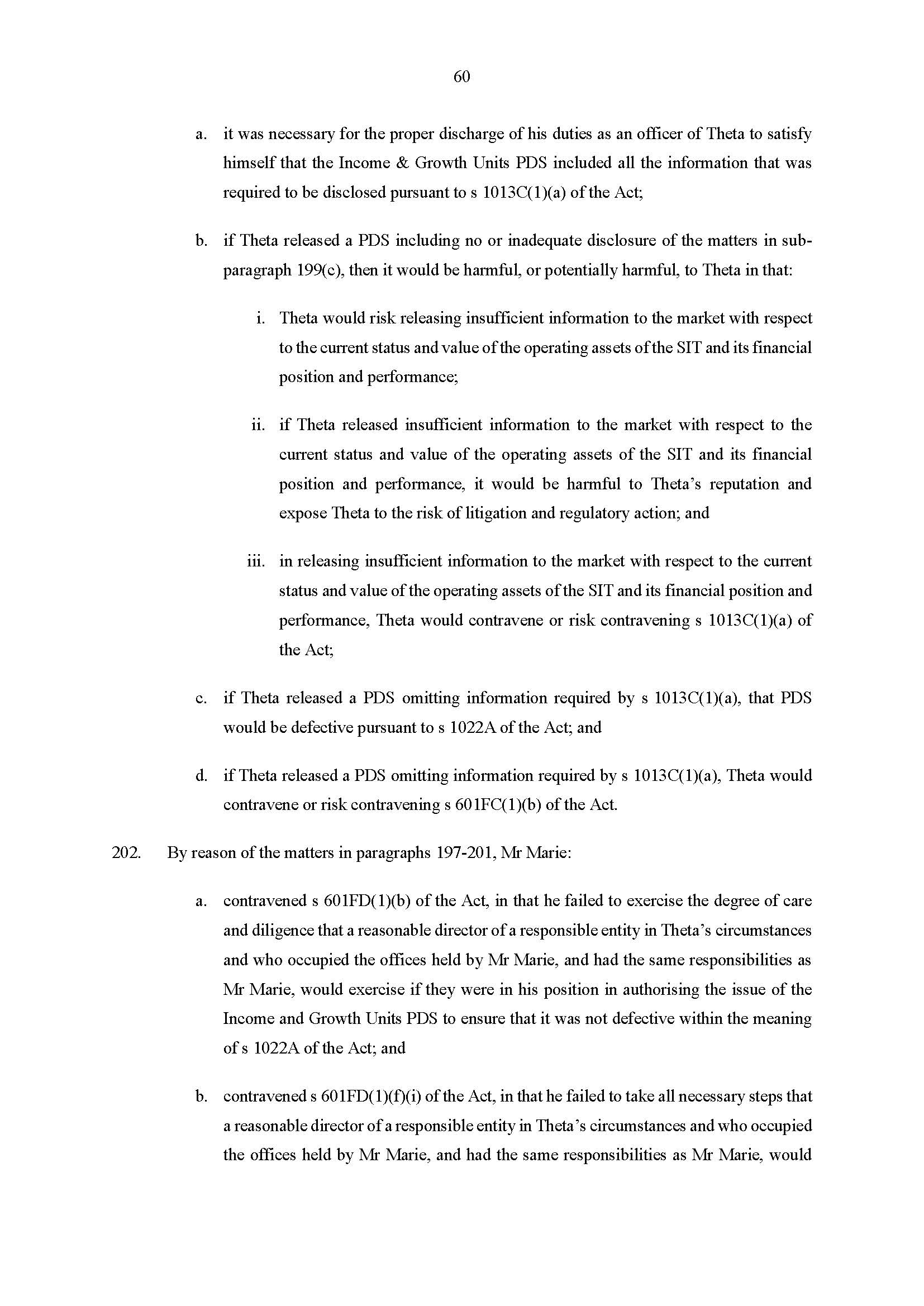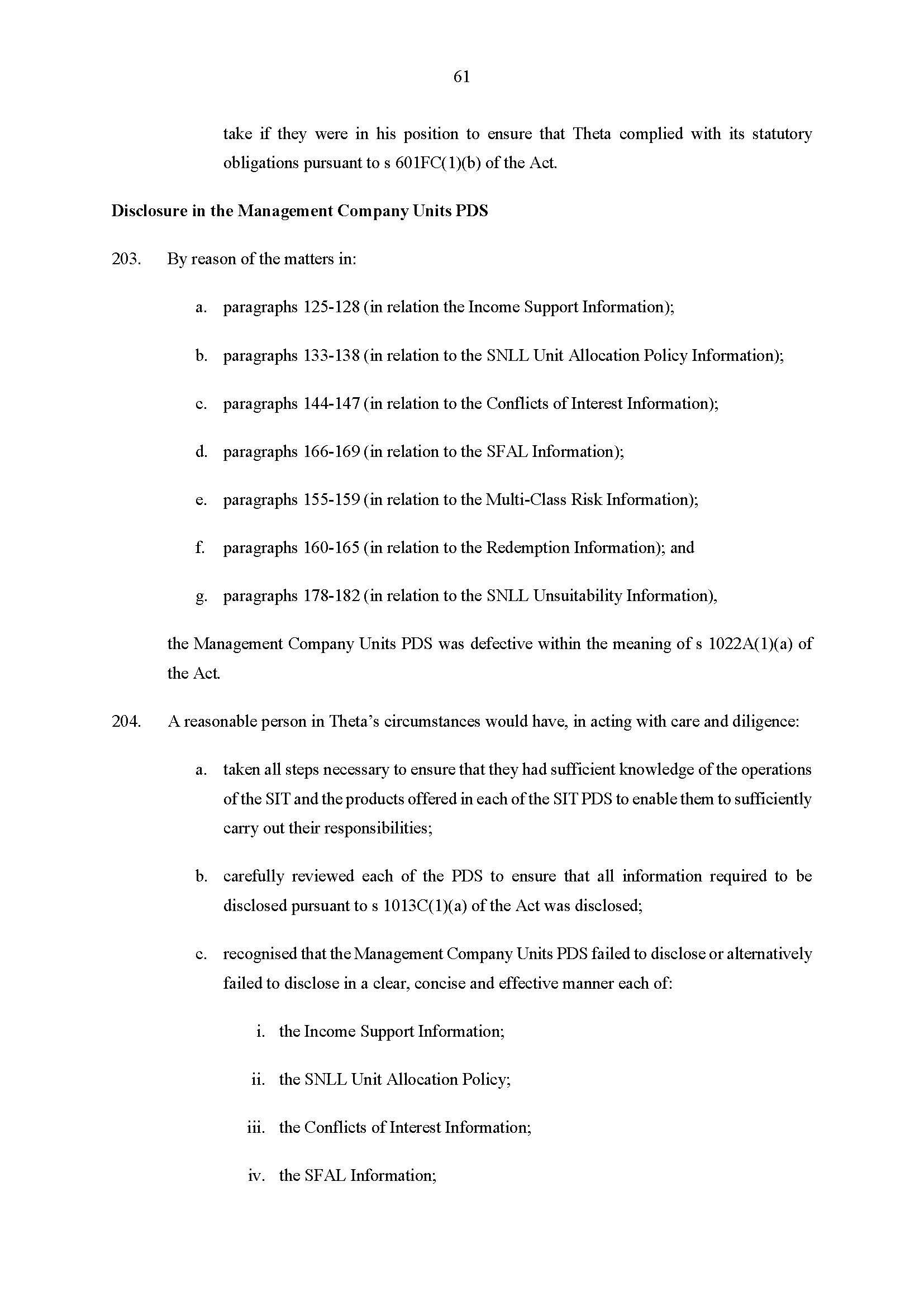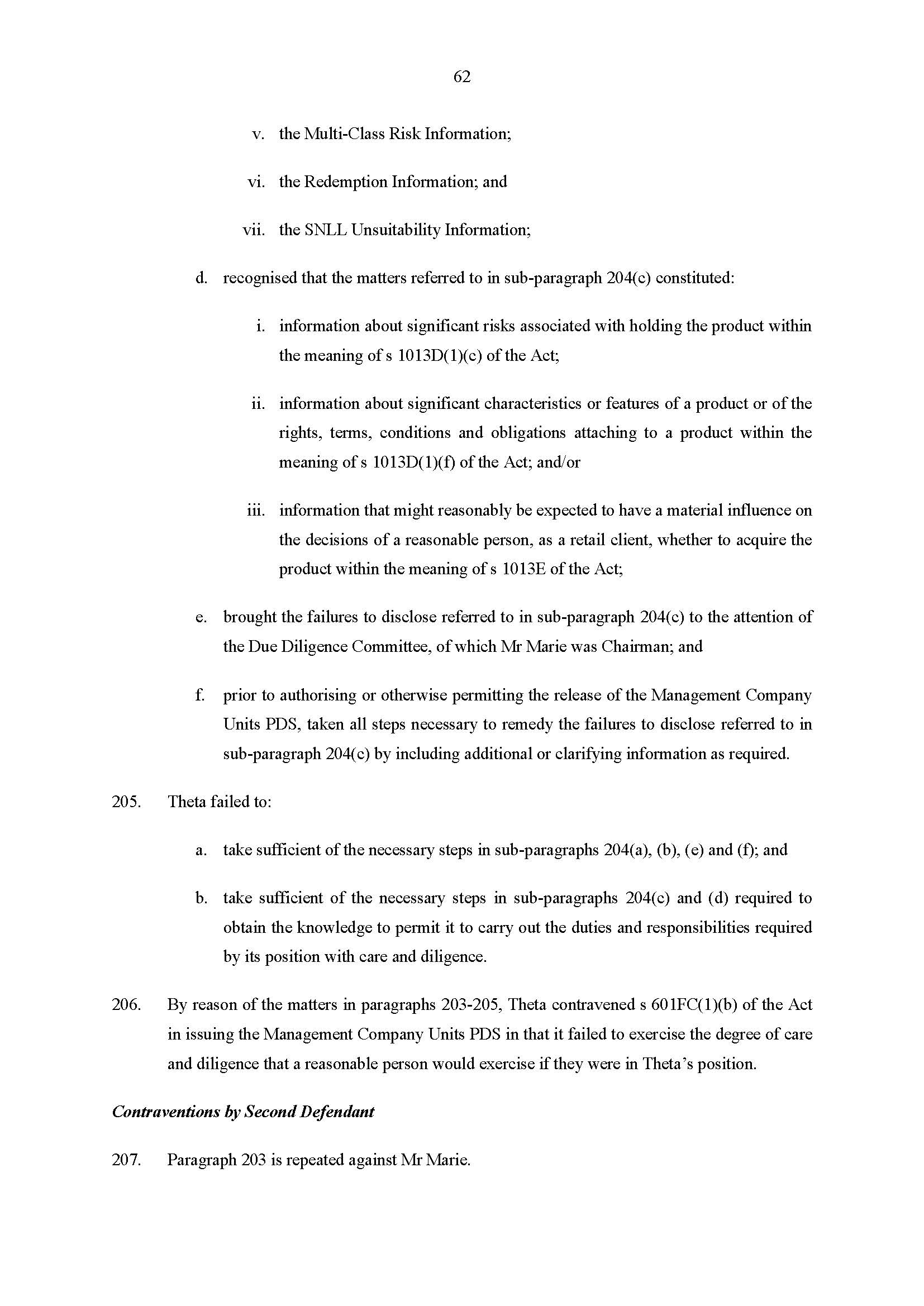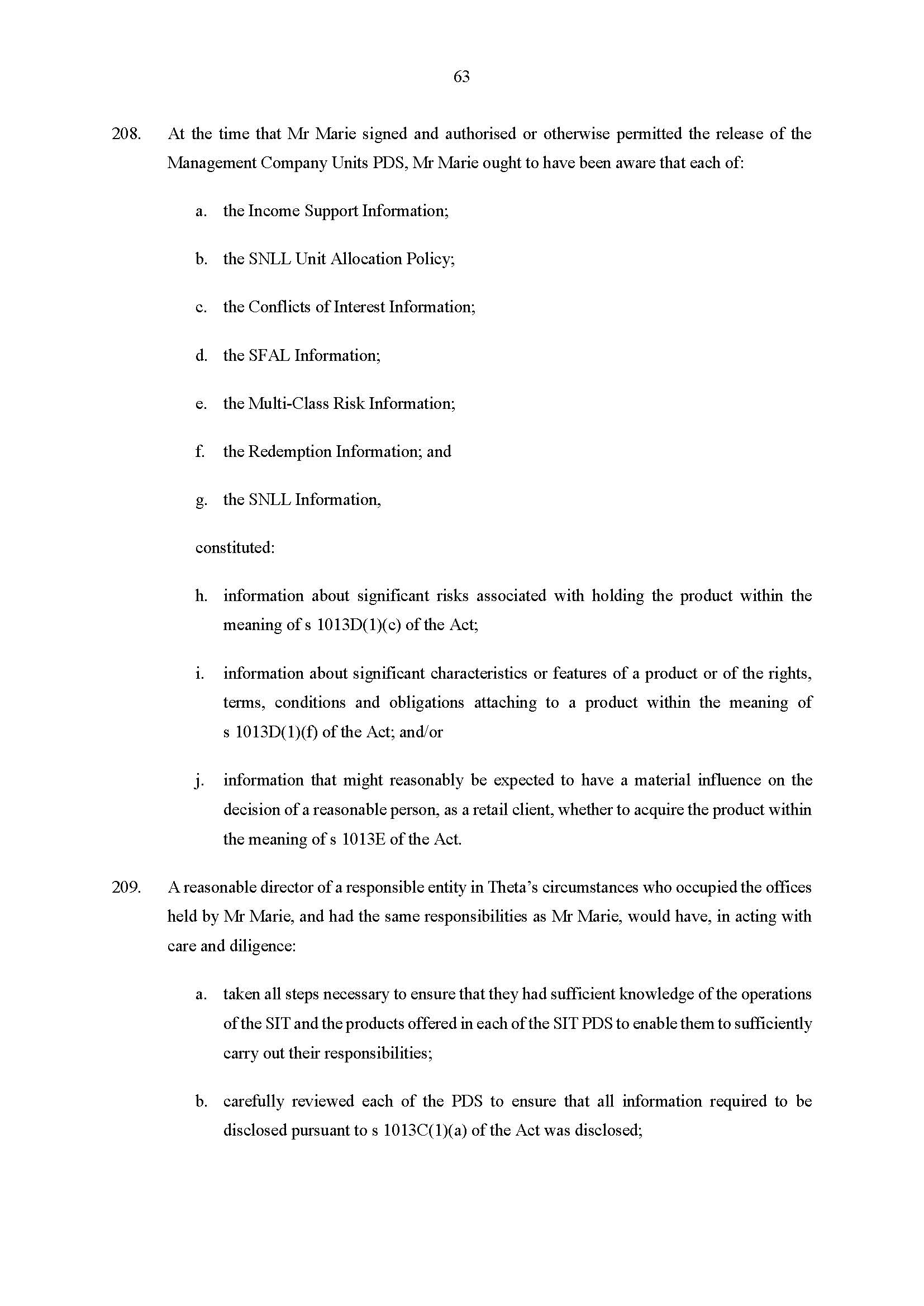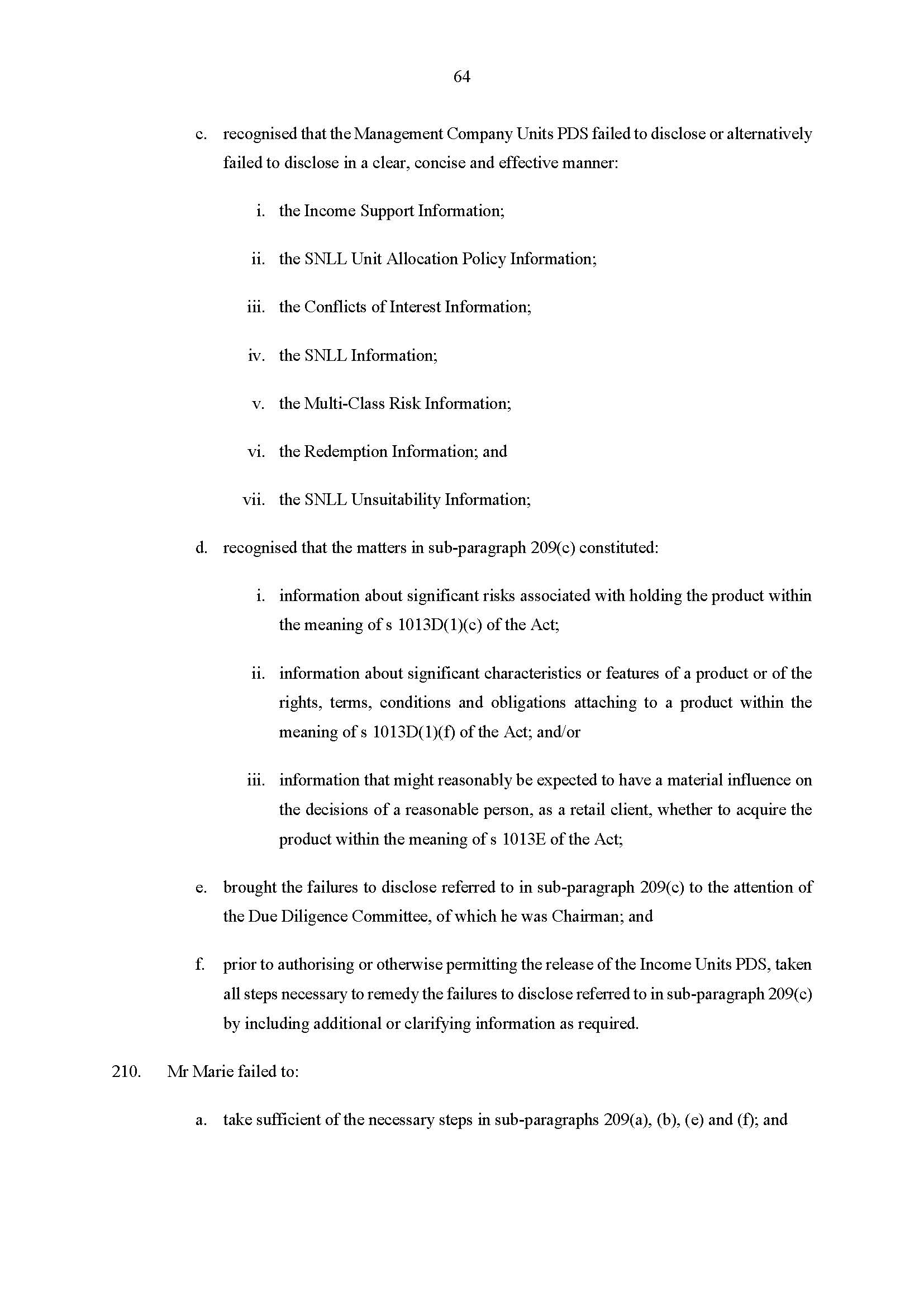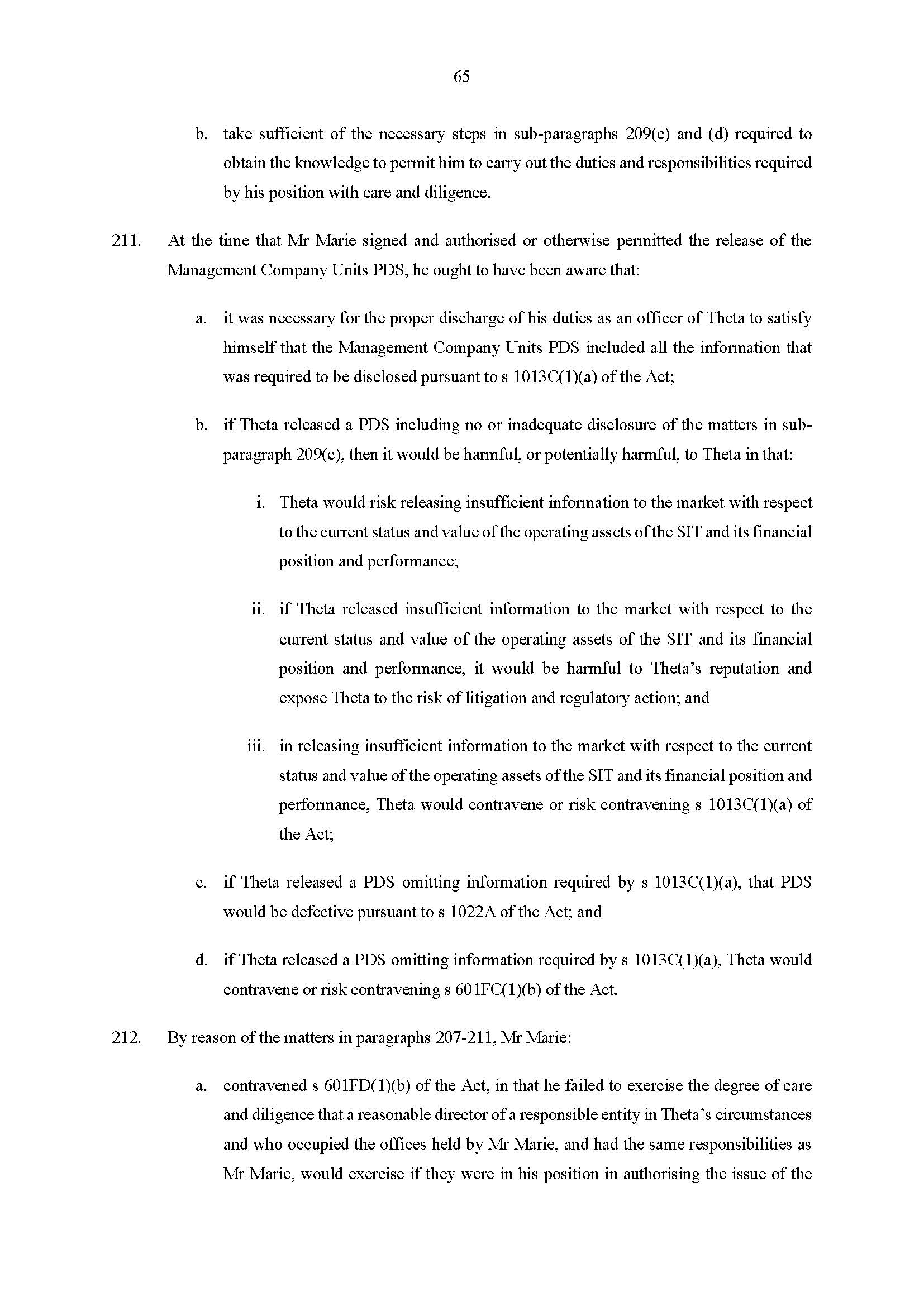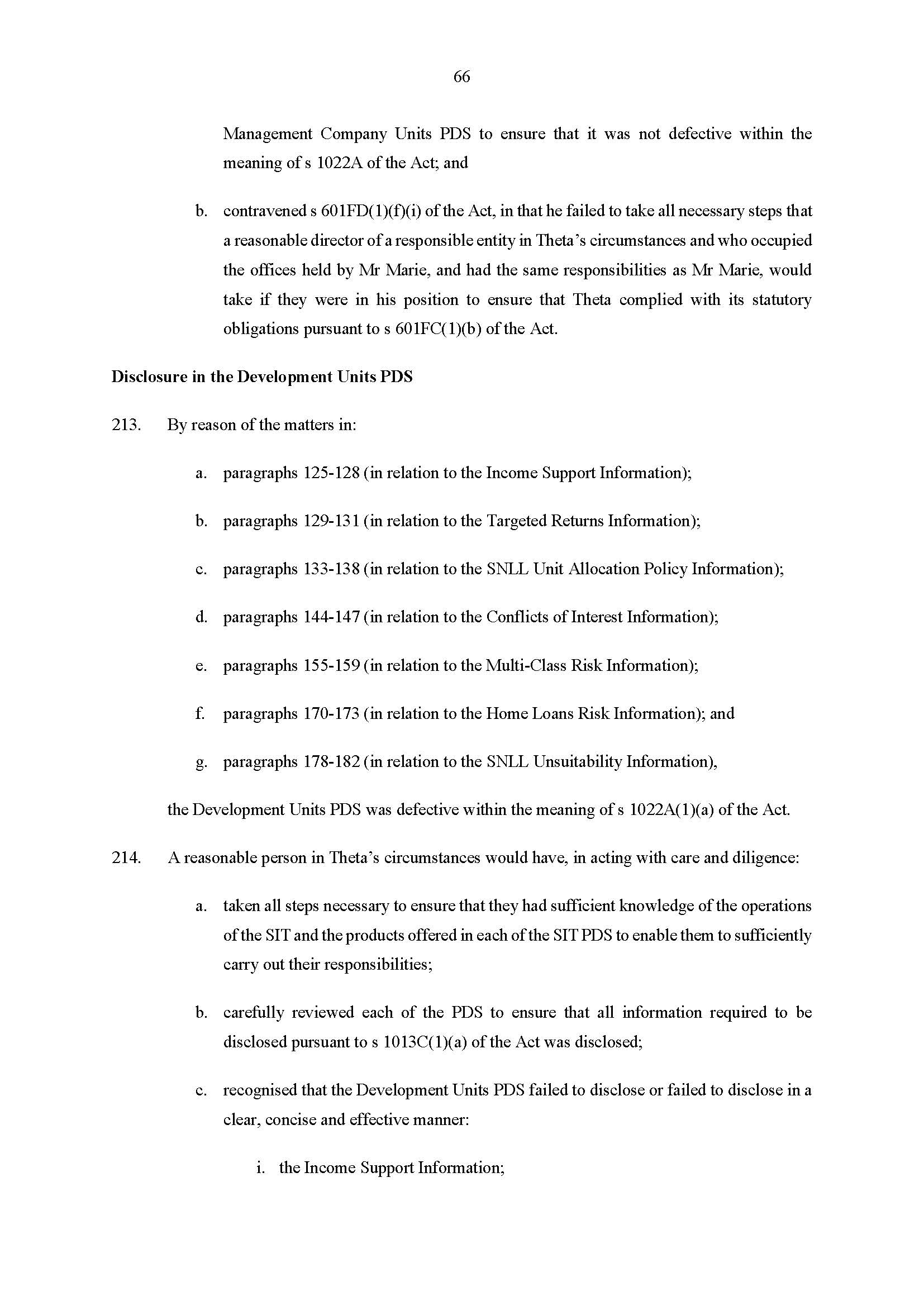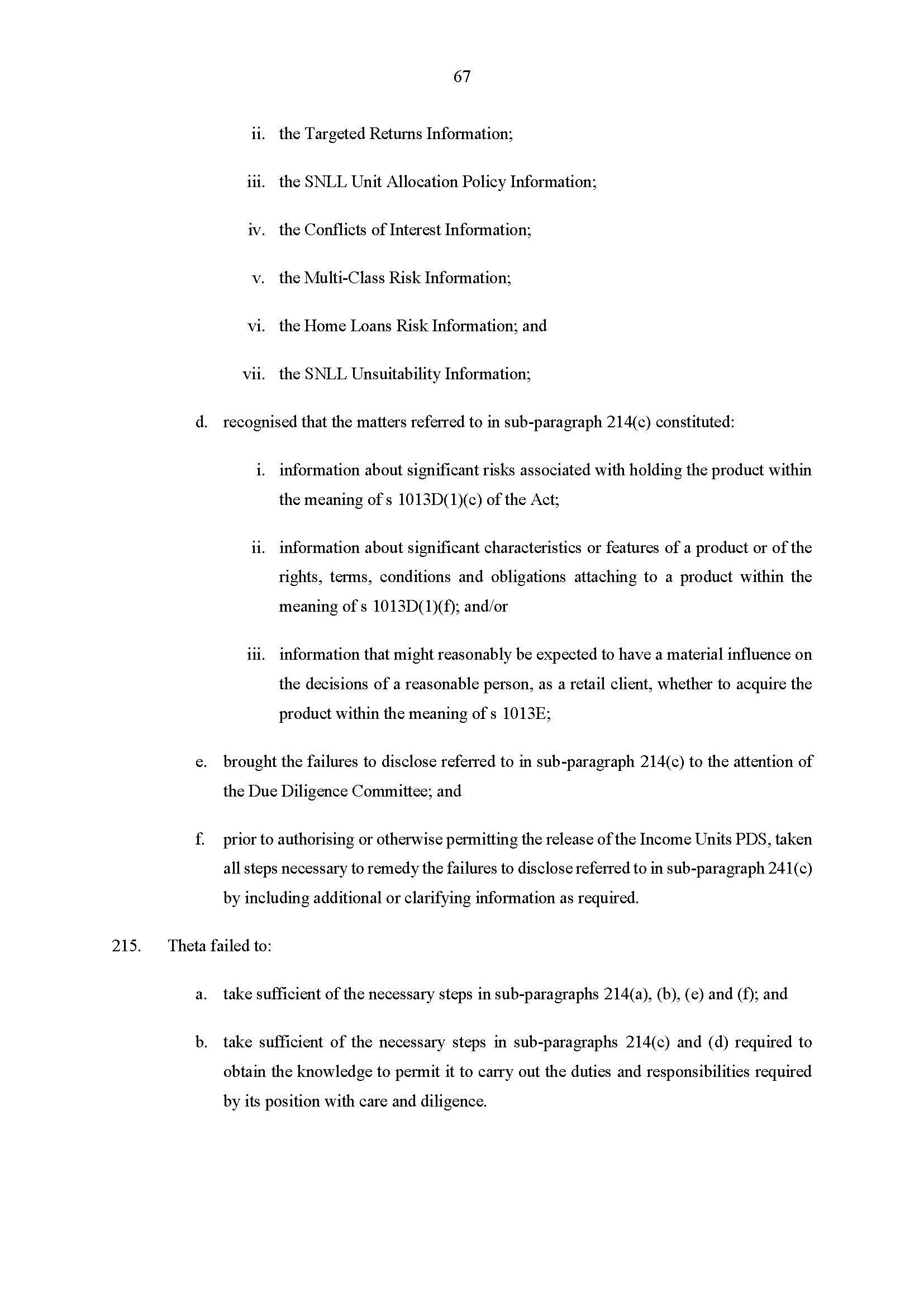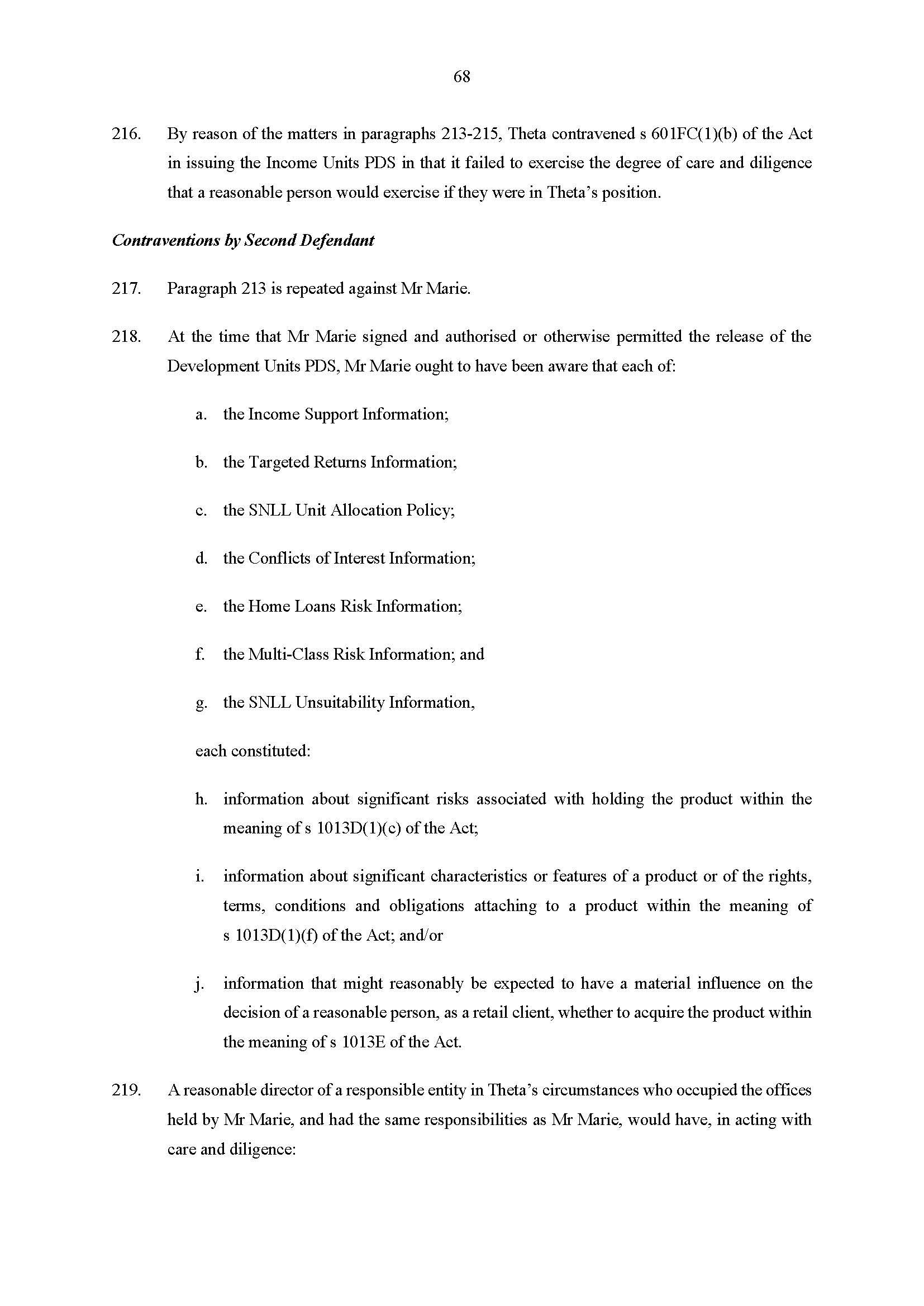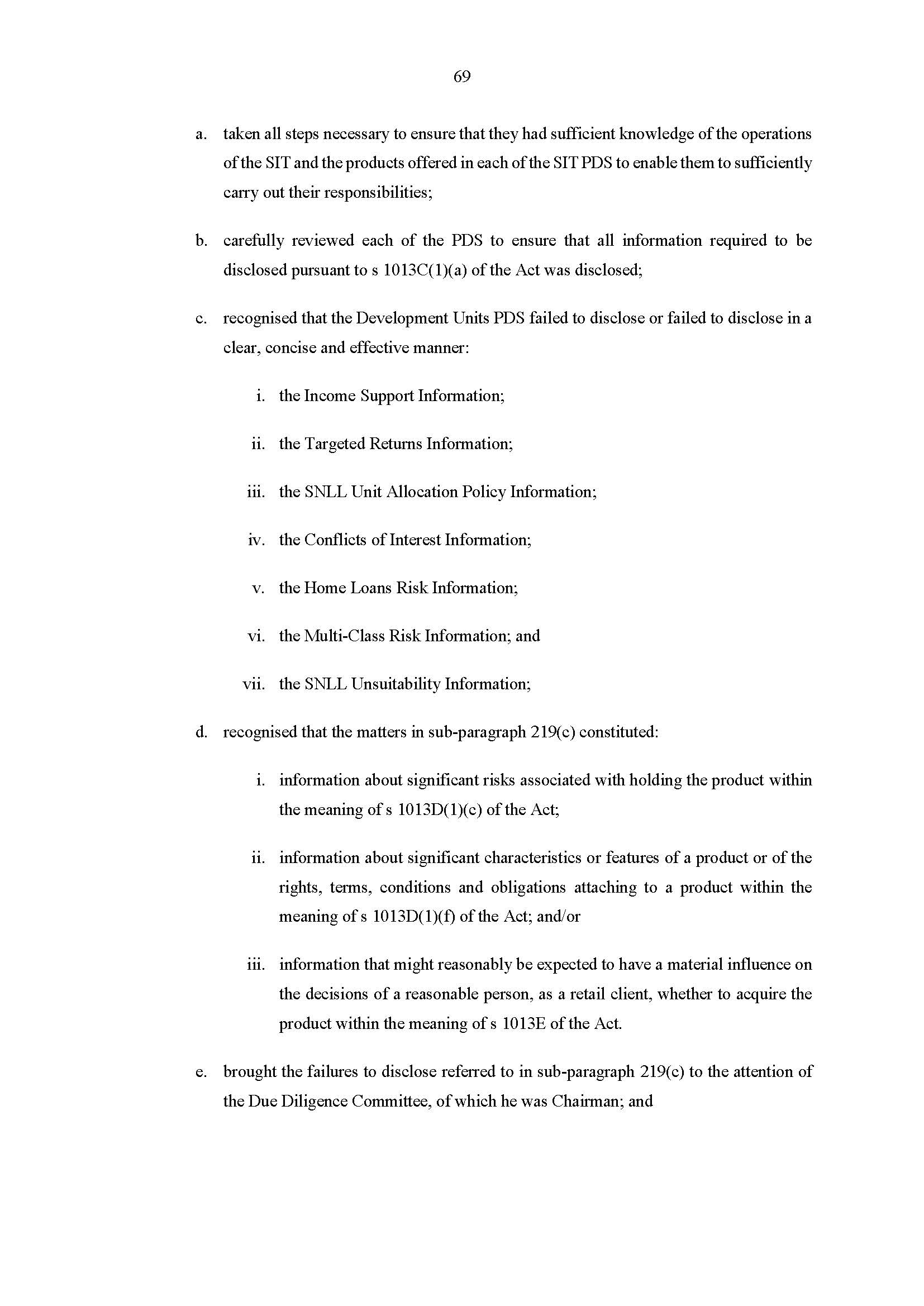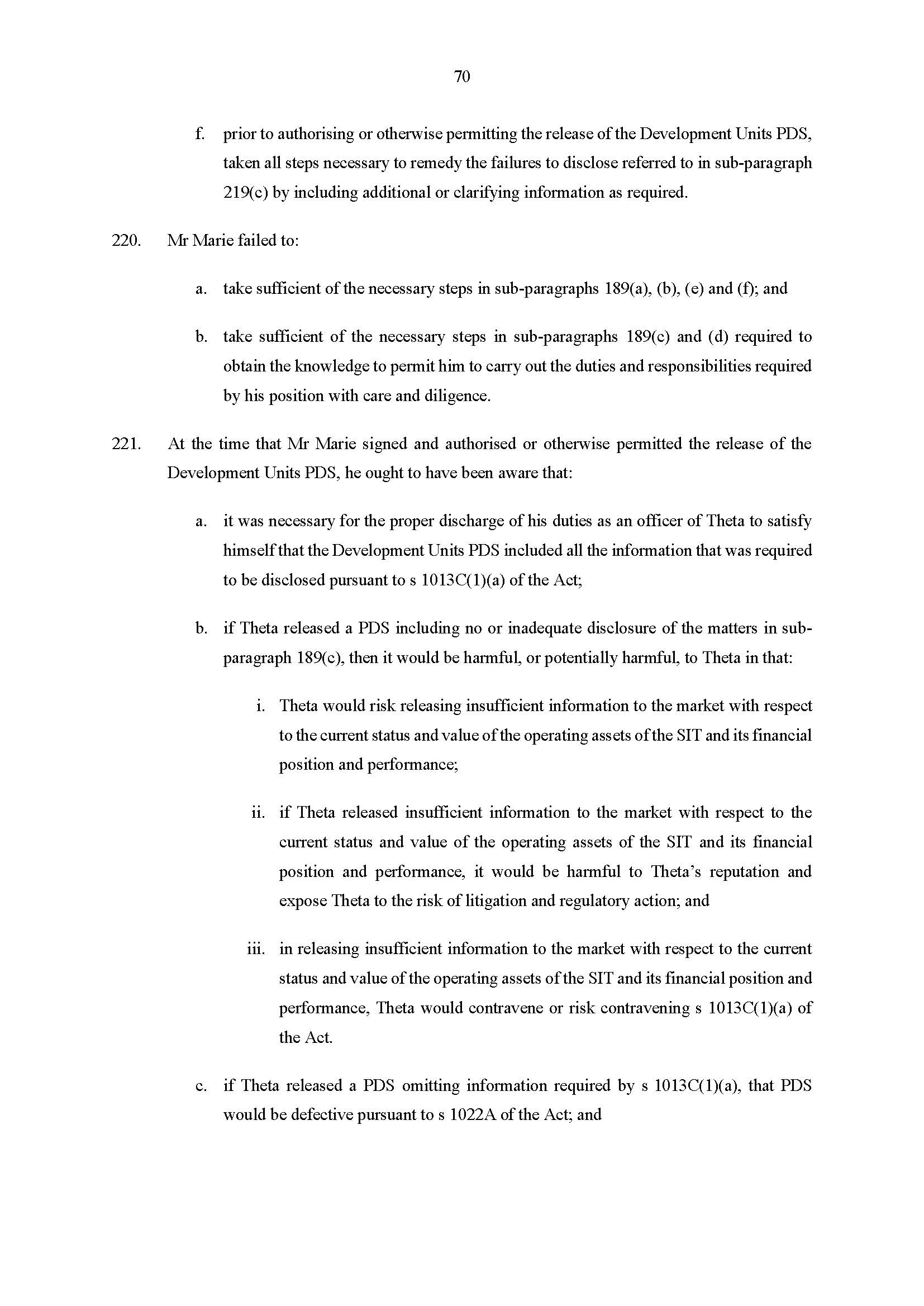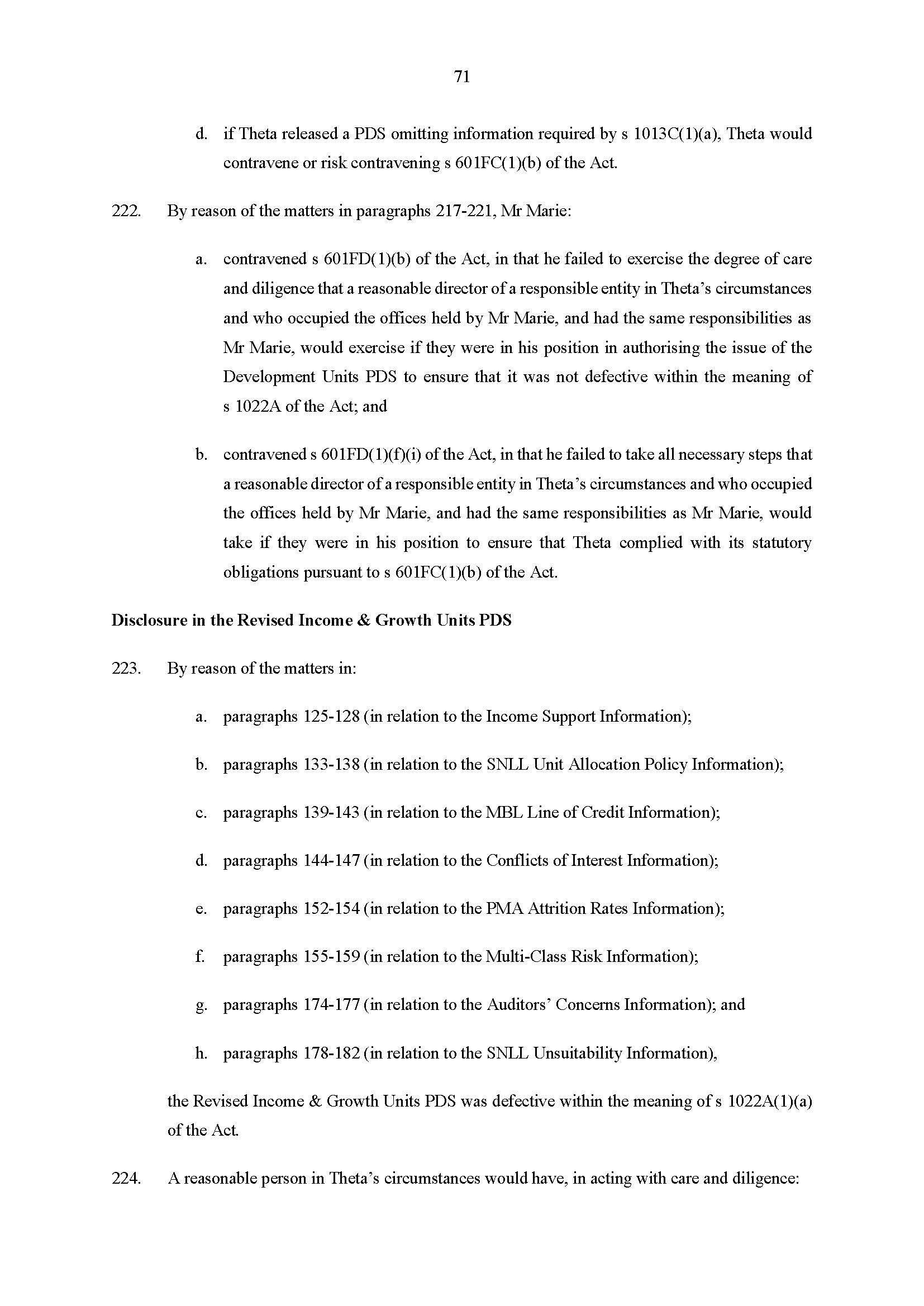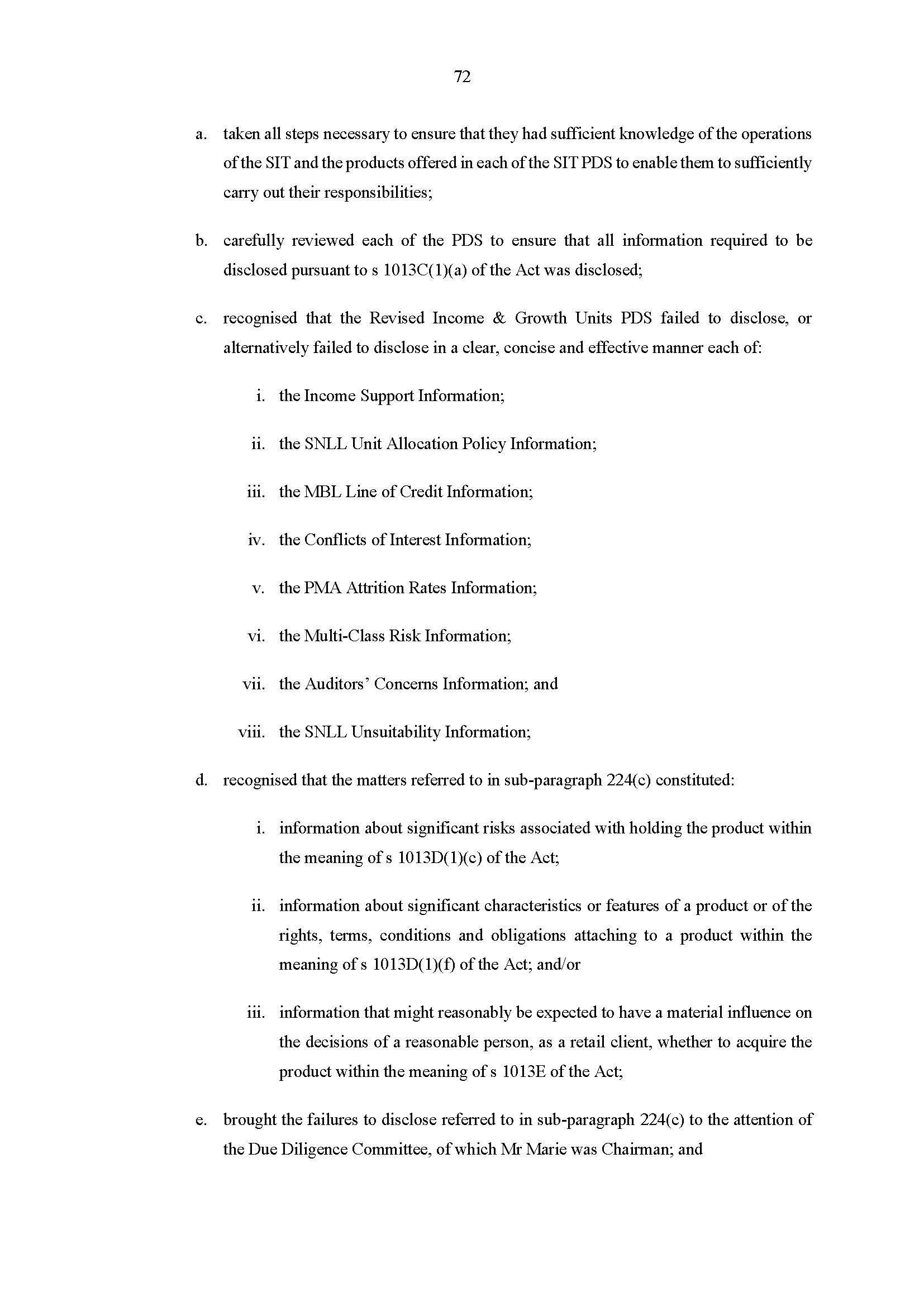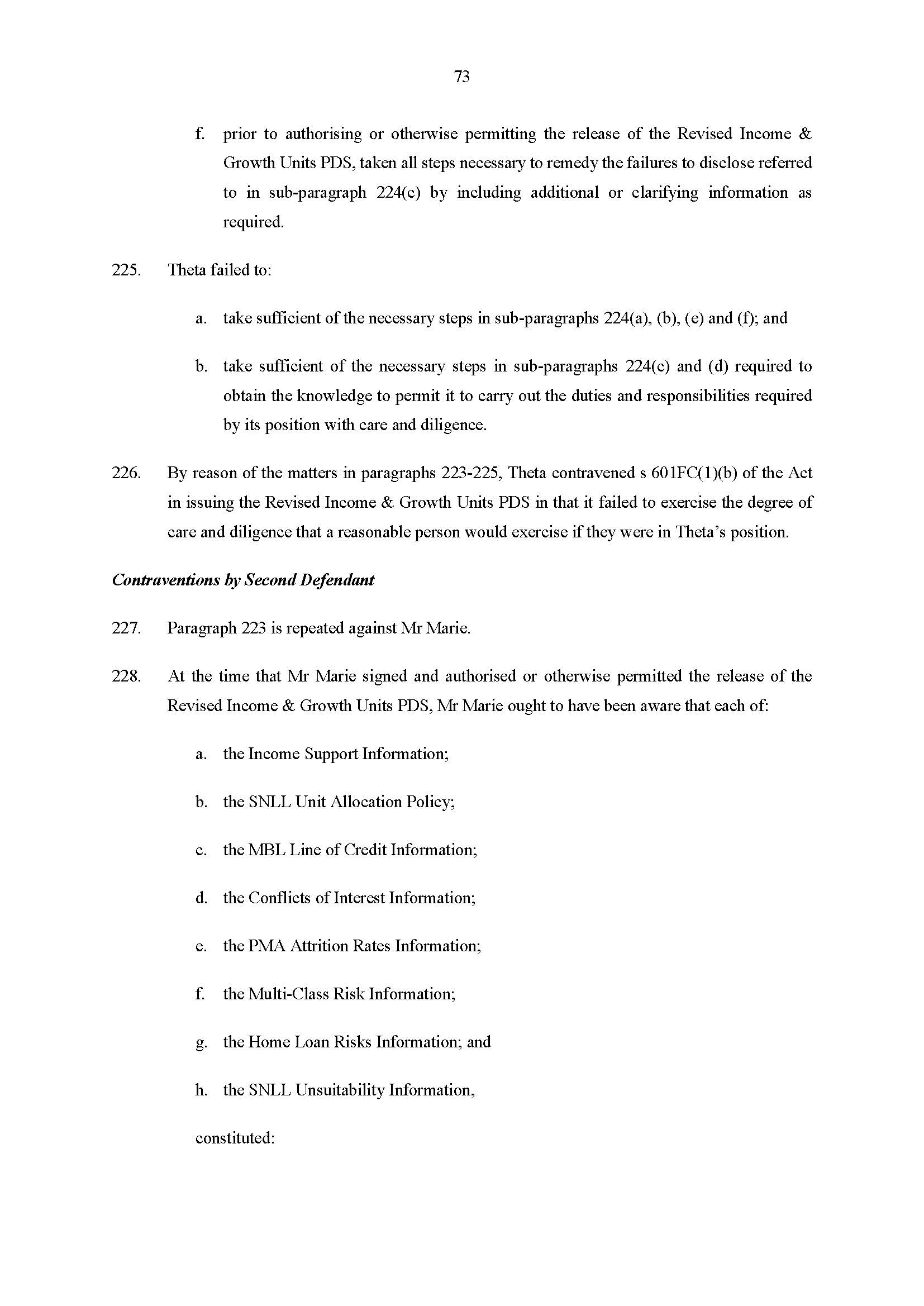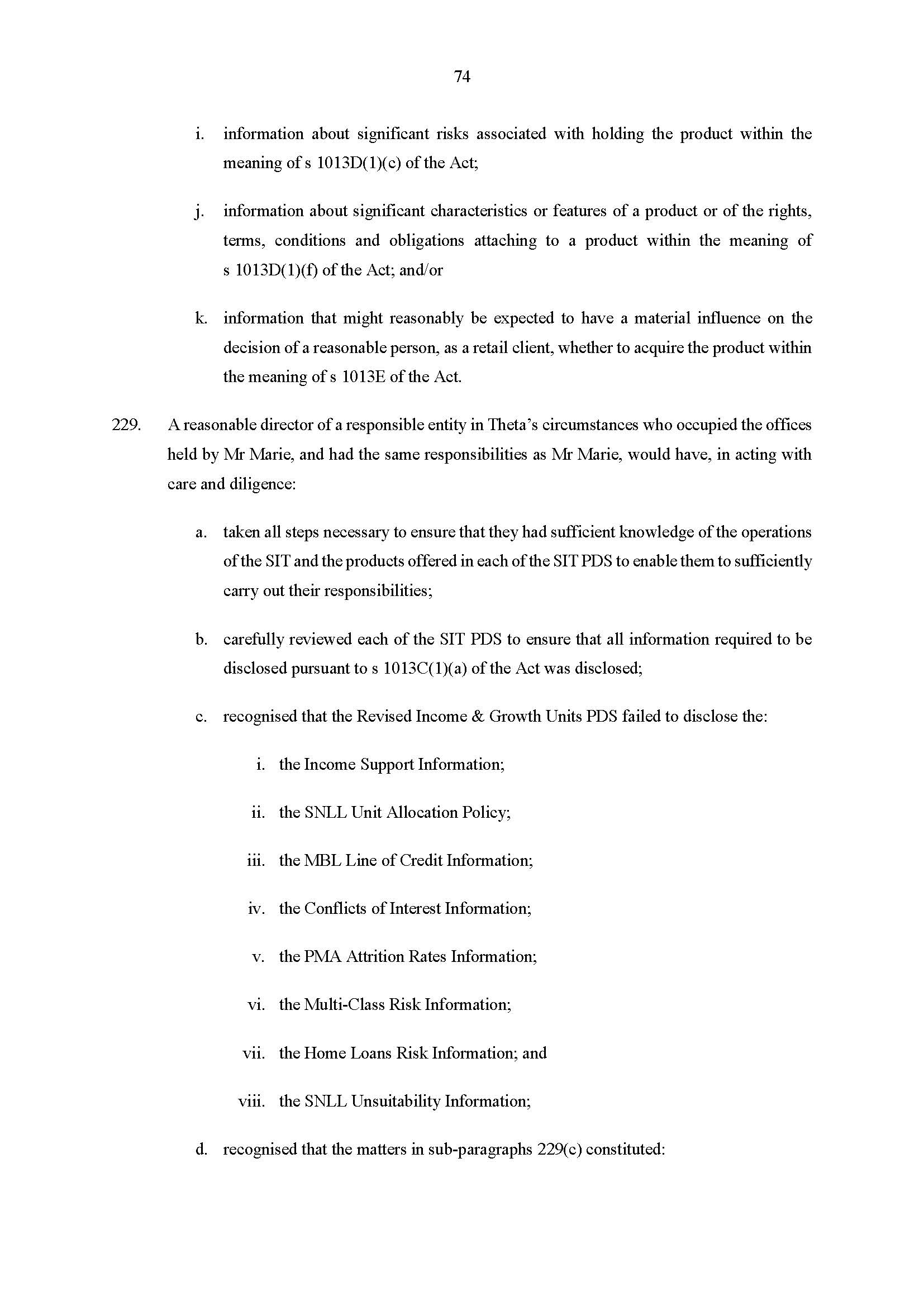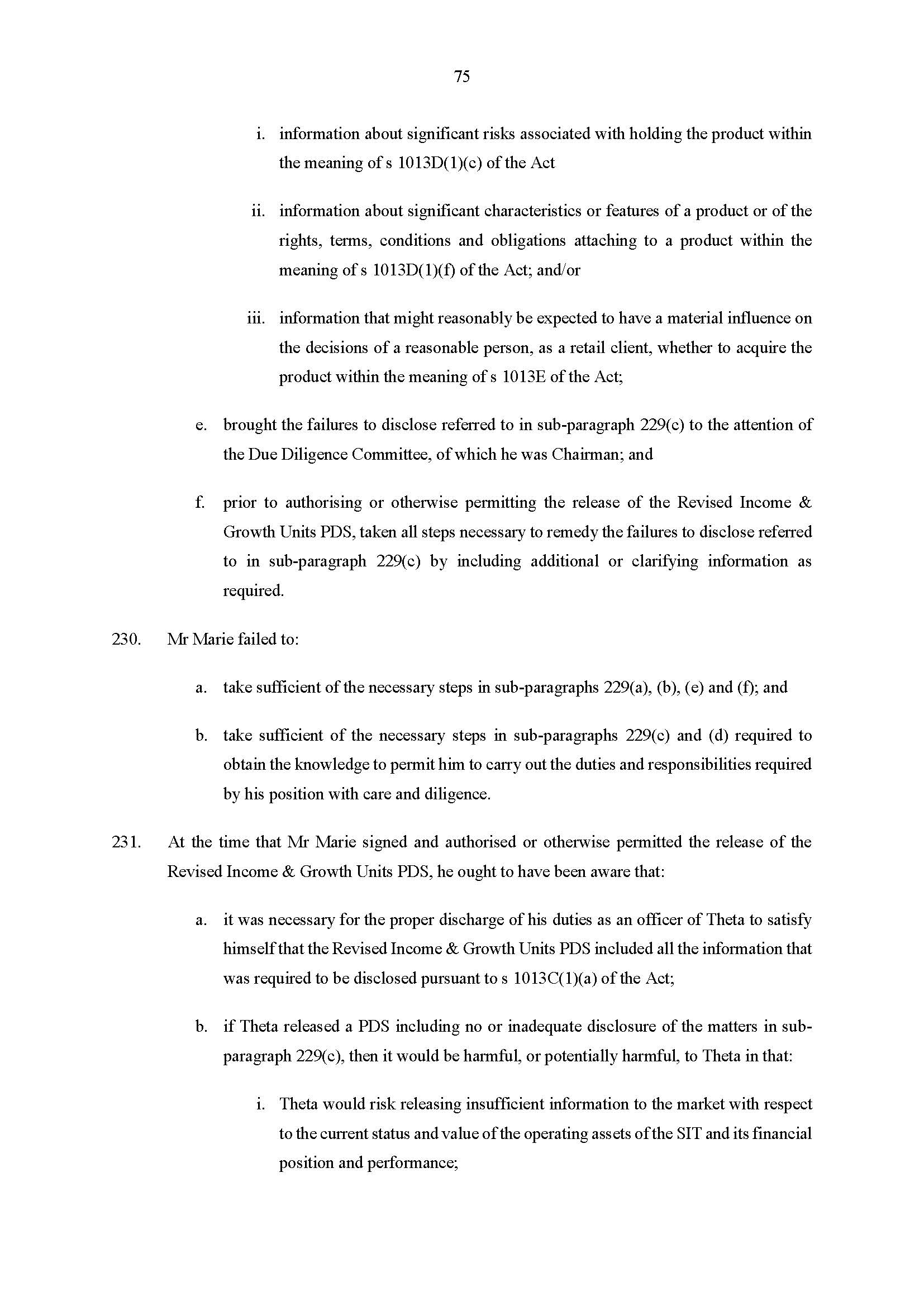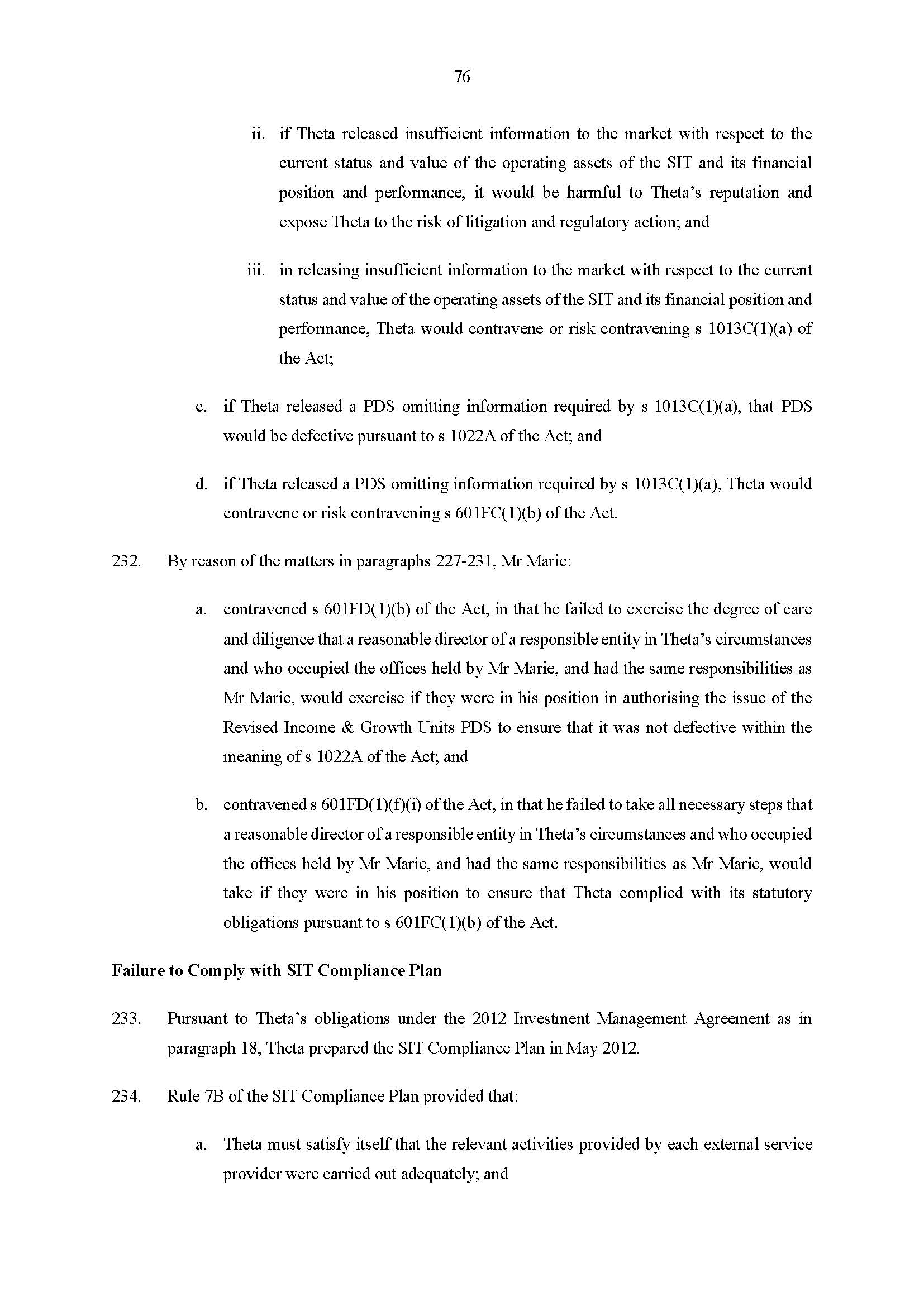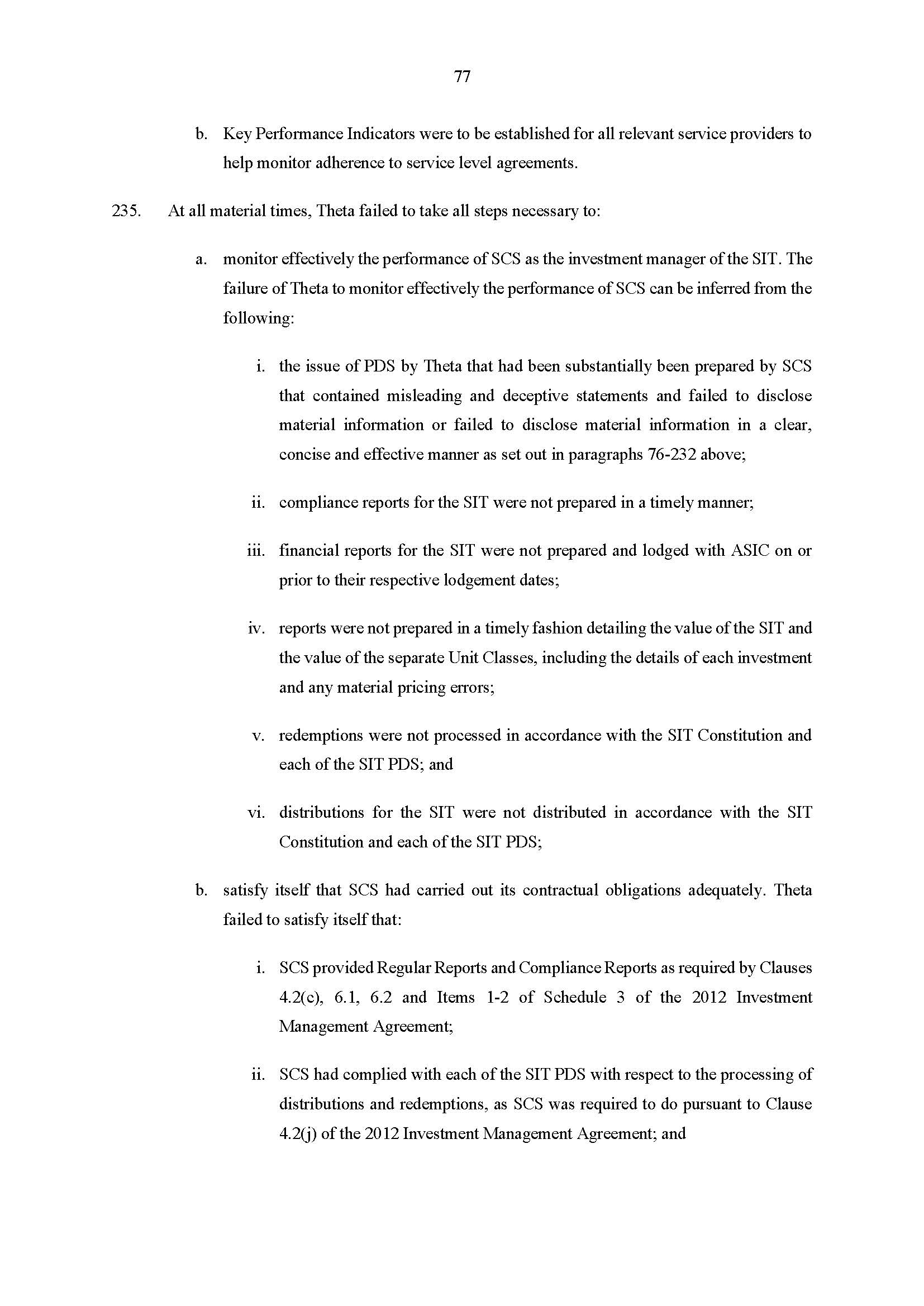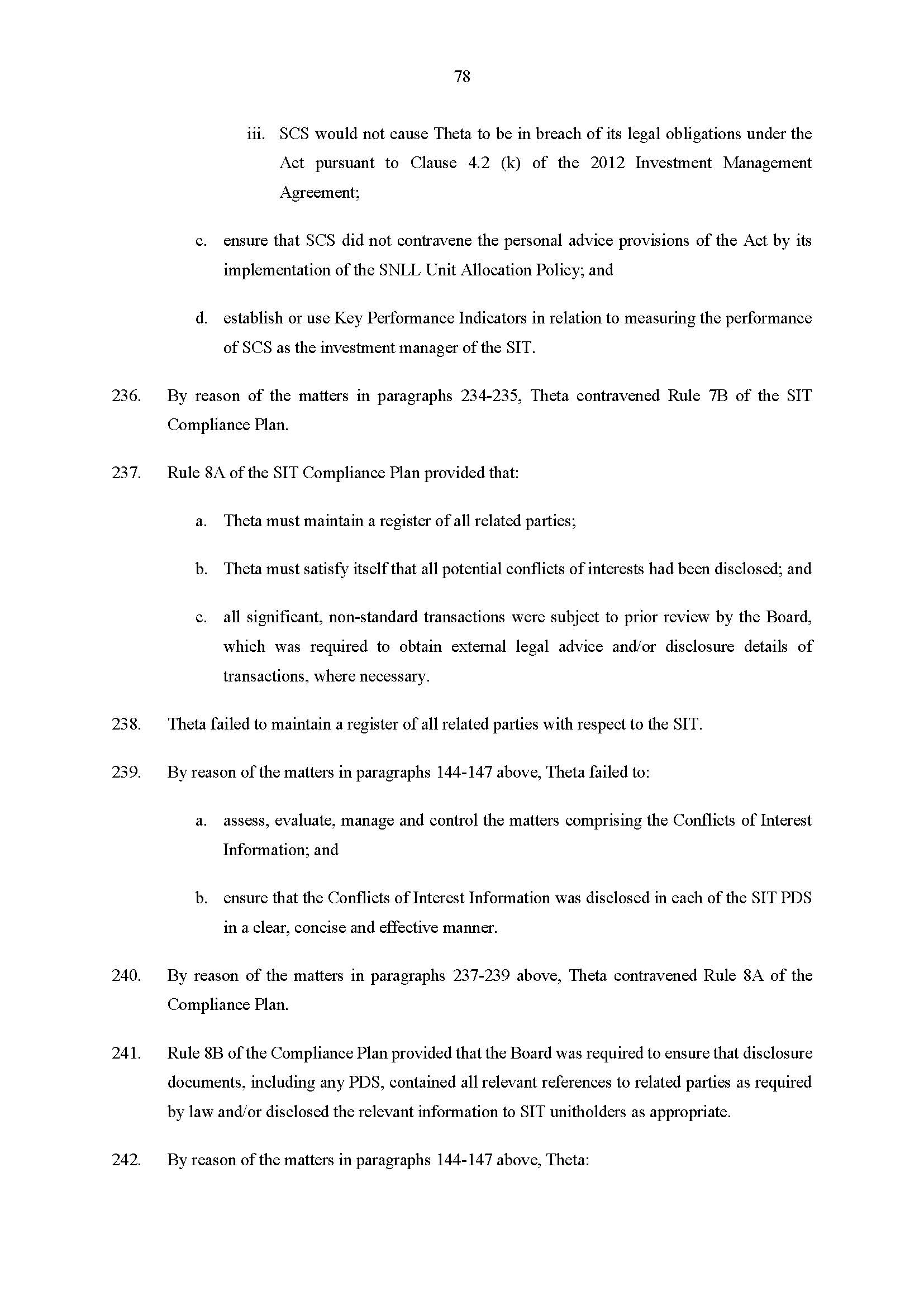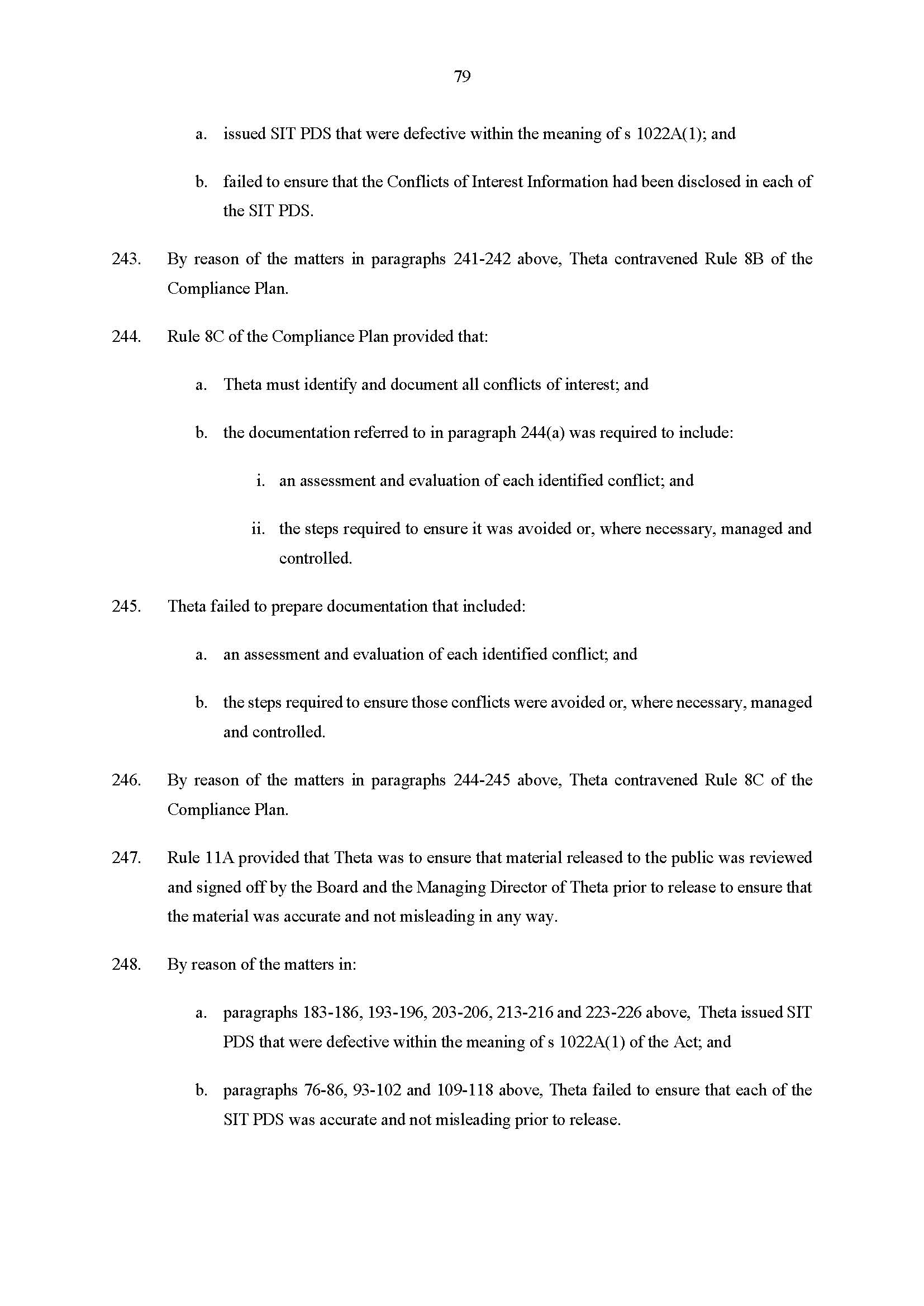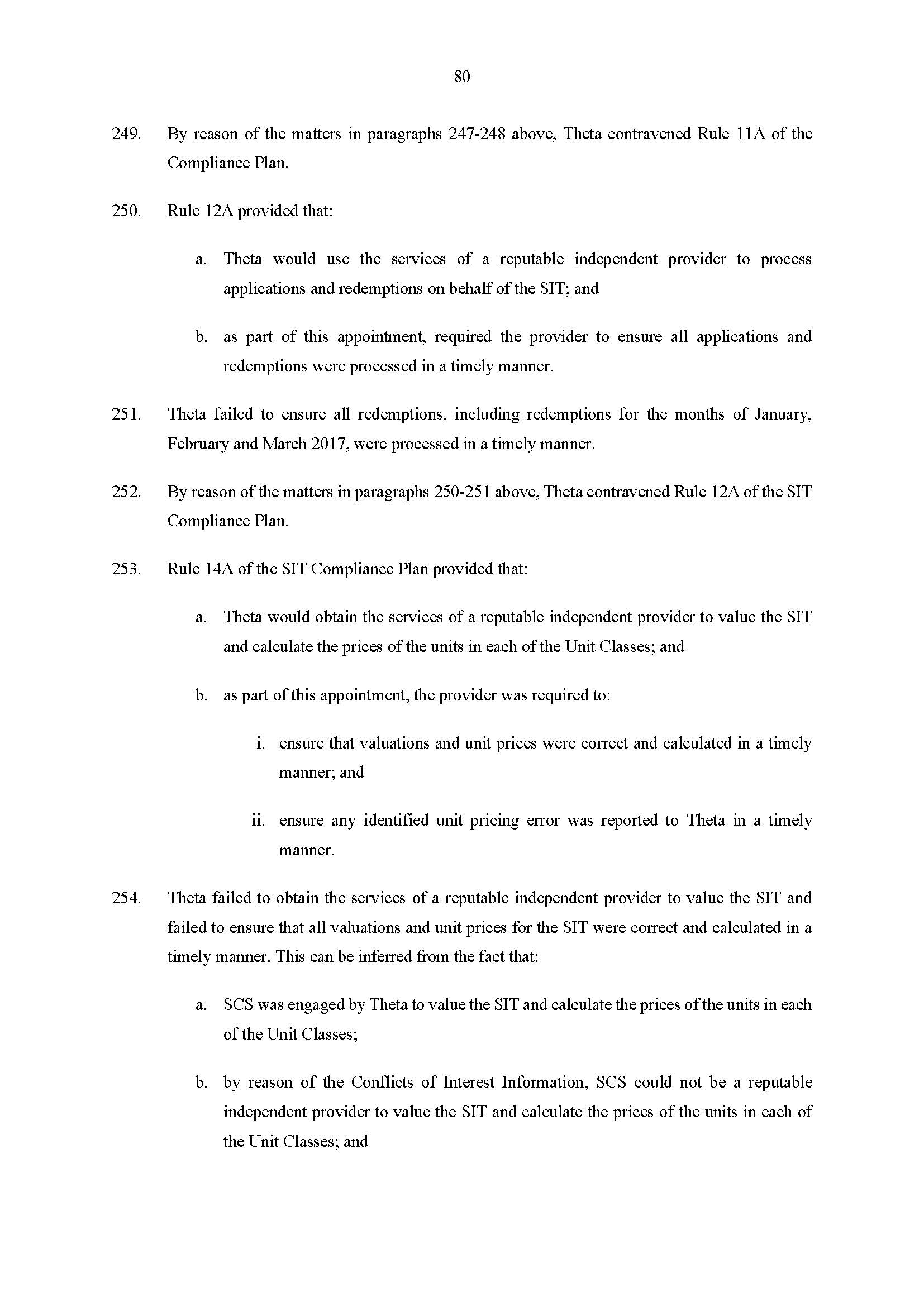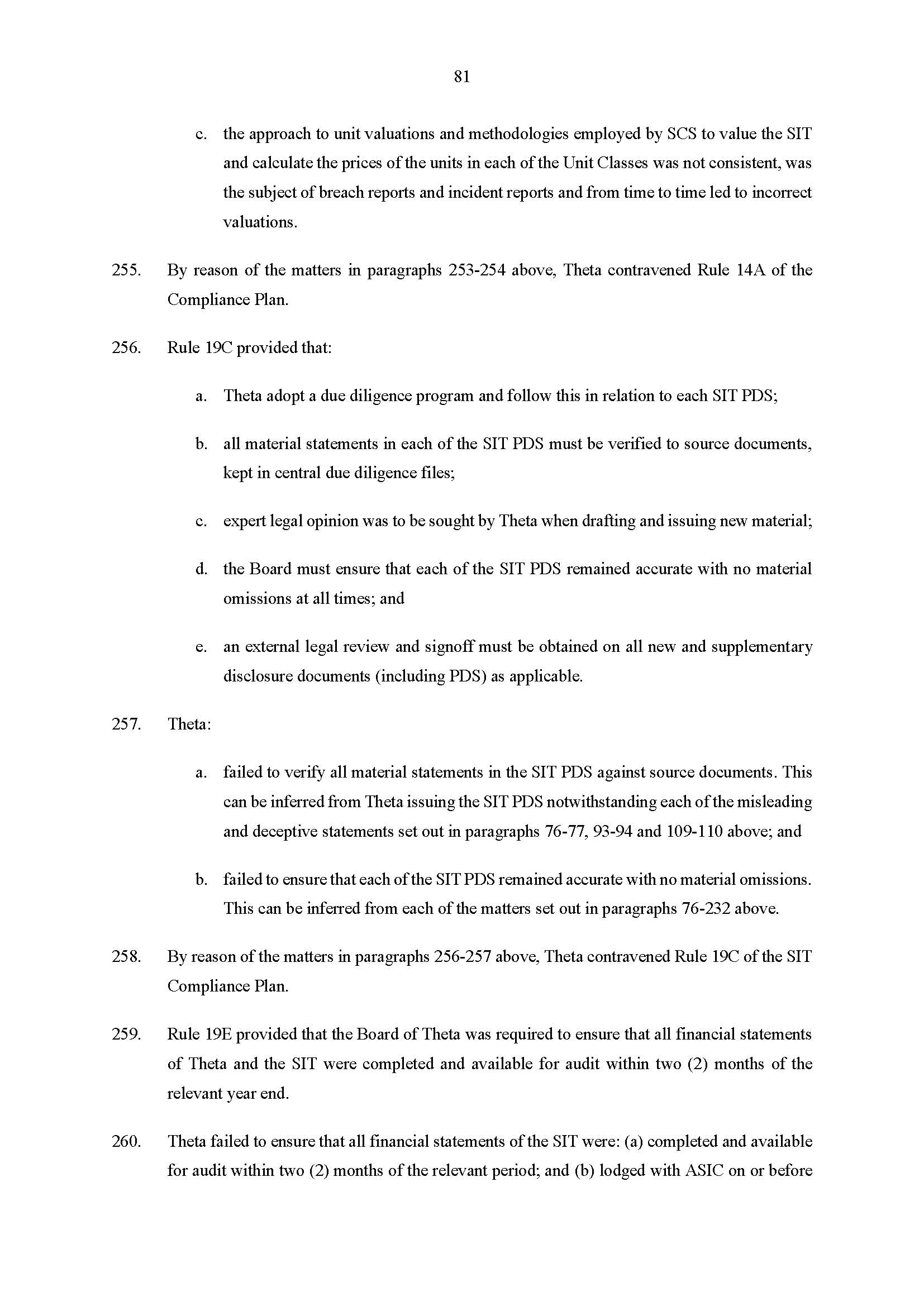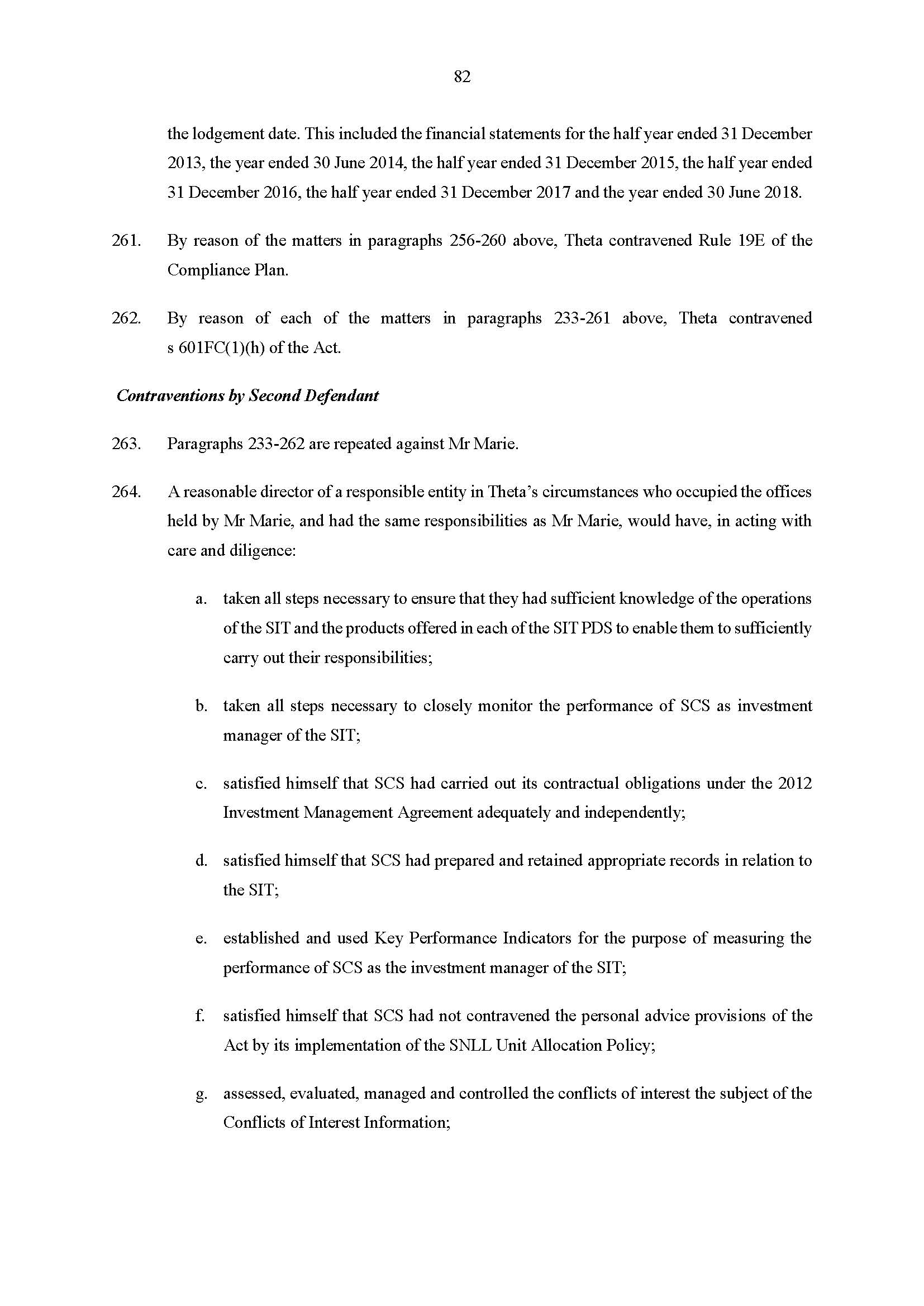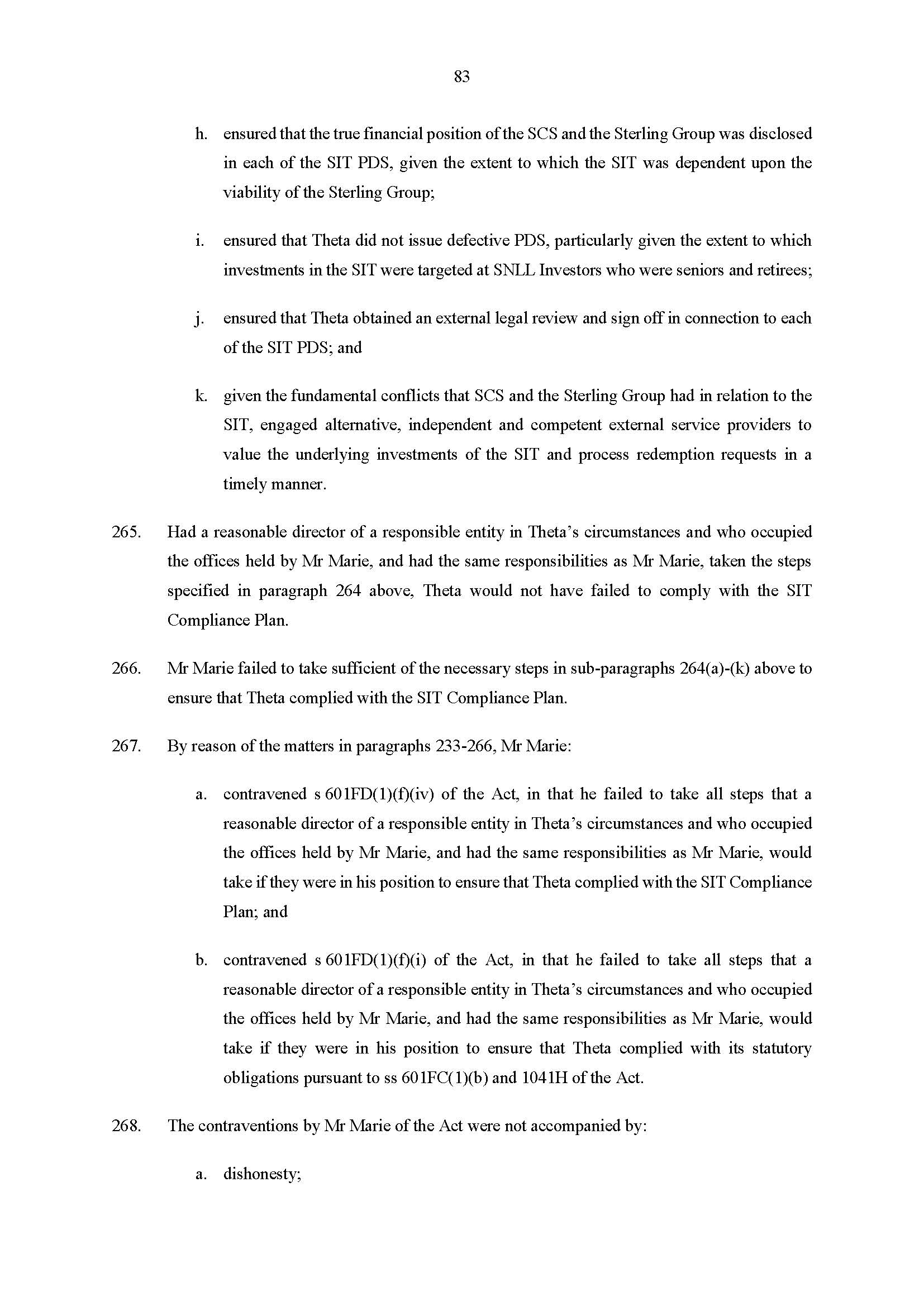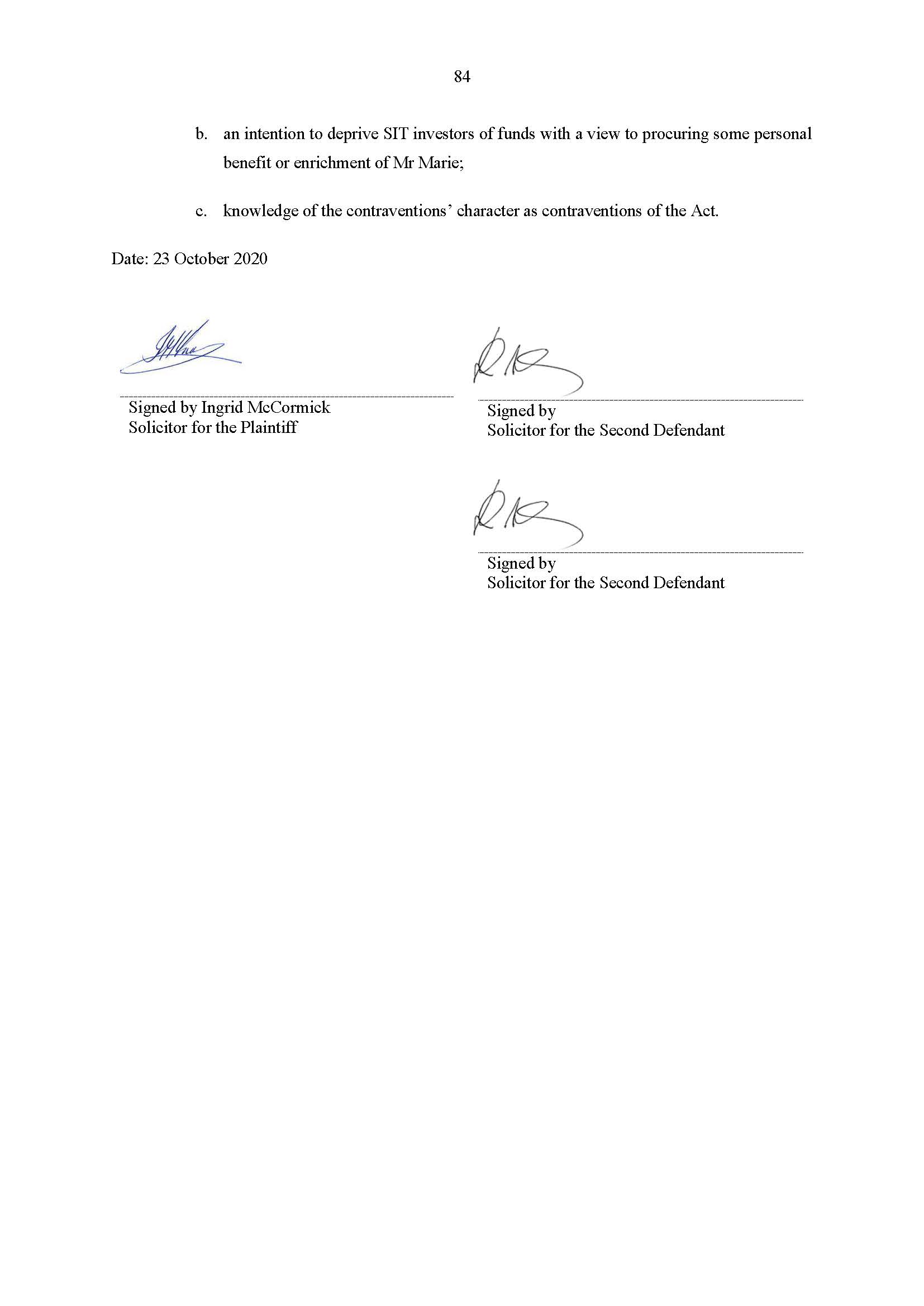FEDERAL COURT OF AUSTRALIA
Australian Securities and Investments Commission v Theta Asset Management Limited [2020] FCA 1894
ORDERS
AUSTRALIAN SECURITIES AND INVESTMENTS COMMISSION Plaintiff | ||
AND: | THETA ASSET MANAGEMENT LIMITED (ACN 071 807 684) First Defendant ROBERT PATRICK MARIE Second Defendant | |
DATE OF ORDER: |
IN RELATION TO THE FIRST DEFENDANT, THETA ASSET MANAGEMENT LIMITED (IN LIQUIDATION), THE COURT DECLARES THAT:
1. Pursuant to section 1317E(1) of the Corporations Act 2001 (Cth) (the Act) the first defendant, Theta Asset Management Limited (in liquidation), contravened sub-section 601FC(1)(b) of the Act in issuing the Development Units Product Disclosure Statement (PDS) in that it was defective within the meaning of section 1022A of the Act in that it contained a misleading or deceptive statement to the effect that the distributions from the Sterling Income Trust (ARSN 158 828 105) (SIT) would be sufficient to enable investors, being retirees and seniors, who had entered into a Sterling New Life Lease (SNLL) to pay all of the rent due on their respective SNLL (Rental Payment Representation) and there was no or no clear, concise and effective disclosure of:
(a) the conflicts of interests that existed in relation to the SIT including those in respect of the various roles undertaken by Sterling First Limited (Sterling First) and its wholly owned subsidiaries (together Sterling Group) and the related transactions outlined in the financial statements for the SIT for the financial year ending 30 June 2016;
(b) the risks attached to the different classes of investment units in the SIT by reason of the competing rights and interests attached to each of those unit classes;
(c) the provision and extent of the income support provided by the Sterling Group to the SIT to enable it to meet its obligations as and when they fell due, in particular the targeted rates of return to investors in the SIT (Sterling income support) and the financial position of the Sterling Group;
(d) the allocation policy utilised by Sterling Corporate Services Pty Ltd (SCS), as investment manager of the SIT, to determine the investment mix of units in the SIT for each of the investors in the SIT who were retirees and seniors and who had entered into SNLLs (SNLL investors);
(e) the risks relating to the underlying investment of the Development Units, being loans issued to fund the building of residential homes in connection with SNLLs;
(f) the assumptions used and contingencies relied on in stating that the target distributions for the Development Units was 20%; and
(g) the inherent risks by reason of the matters outlined above of any investment in the SIT for SNLL investors who were looking for a stable and secure long term income stream to meet rental payments under their respective SNLL and capital preservation.
2. Pursuant to section 1317E(1) of the Act, the first defendant, Theta Asset Management Limited (in liquidation), contravened sub-section 601FC(1)(b) of the Act in issuing the Management Company Units PDS in that it was defective within the meaning of section 1022A of the Act in that it contained a misleading or deceptive statement, namely the Rental Payment Representation and there was no or no clear, concise and effective disclosure of:
(a) the conflicts of interests that existed in relation to the SIT including those in respect of the various roles undertaken by the Sterling Group and the related transactions outlined in the financial statements for the SIT for the financial year ending 30 June 2016;
(b) the risks attached to the different classes of investment units in the SIT by reason of the competing rights and interests attached to each of those unit classes;
(c) the provision and extent of the Sterling income support and the financial position of the Sterling Group;
(d) the allocation policy utilised by SCS, as investment manager of the SIT, to determine the investment mix of units in the SIT for each of the SNLL investors (SNLL unit allocation policy);
(e) the constraints on investors’ ability to redeem their investment;
(f) information relating to the underlying assets of the Management Company Units being shares in Sterling First, including its financial position, board constitution and shareholdings; and
(g) the inherent risks by reason of the matters outlined above of any investment in the SIT for SNLL investors who were looking for a stable and secure long term income stream to meet rental payments under their respective SNLL and capital preservation.
(h)
3. Pursuant to section 1317E(1) of the Act, the first defendant, Theta Asset Management Limited (in liquidation), contravened sub-section 601FC(1)(b) of the Act in issuing the Income Units PDS in that it was defective within the meaning of section 1022A of the Act in that there was no or no clear, concise and effective disclosure of:
(a) the conflicts of interests that existed in relation to the SIT including those in respect of the various roles undertaken by the Sterling Group and the related transactions outlined in the financial statements for the SIT for the financial year ending 30 June 2016;
(b) the risks attached to the different classes of investment units in the SIT by reason of the competing rights and interests attached to each of those unit classes;
(c) the provision and extent of the Sterling income support financial position of the Sterling Group;
(d) the SNLL unit allocation policy;
(e) the assumptions used and contingencies relied on in stating that the target distributions were 9.25% for Income Units;
(f) the terms of and attrition rates for the rental management agreements;
(g) the fact that income generated from the rental management agreements used to pay the returns to the Income Units was also the subject of a first ranking registered security interest under the Personal Property Securities Act 2009 (Cth) (PPSA) held by Macquarie Bank Limited; and
(h) the inherent risks by reason of the matters outlined above of any investment in the SIT for SNLL investors who were looking for a stable and secure long term income stream to meet rental payments under their respective SNLL and capital preservation.
(i)
4. Pursuant to section 1317E(1) of the Act, the first defendant, Theta Asset Management Limited (in liquidation), contravened sub-section 601FC(1)(b) of the Act in issuing the Income and Growth Units PDS in that it was defective within the meaning of section 1022A of the Act in that it contained a misleading and deceptive statement to the effect that the Sterling Group had provided a secured and enforceable guarantee of the payment of distributions to be made to unitholders (Sterling Guarantee Representation) and there was no or no clear, concise and effective disclosure of:
(a) the conflicts of interests that existed in relation to the SIT including those in respect of the various roles undertaken by the Sterling Group and the related transactions outlined in the financial statements for the SIT for the financial year ending 30 June 2016;
(b) the risks attached to the different classes of investment units in the SIT by reason of the competing rights and interests attached to each of those unit classes;
(c) the provision and extent of the Sterling income support and the financial position of the Sterling Group;
(d) the SNLL unit allocation policy;
(e) the differences and disparity in the risks attached to in Income Units as opposed to Growth Units;
(f) the allocation policy or statement regarding how investors’ funds were to be applied between Income Units and Growth Units;
(g) the assumptions used and contingencies relied on in stating that the target distributions were 9.25% for Income Units and 12% for Growth Units;
(h) the terms of and attrition rates for the rental management agreements;
(i) the fact that income generated from the rental management agreements used to pay the returns to the Income Units was also the subject of a first ranking registered security interest under the PPSA held by Macquarie Bank Limited; and
(j) the inherent risks by reason of the matters outlined above of any investment in the SIT for SNLL investors who were looking for a stable and secure long term income stream to meet rental payments under their respective SNLL and capital preservation.
(k)
5. Pursuant to section 1317E(1) of the Act, the first defendant, Theta Asset Management Limited (in liquidation), contravened sub-section 601FC(1)(b) of the Act in issuing the Revised Income and Growth Units PDS in that it was defective within the meaning of section 1022A of the Act in that it contained a misleading or deceptive statement to the effect that the SIT was a particularly suitable investment for investors looking for income and capital preservation and not capital growth (Suitability Representation) and there was no or no clear, concise and effective disclosure of:
(a) the conflicts of interests that existed in relation to the SIT including those in respect of the various roles undertaken by the Sterling Group and the related transactions outlined in the financial statements for the SIT for the financial year ending 30 June 2017;
(b) the risks attached to the different classes of investment units in the SIT by reason of the competing rights and interests attached to each of those unit classes;
(c) the provision and extent of the Sterling income support and the financial position of the Sterling Group;
(d) the SNLL unit allocation policy;
(e) the terms of and attrition rates for the rental management agreements;
(f) the fact that income generated from the rental management agreements used to pay the returns to the Income Units was also the subject of a first ranking registered security interest under the PPSA held by Macquarie Bank Limited;
(g) the concerns of the auditors of the SIT as to the financial viability of the SIT; and
(h) the inherent risks by reason of the matters outlined above of any investment in the SIT for SNLL investors who were looking for a stable and secure long term income stream to meet rental payments under their respective SNLL and capital preservation.
7. Pursuant to section 1317E(1) of the Act, the first defendant, Theta Asset Management Limited (in liquidation), contravened sub-section 601FC(l)(h) of the Act in that it failed to comply with the SIT compliance plan in that it:
(a) failed to take all steps necessary to monitor effectively the performance of SCS as the investment manager of the SIT and satisfy itself that SCS had carried out its contractual obligations adequately, that SCS had prepared and retained appropriate records to document the actions that it had taken as the SIT investment manager and that SCS had not contravened the personal advice provisions in the Act by its implementation of the SNLL unit allocation policy;
(b) issued defective PDS, being each of the SIT PDS;
(c) failed to ensure that the valuations and unit prices for the SIT were correct and calculated in a timely manner;
(d) failed to ensure that all redemptions were processed in a timely manner;
(e) failed to identify, document, assess, evaluate and effectively manage and control all conflicts of interest; and
(f) failed to ensure all financial statements of the SIT were completed and available for audit within 2 months of the relevant period and were lodged with the Australian Securities and Investments Commission (ASIC) on or before the lodgement date.
IN RELATION TO THE SECOND DEFENDANT, ROBERT PATRICK MARIE, THE COURT DECLARES THAT:
8. Pursuant to section 1317E(1) of the Act, the second defendant, Robert Patrick Marie, contravened s 601FD(1)(b) of the Act in that he failed to exercise the degree of care and diligence that a reasonable person would exercise if they were in his position as the managing director of Theta in authorising the issue of the Development Units PDS in that it was defective within the meaning of s 1022A of the Act in that it contained a misleading or deceptive statement, namely the Rental Payment Representation and there was no or no clear, concise and effective disclosure of:
(a) the conflicts of interests that existed in relation to the Sterling Group including those in respect of the various roles undertaken by the Sterling Group and the related transactions outlined in the financial statements for the SIT for the financial year ending 30 June 2016;
(b) the risks attached to the different classes of investment units in the SIT by reason of the competing rights and interests attached to each of those unit classes;
(c) the provision and extent of the Sterling income support and the financial position of the Sterling Group;
(d) the SNLL unit allocation policy;
(e) the risks relating to the underlying investment of the Development Units, being loans issued to fund the building of residential homes in connection with SNLL;
(f) the assumptions used and contingencies relied on in stating that the target distributions for the Development Units was 20%; and
(g) the inherent risks by reason of the matters outlined above of any investment in the SIT for SNLL investors who were looking for a stable and secure long term income stream to meet rental payments under their respective SNLL and capital preservation.
9. Pursuant to section 1317E(1) of the Act, the second defendant, Robert Patrick Marie, contravened s 601FD(1)(b) of the Act in that he failed to exercise the degree of care and diligence that a reasonable person would exercise if they were in his position as the managing director of Theta in authorising the issue of the Management Company Units PDS in that it was defective within the meaning of section 1022A of the Act in that it contained a misleading or deceptive statement, namely the Rental Payment Representation and there was no or no clear, concise and effective disclosure of:
(a) the conflicts of interests that existed in relation to the SIT including those in respect of the various roles undertaken by the Sterling Group and the related transactions outlined in the financial statements for the SIT for the financial year ending 30 June 2016;
(b) the risks attached to the different classes of investment units in the SIT by reason of the competing rights and interests attached to each of those unit classes;
(c) the provision and extent of the Sterling income support and the financial position of the Sterling Group;
(d) the SNLL unit allocation policy;
(e) the constraints on investors’ ability to redeem their investment;
(f) information relating to the underlying assets of the Management Company Units being shares in Sterling First, including its financial position, board constitution and shareholdings; and
(g) the inherent risks by reason of the matters outlined above of any investment in the SIT for SNLL investors who were looking for a stable and secure long term income stream to meet rental payments under their respective SNLL and capital preservation.
10. Pursuant to section 1317E(1) of the Act, the second defendant, Robert Patrick Marie, contravened s 601FD(1)(b) of the Act in that he failed to exercise the degree of care and diligence that a reasonable person would exercise if they were in his position as the managing director of Theta in authorising the issue of the Income Units PDS in that it was defective within the meaning of section 1022A of the Act in that there was no or no clear, concise and effective disclosure of:
(a) the conflicts of interests that existed in relation to the SIT including those in respect of the various roles undertaken by the Sterling Group and the related transactions outlined in the financial statements for the SIT for the financial year ending 30 June 2016;
(b) the risks attached to the different classes of investment units in the SIT by reason of the competing rights and interests attached to each of those unit classes;
(c) the provision and extent of the Sterling income support and the financial position of the Sterling Group;
(d) the SNLL unit allocation policy;
(e) the assumptions used and contingencies relied on in stating that the target distributions were 9.25% for Income Units;
(f) the terms of and attrition rates for the rental management agreements;
(g) the fact that income generated from the rental management agreements used to pay the returns to the Income Units was also the subject of a first ranking registered security interest under the PPSA held by Macquarie Bank Limited; and
(h) the inherent risks by reason of the matters outlined above of any investment in the SIT for SNLL investors who were looking for a stable and secure long-term income stream to meet rental payments under their respective SNLL and capital preservation.
11. Pursuant to section 1317E(1) of the Act, the second defendant, Robert Patrick Marie, contravened sub-section 601FD(1)(b) of the Act in that he failed to exercise the degree of care and diligence that a reasonable person would exercise if they were in his position as the managing director of Theta in authorising the issue of the Income and Growth Units PDS in that it was defective within the meaning of section 1022A of the Act in that it contained a misleading or deceptive statement, namely the Sterling Guarantee Representation and there was no or no clear, concise and effective disclosure of:
(a) the conflicts of interests that existed in relation to the SIT including those in respect of the various roles undertaken by the Sterling Group and the related transactions outlined in the financial statements for the SIT for the financial year ending 30 June 2016;
(b) the risks attached to the different classes of investment units in the SIT by reason of the competing rights and interests attached to each of those unit classes;
(c) the provision and extent of the Sterling income support and the financial position of the Sterling Group;
(d) the SNLL unit allocation policy;
(e) the differences and disparity in the risks attached to investments in Income Units as opposed to Growth Units;
(f) the allocation policy or statement regarding how investors’ funds were to be applied between Income Units and Growth Units;
(g) the assumptions used and contingencies relied on in stating that the target distributions were 9.25% for Income Units and 12% for Growth Units;
(h) the terms of and attrition rates for the rental management agreements;
(i) the fact that income generated from the rental management agreements used to pay the returns to the Income Units was also the subject of a first ranking registered security interest under the PPSA held by Macquarie Bank Limited; and
(j) the inherent risks by reason of the matters outlined above of any investment in the SIT for SNLL investors who were looking for a stable and secure long-term income stream to meet rental payments under their respective SNLL and capital preservation.
12. Pursuant to section 1317E(1) of the Act, the second defendant, Robert Patrick Marie, contravened sub-section 601FD(1)(b) of the Act in that he failed to exercise the degree of care and diligence that a reasonable person would exercise if they were in his position as the managing director of Theta in authorising the issue of the Revised Income and Growth Units PDS in that it was defective within the meaning of section 1022A of the Act in that contained a misleading or deceptive statement, namely the Suitability Representation, and there was no or no clear, concise and effective disclosure of:
(a) the conflicts of interests that existed in relation to the SIT including those in respect of the various roles undertaken by the Sterling Group and the related transactions outlined in the financial statements for the SIT for the financial year ending 30 June 2017;
(b) the risks attached to the different classes of investment units in the SIT by reason of the competing rights and interests attached to each of those unit classes;
(c) the provision and extent of the Sterling income support and the financial position of the Sterling Group;
(d) the SNLL unit allocation policy;
(e) the terms of and attrition rates for the rental management agreements;
(f) the fact that income generated from the rental management agreements used to pay the returns to the Income Units was also the subject of a first ranking registered security interest under the PPSA held by Macquarie Bank Limited;
(g) the concerns of the auditors of the SIT as to the financial viability of the SIT; and
(h) the inherent risks by reason of the matters outlined above of any investment in the SIT for SNLL investors who were looking for a stable and secure long-term income stream to meet rental payments under their respective SNLL and capital preservation.
13. Pursuant to section 1317E(1) of the Act, the second defendant, Robert Patrick Marie, contravened sub-section 601FD(1)(f)(i) of the Act in that he failed to take all necessary steps that a reasonable person in his position as the managing director of Theta would take if they were in his position to ensure that Theta complied with its statutory obligations pursuant to:
(a) sub-section 601FC(1)(b) of the Act in that Theta failed to exercise the degree of care and diligence that a reasonable person would exercise if they were in the position of Theta as each of SIT PDS issued by Theta was defective.
14. Pursuant to section 1317E(1) of the Act, the second defendant, Robert Patrick Marie, contravened sub-section 601FD(1)(f)(iv) of the Act in that he failed to take all necessary steps that a reasonable person in his position as the managing director of Theta would take if they were in his position to ensure that Theta complied with the SIT compliance plan in that Theta:
(a) failed to take all steps necessary to monitor effectively the performance of SCS as the investment manager of the SIT and satisfy itself that SCS had carried out its contractual obligations adequately, that SCS had prepared and retained appropriate records to document the actions that it had taken as the SIT investment manager and that SCS had not contravened the personal advice provisions in the Act by its implementation of the SNLL unit allocation policy;
(b) issued defective PDS, being each of the SIT PDS;
(c) failed to ensure that the valuations and unit prices for the SIT were correct and calculated in a timely manner;
(d) failed to ensure that all redemptions were processed in a timely manner;
(e) failed to identify, document, assess, evaluate and effectively manage and control all conflicts of interest; and
(f) failed to ensure all financial statements of the SIT were completed and available for audit within 2 months of the relevant period and were lodged with ASIC on or before the lodgement date.
AND THE COURT ORDERS THAT:
15. Pursuant to section 206C of the Act, the second defendant, Robert Patrick Marie, be disqualified from managing corporations for a period of four years from the date of this order in respect of the contraventions of the Act referred to in the declarations of contravention numbered [8] to [14].
Pecuniary Penalties
16. Pursuant to section 1317G of the Act:
(a) the first defendant, Theta, pay to the Commonwealth a pecuniary penalty of $2,000,000.00 in respect of the contraventions of the Act referred to in the declarations of contravention numbered [1] to [5] and [7].
(b) the second defendant, Robert Patrick Marie, pay to the Commonwealth a pecuniary penalty of $100,000.00 in respect of the contraventions of the Act referred to in the declarations of contravention numbered [8] to [14].
(c)
Costs
17. The first defendant and the second defendant pay the plaintiff’s costs of and incidental to the proceeding fixed in the amount of $300,000.00.
Note: Entry of orders is dealt with in Rule 39.32 of the Federal Court Rules 2011.
TABLE OF CONTENTS
[1] | |
[8] | |
[12] | |
[15] | |
[18] | |
[21] | |
[24] | |
[29] | |
[34] | |
[36] | |
[41] | |
[50] | |
[60] | |
[61] | |
[67] | |
[73] | |
STATUTORY FRAMEWORK – DUTIES OF RESPONSIBLE ENTITIES AND OFFICERS OF RESPONSIBLE ENTITIES | [76] |
[76] | |
[102] | |
[102] | |
[115] | |
[127] | |
[138] | |
[138] | |
[142] | |
[146] | |
[152] | |
[157] | |
[161] | |
[165] | |
[168] | |
Constraints on investors’ ability to redeem their investment | [173] |
[179] | |
[183] | |
[187] | |
[191] | |
[196] | |
[203] | |
[210] | |
[217] | |
[224] | |
[231] | |
[265] | |
[266] | |
[267] | |
[271] | |
[271] | |
[274] | |
General principles and the factors relevant to the determination of penalty | [275] |
[284] | |
[284] | |
[290] | |
[295] | |
[301] | |
[303] | |
[307] | |
[308] | |
[313] | |
[314] | |
[315] | |
[316] | |
[323] | |
[325] | |
[331] | |
[340] | |
[349] | |
[353] | |
[355] | |
[364] | |
[366] |
MCKERRACHER J:
1 These are reasons for orders made on 19 November 2020, as amended by consent orders on 16 February 2021 which removed declarations 6 and 13(b). The subsequent amendment and explanation for it has contributed to some delay in publication of these reasons. The underlying legal and factual complexity is considerable as these detailed reasons reveal. In essence however, once again, many investors have lost substantial funds in a failed investment scheme by which misleading and irresponsible assurances were given about the returns under the scheme. The scheme induced mostly retired investors to sell their homes and invest proceeds in a fund for the purpose of obtaining assured high liquid returns on those investments. The assurances failed to eventuate. Significant personal losses were sustained with all the hardship that such an experience causes. These reasons take some of their content from the joint submissions of the plaintiff (ASIC) and the defendants, Theta Asset Management Ltd (in liquidation) and Mr Robert Patrick Marie as to liability and relief, including the appropriate pecuniary penalties to be imposed in relation to admitted contraventions by Theta of ss 601FC(1)(b) and 601FC(1)(h), and by Mr Marie of ss 601FD(1)(b), 601FD(1)(c) and 601FD(1)(f) of the Corporations Act 2001 (Cth). On careful consideration of the helpful and very detailed submissions I was satisfied that, for the reasons advanced by the parties, the declarations and orders sought were appropriate to be made.
2 The facts agreed between the parties are set out in the Statement of Agreed Facts (the SOAF) annexed to these reasons as Annexure A. For the purpose of this proceeding only, pursuant to s 191 of the Evidence Act 1995 (Cth), Theta and Mr Marie have made the admissions set out in the SOAF. The applicable dates of the various facts referred to in these reasons are those set out in the SOAF and in turn, mirrored where necessary in the declarations and orders made.
3 The High Court has recently reaffirmed the propriety and permissibility of a plaintiff regulator and a defendant making joint submissions on penalty. A court is not precluded from receiving and, if appropriate, accepting an agreed or other civil penalty submission: Commonwealth v Director, Fair Work Building Industry Inspectorate (2015) 258 CLR 482 (CFMEU v FWBII) (at [1] and [103]). The practice is usually of assistance to all concerned.
4 Equally, there is nothing in CFMEU v FWBII precluding the Court from receiving and, if appropriate, accepting a joint submission on liability, based on admissions of fact and proposed consent orders.
5 In all cases it remains the task of the Court to be satisfied that the orders sought are appropriate: CFMEU v FWBII (at [48] and [110]); Australian Securities and Investments Commission v Maxwell [2006] NSWSC 1052 (at [136]). In undertaking that task, a court will be mindful that not all of the evidence which would have been adduced on a contested hearing is before it and that the agreed position is likely to include aspects of compromise: Maxwell (at [145]); CFMEU v FWBII (at [109]).
6 Given ASIC’s position as a regulator that has a specific function in regulating the financial services industry, it is to be ‘expected’ that ASIC is in a position to provide informed submissions as to the ‘…level of penalty necessary to achieve compliance’ with the statutory obligations imposed by the Act: CFMEU v FWBII (at [60]). It is consistent with the purposes of civil penalty regimes that a regulator such as ASIC take an ‘active role’ in attempting to achieve the penalty which the regulator ‘considers appropriate’ and the terms of the regulator’s submissions are to be ‘treated as a relevant consideration’: CFMEU v FWBII (at [64]).
7 These reasons use, where relevant, terms as defined in the SOAF.
Theta and the Sterling Income Trust
8 Theta was the responsible entity of the Sterling Income Trust (ARSN 158 828 105), which was registered by Theta on 19 June 2012 as a retail managed investment scheme domiciled in Australia pursuant to s 601EB(1) of the Act, and originally named ‘Rental Express Investment Trust’ (SIT).
9 Theta had relevantly:
established and maintained a due diligence committee in respect of the issue of each Product Disclosure Statement (PDS) that it issued for the SIT (SIT Due Diligence Committee);
prepared, lodged with ASIC and amended from time-to-time a compliance plan for the SIT (SIT Compliance Plan); and
established and maintained a compliance committee for the purpose of seeking to ensure that the SIT complied with its legal obligations, ASIC regulatory guides and class orders, the constitution of the SIT as amended from time to time (SIT Constitution), the SIT Compliance Plan, and any current PDS of the SIT (SIT Compliance Committee).
10 Mr Marie was the managing director and only executive director of Theta and the chairman of the SIT Due Diligence Committee. He also attended meetings of the SIT Compliance Committee.
11 In his position as managing director of Theta, Mr Marie’s duties and responsibilities included authorising the issue of each PDS for the SIT and ensuring that each of them was not defective, ensuring that Theta complied with the SIT Compliance Plan and that Theta took all reasonable steps to ensure that it complied with its obligations under the Act.
12 Sterling Corporate Services Pty Ltd (ACN 158 361 507) (SCS), which was originally named Acquest Corporate Services Pty Ltd, was the Investment Manager of the SIT and a wholly owned subsidiary of Sterling First (Aust) Limited (ACN 610 352 826) (SFAL).
13 SCS and SFAL were part of a corporate group comprising various corporations that operated in the Western Australian property management market (Sterling Group).
14 A company within the Sterling Group, Rental Management Australia Pty Ltd (ACN 160 167 108) (RMA) was in the business of acquiring property management agreements (PMAs) and providing property management services under those PMAs.
15 The primary purposes of the SIT included funding the acquisition of PMAs by RMA and offering unitholders in the SIT exposure to Australian residential property, specifically through PMAs acquired by RMA.
16 Actual and potential investors in the SIT were given the opportunity to invest in the following unit classes:
(a) Income Units;
(b) Development Units;
(c) Management Company Units; and
(d) Growth Units,
(each a Unit Class and together, the Unit Classes).
17 The monies subscribed for each Unit Class were invested in several trusts that were described by Theta, as sub-trusts of the SIT, namely:
(a) a trust known as the Income Trust, which was originally named the RMA Holding Trust;
(b) a trust known as the Development Trust;
(c) a trust known as the Management Company Trust; and
(d) a trust known as the Growth Trust.
The 2012 Investment Management Agreement
18 On 5 November 2012, Theta and SCS executed an agreement establishing SCS as the investment manager of the SIT (2012 Investment Management Agreement).
19 The responsibilities of Theta pursuant to cl 3.2 and cl 3.3(b)(1) of the 2012 Investment Management Agreement included:
(a) reviewing, and providing written feedback to SCS regarding any PDS or promotional materials prepared by SCS in connection with the SIT;
(b) conducting all reasonable due diligence required under or in connection with any PDS or promotional materials (as directed by SCS and in conjunction with SCS’ legal advisor);
(c) preparing and maintaining the SIT Compliance Plan;
(d) establishing and maintaining the SIT Due Diligence Committee;
(e) establishing and maintaining the SIT Compliance Committee; and
(f) engaging a service provider as nominated by SCS to act as the custodian of the SIT.
20 By cl 4.4(b) of the 2012 Investment Management Agreement, Theta also had the power to vary any decision of SCS that, in Theta’s opinion, would contravene or be likely to contravene its duties and obligations under the law, the SIT Constitution, the SIT Compliance Plan, any PDS, or its Australian Financial Services Licence.
21 On 20 May 2016, Theta released:
(a) a PDS for the issue of Income Units (Income Units PDS);
(b) a PDS for the issue of Management Company Units (Management Company Units PDS); and
(c) a PDS for the issue of Development Units (Development Units PDS).
22 On 31 January 2017, Theta released a PDS for the issue of Income Units and Growth Units (Income and Growth Units PDS).
23 On 27 October 2017, Theta released a revised PDS for the issue of Income Units and Growth Units (Revised Income and Growth Units PDS).
Agreements related to the operation of the SIT
24 From 2013, the SIT operated with reference to a:
(a) Master Deed of Assignment dated 25 March 2013 between RMA and RMA in its capacity as trustee for the Income Trust (Income Trust MDA);
(b) Business Development Agreement dated 2 May 2013 between RMA as trustee for the Income Trust, Rental Management Australia Developments Pty Ltd (ACN 146 806 662) (RMAD) and Sterling First Group Pty Ltd (ACN 160 953 140) (SFG) (Income Trust BDA);
(c) Master Deed of Assignment dated 2017 between RMAD and SCS in its capacity as trustee for the Growth Trust (Growth Trust MDA); and
(d) Business Development Agreement dated February 2017 between RMA and RMAD (RMA BDA).
25 Pursuant to cll 2.1, 3.1, 3.2, 3.3, 3.4 and 4.1 of the Income Trust MDA:
(a) RMA assigned to the Income Trust all its rights, title and interests in the Income Rights (see below (at [27(a)]);
(b) RMA was prohibited from selling, or seeking to sell, any PMA for which the Income Trust had Income Rights to any person without the prior written consent of RMA, as the trustee of the Income Trust;
(c) RMA was required to sell a PMA, for which the Income Trust had the Income Rights, when directed to do so by RMA, as the trustee of the Income Trust;
(d) when RMA sold a PMA with the requisite consent from, or at the direction of, RMA as trustee of the Income Trust, the sale proceeds formed part of the Income Rights and were payable to the Income Trust;
(e) RMA was required to take all reasonable actions against third parties for any infringement of the Income Rights; and
(f) as consideration for the assignment of the Income Rights, RMA as the trustee of the Income Trust was entitled, out of the Income Rights it received, to:
(i) fund the acquisition of PMAs by RMA (such funding to be agreed at the time of purchase);
(ii) pay to RMA 55% of the base fees earned under the PMAs and 100% of the remaining fees earned under the PMAs;
(iii) pay for the replacement of PMAs through the organic growth process in accordance with the formula set out in the Income Trust BDA;
(iv) pay any interest owing to Bankwest (with which the Sterling Group had a facility agreement in 2013) in connection with any facility provided by Bankwest from time to time; and
(v) distribute any remaining funds to the SIT.
26 Pursuant to cll 2.1, 5.1(a) and 2.2 of the Income Trust BDA:
(a) RMAD was exclusively appointed to source and negotiate the acquisition of PMAs and rent rolls for the Income Trust;
(b) for each new PMA, the Income Trust was required to pay to RMAD the New RMA Cost (1.75 times the aggregate of the fee income in respect of a specific PMA, unless otherwise agreed); and
(c) SFAL, as guarantor, guaranteed to the Income Trust the due and punctual performance of all RMAD’s obligations pursuant to the Income Trust BDA.
27 Pursuant to cll 2.1, 3.1, 3.2, 3.3, 4.1, 7.1, 7.2, 7.3 and 7.4 of the Growth Trust MDA:
(a) RMAD assigned to the Growth Trust all its rights, title and interests in the Income Rights up to the Income Limit. For the purpose of the Growth Trust MDA, ‘Income Rights’ were defined as the right of RMAD to receive all amounts in respect of each rental management agreement entered into each month, being the RMA Cost or the SNLL RMA Cost as the case required less any RMA Rebate paid in that month (these capitalised terms were defined in the Growth Trust MDA);
(b) RMAD was required to provide the Growth Trust the amount up to the Income Limit no later than the 15th day of the month following receipt;
(c) if the actual entitlement of RMAD in respect of all rental management agreements entered into during a month, being the RMA Cost or the SNLL RMA Cost as the case required less any RMA Rebate paid in that month:
(i) was less than the Income Limit, the Growth Trust would receive only the actual amount;
(ii) was more than the Income Limit, RMAD would retain any amount over the Income Limit.
(d) RMAD undertook to the Growth Trust to use reasonable endeavours to perform its obligations under the Income Trust BDA and to maximise the amount to which RMAD was entitled in respect of each rental management agreement and to minimise the RMA Rebate;
(e) as consideration for the assignment of the Income Rights, the Growth Trust would pay RMAD the Price as set out in Sch 1 of the Growth Trust MDA;
(f) if the parties agreed to alter the Income Limit (subject to a Maximum Income Limit) as set out in Sch 1, there would be an adjustment to the Price, which was to be calculated by multiplying the increase or decrease by 12 and dividing it by 0.135; and
(g) if the Income Limit was:
(i) decreased, RMAD agreed to pay the adjustment amount to the Growth Trust;
(ii) increased, the Growth Trust agreed to pay the adjustment amount to RMAD.
28 Pursuant to cll 2.1, 4.4, 5.1, 5.2 and 5.3 of the RMA BDA:
(a) RMA exclusively appointed RMAD to source and negotiate the acquisition of PMAs and rent rolls for RMA;
(b) RMAD granted to RMA a right of first refusal in respect of any Option Deed associated with a new PMA opportunity;
(c) upon completion of the purchase of a rent roll or the acquisition of a stand-alone PMA by RMA, RMA was required to pay RMAD a fee in respect of that rent roll or PMA pursuant to the terms of the agreement; and
(d) for lost PMAs, RMAD was required to pay RMA, or such other entity as directed by RMA, the RMA Rebate as calculated according to the agreement.
Money flow between the SIT and the Sterling Group
29 The process by which monies invested in the SIT pursuant to the SIT PDS flowed between the SIT and the Sterling Group was as follows.
30 In relation to the Income Trust:
(a) individual investors purchased Income Units;
(b) those monies were invested in the Income Trust;
(c) RMA (as trustee of the Income Trust) used those funds:
(i) to pay for Income Rights assigned by RMA (in its own capacity), pursuant to the terms of the Income Trust MDA; and
(ii) to pay RMA (in its own capacity) 55% of the base fees earned under the PMAs and 100% of the remaining fees earned under the PMAs;
(d) RMA (in its own capacity) used the funds received from the assignment of Income Rights to:
(i) fund the acquisition of new rent rolls and PMAs; and
(ii) pay RMAD a fee to source and negotiate the acquisition of PMAs and rent rolls for the Income Trust, pursuant to the Income Trust BDA.
31 In relation to the Growth Trust:
(a) individual investors purchased Growth Units;
(b) those monies were invested in the Growth Trust;
(c) SCS (as trustee of the Growth Trust) used those funds to pay for Income Rights assigned by RMAD (in its own capacity), pursuant to the terms of the Growth Trust MDA;
(d) the Income Rights entitled the Growth Trust to 100% of the gross income of RMAD’s property management fee income up to a cap that equalled 13.5% of the value of the Income Rights acquired by the Growth Units, pursuant to the terms of the Growth Trust MDA; and
(e) a portion of the specific fees earned by RMAD for arranging the rent rolls and PMAs for RMA was invested in Growth Units.
32 In relation to the Management Company Trust:
(a) individual investors purchased Management Company Units;
(b) those monies were invested in the Management Company Trust; and
(c) SCS (as trustee of the Management Company Trust) used those funds to acquire ordinary shares and preference shares in SFAL.
33 In relation to the Development Trust:
(a) individual investors purchased Development Units;
(b) those monies were invested in the Development Trust; and
(c) SCS (as trustee of the Development Trust) used those funds to acquire subordinated debt mortgage loans.
34 Each Unit Class was referrable to a particular pool of assets and liabilities held within the SIT so that:
(a) an investor who invested in a specific Unit Class acquired an interest in, and therefore exposure to, a specific pool of assets relevant to that class;
(b) each Unit Class carried specific risks associated with the assets relevant to that Class;
(c) each Unit Class had a different risk profile; and
(d) the assets and liabilities of a specific Unit Class remained the assets and liabilities of the SIT as a whole.
35 By reason of the matters at [34], if a specific Unit Class were to become insolvent or suffer an adverse event, it was likely that all Unit Classes would be affected (Multi-Class Risk).
Specific Risks associated with Unit Classes
36 There were particular risks associated with each individual Unit Class.
37 The value of, and potential returns to be derived from the Income Units were dependent upon:
(a) the ability of RMA to effectively perform services under its PMAs;
(b) the level of fees received by RMA, which correlated directly to the level of rent collected;
(c) the actual rate of replacement of lost PMAs compared with the anticipated replacement rate;
(d) the actual vacancy rate compared with the anticipated vacancy rate;
(e) expenses related to the running of the Income Trust;
(f) the pricing structure under the Income Trust MDA which impacted upon RMA’s profitability;
(g) the ability of RMA to sell the Income Rights associated with its PMAs;
(h) the terms of and attrition rates of PMAs;
(i) the ability of RMA to recapitalise;
(j) the degree of competition in the real estate industry; and
(k) interest rates.
38 The value of, and potential returns to be derived from the Growth Units were dependent upon:
(a) RMAD being able to secure new PMAs for RMA, which in turn relied on RMA being able to pay RMAD;
(b) the level of fees received by RMAD from RMA;
(c) the number and value of the Income Rights growing as anticipated;
(d) the ability of the RMA and RMAD to identify suitable acquisitions and agree with the vendors on the terms of those acquisitions;
(e) specific expenses related to the running of the Growth Trust;
(f) the degree of competition in the real estate industry; and
(g) the ongoing performance and financial viability of RMA.
39 The value of, and potential returns to be derived from the Management Company Units were dependent upon the performance and ongoing financial viability of SFAL.
40 The value of, and potential returns to be derived from the Development Units were dependent upon:
(a) a range of construction and development risks;
(b) credit and credit assessment risks; and
(c) the repayment of moneys advanced and interest pursuant to loan agreements made by the Development Trust secured by second or lower-ranking securities.
41 In early 2016, Sterling Projects Pty Ltd (ACN 162 801 425) trading as Sterling New Life launched a product described as a Sterling New Life Lease (SNLL).
42 The SNLLs were marketed by Sterling Projects as:
(a) a product that would enable retirees and seniors to release cash for the purpose of living a more comfortable retirement; and
(b) a retirement village alternative, with a long-term secure residential lease of up to 40 years on a property owned by a third-party investor and located in the general community.
43 Properties subject to a SNLL were:
(a) owned by either Acquest Property Pty Ltd (as trustee for a trust known as the Residential Property Trust), or individual owners; and
(b) managed by RMA.
44 SCS was paid an application fee of 8.8% of an applicant’s investment amount inclusive of GST.
45 In entering into a SNLL, a lessee received security of tenure for 40 years by way of an initial five year lease plus seven five year options for the exclusive occupancy of the residence.
46 To enter into a SNLL, each lessee was required to choose between two options, namely:
(a) an investment in units in the SIT; or
(b) an investment in preference shares in Silverlink Investment Company Limited (ACN 623 500 407) or Silver Link Securities Pty Ltd (ACN 622 598 823), (companies within the Sterling Group).
47 Lessees applying for a SNLL who chose to invest in units in the SIT were required to:
(a) pay an application fee and an initial rent payment to a bank account nominated by SCS;
(b) pay the amount of their investment (less the application fee and the initial rent payment) to a bank account referable to a specific SIT PDS;
(c) make an application pursuant to the relevant SIT PDS to invest the amount of their investment (less the application fee and the initial rent payment) by the end of the application period; and
(d) authorise and direct SCS to deal with each distribution from the lessee’s units received by SCS into its bank account by:
(i) paying any rent that was due and which had not been paid;
(ii) reimbursing SCS for any rent paid to the lessor by SCS on behalf of the lessee during the period prior to the first distribution; and
(iii) reinvesting on behalf of the lessee the balance of any surplus remaining after the payment of (i) and (ii) into the same units as the current lessee’s units.
48 SCS was required to deal with the proceeds of the redemption of a SNLL investor’s units received by SCS into its bank account by:
(a) first, paying any rent that was due and which had not been paid;
(b) second, upon the term ending, paying any money payable by the tenant under the SNLL including any loss suffered or incurred by the landlord arising from the failure of the tenant to comply with its obligations; and
(c) third, to the extent of any surplus, paying that amount to the SNLL lessee.
49 From 25 May 2016 to 9 March 2018, SNLL investors invested a total of $10,975,121 in units in the SIT pursuant to the following SIT PDS:
(a) Income Units PDS;
(b) Development Units PDS;
(c) Income and Growth Units PDS; and
(d) Revised Income and Growth Units PDS.
50 The rent rolls and PMAs acquired by and held by RMA constituted the principal asset held by the Sterling Group.
51 By reason of this, the performance and ongoing financial viability of the Sterling Group, including SFAL and SCS, materially depended upon the performance and ongoing financial viability of RMA.
52 Relevantly, SCS was:
(a) a 100% subsidiary of SFAL and a member of the Sterling Group at all material times; and
(b) party to a Management Services Agreement dated 1 July 2016 between SCS and RMA and was obliged under this contract to provide management services to RMA including financial management, corporate administration, preparation of tax related statements, recruitment, training and management of staff, operational issues and other consulting services as deemed to be necessary.
53 By reason of these matters, SCS had a material incentive to conduct itself in a way that promoted the performance and ongoing financial viability of SFAL and other entities in the Sterling Group.
54 By reason of these matters, SCS had a material incentive to:
(a) encourage individual applicants to apply for a SNLL;
(b) encourage individual applicants to invest in the SIT at the same time that they applied for a SNLL; and
(c) delay the processing of redemptions when SNLL holders sought to redeem their units in the SIT.
55 The SIT had significant related party receivables, related party loans and related party expenses with various entities in the Sterling Group, including SCS, RMAD and SFG as disclosed in the consolidated financial report for the SIT and its controlled entities for the year ended 30 June 2016.
56 Relevantly also, SCS was:
(a) the Investment Manager of the SIT; and
(b) the trustee of the Growth Trust, Development Trust and the Management Company Trust.
57 Pursuant to the 2012 Investment Management Agreement, SCS in its capacity as Investment Manager was required to:
(a) manage the overall operations of the SIT;
(b) value the underlying investments of the SIT;
(c) process redemption requests in the SIT;
(d) prepare any PDS and other promotional material for the SIT on behalf of Theta; and
(e) provide regular reports to Theta in connection to the SIT, its assets, any conflicts of interest and other compliance matters.
58 As trustee of each of the Growth Trust, Development Trust and the Management Company Trust, SCS had a duty to act in the best interests of SIT unitholders.
59 By reason of the matters set out at [50]-[55] above, it was not possible for SCS to bring an impartial mind to the execution of its duties as set out at [57]-[58] above.
60 Each of the Income Units PDS, the Development Units PDS, the Income and Growth Units PDS and the Revised Income and Growth Units PDS included representations as to the targeted returns for each Unit Class as follows:
(a) in the Income Units PDS, the targeted returns for the Income Units were represented as 9.25% per annum (p.a.) in the context of historically paying a distribution of 9.25% p.a.;
(b) in the Development Units PDS, the targeted returns for the Development Units were represented as 20.00% p.a. in the context of historically paying a distribution of 20.00% p.a.; and
(c) in the Income and Growth Units PDS:
(i) the targeted returns for the Income Units were represented as 9.25% p.a. in the context of historically paying a distribution of 9.25% p.a.; and
(ii) the targeted returns for the Growth Units were represented as 12.00% p.a. (as the Growth Units were a new offering, no historical annual distribution was stated).
61 On or about 19 August 2015, Mr Kenneth Pratt (of SFG) sent a letter to Mr Marie (of Theta) and Mr Chris Chandran (of Pitcher Partners) dated 15 August 2015. In that letter, Mr Pratt represented to Theta that SFG would continue to support the financial operations of the SIT and the Income Trust, Development Trust and Management Company Trust through the rebate of the cost of lost PMAs, limited to the level that enabled the SIT to maintain a distribution yield of 9.25% p.a. and to meet its obligations as and when they fell due, for all financial periods subsequent to 30 June 2015.
62 On or about 14 March 2016, Mr Phil Lucks (of SFG) wrote a letter to Mr Marie and Mr Chandran. In that letter, Mr Lucks represented to Theta that SFG would continue to support the financial operations of the SIT and the Income Trust, Development Trust and Management Company Trust through the rebate of the cost of lost PMAs, limited to the level that enabled the SIT to maintain a distribution yield of 9.25% p.a. and to meet its obligations as and when they fell due, for all financial periods subsequent to 31 December 2015.
63 On or about 6 October 2016, Mr Ray Jones (of SFAL) wrote a letter to Mr Marie and Mr Chandran. In that letter, Mr Jones represented to Theta that SFAL would continue to support the financial operations of the SIT and the Income Trust through the rebate of the cost of lost PMAs, limited to the level that enabled the SIT to maintain a distribution yield of 9.25% p.a. and to meet its obligations as and when they fell due, for all financial periods subsequent to 30 June 2016.
64 On or about 21 September 2017, Mr Jones wrote another letter to Mr Marie and Mr Chandran. In that letter, Mr Jones represented to Theta that SFG would continue to support the financial operations of the SIT and its controlled entities, limited to the level that enabled the SIT to maintain the distribution yields listed below and to meet its obligations as and when they fell due, for all financial periods subsequent to 30 June 2017:
(a) Development Units – 20% p.a.;
(b) Income Units – 9.25% p.a.; and
(c) Growth Units – 12% p.a..
65 The income support provided by SFG and SFAL during each of the financial years from 30 June 2014 to 30 June 2017 is set out in the table below:
Income Support | ||||
Income Units | Development Units | Management Company Units | Growth Units | |
FY 14 | $215,660 | - | - | - |
FY 15 | $80,330 | - | - | - |
FY 16 | $88,111 | $47,517 | - | - |
FY 17 | $463,521 | $203,382 | $5,719 | $35,714 |
Total | $847, 622 | $250,899 | $5,719 | $35,174 |
66 If SFG, SFAL or another Sterling entity had not provided the income support as referred to in the table above, the SIT would have been unable to make the distributions which formed the basis of the rationale for the targeted returns referred to at [60] above.
67 On 27 November 2014, RMA (as trustee for the Income Trust) entered into a revolving line of credit facility with Macquarie Bank Limited (MBL) with a limit of $2,750,000 for a period of five years (MBL Line of Credit).
68 The MBL Line of Credit required RMA to provide a registered first ranking security over all the present and after-acquired assets and undertakings of RMA, acting alone and acting as trustee for the Income Trust, including without limitation all PMAs under which management fees were received by SFAL, Rental Management Australia (QLD) Pty Limited (ACN 158 361 507), Acquest Capital Pty Ltd (ACN 149 170 927) and Westbold Investments Pty Ltd (ACN 088 980 563).
69 On 8 February 2016:
(a) the limit of the MBL Line of Credit was increased to $2,875,000; and
(b) the security provided for in the original MBL Line of Credit was confirmed and RMA (as trustee for the Income Trust) agreed that MBL ranked in priority over the rights and claims of beneficiaries of the SIT and of RMA in its own capacity.
70 On 4 May 2016, MBL wrote a letter to the directors of RMA agreeing to increase the limit of the MBL Line of Credit to $3,008,000.
71 On 28 September 2017, MBL and RMA signed a Finance Agreement that provided:
(a) the limit of the MBL Line of Credit was increased to $3,283,000; and
(b) RMA granted MBL a registered first ranking security over the assets and undertakings (present and future) of RMA, including all PMAs under which management fees were received, Rental Management Australia (QLD), Acquest Capital and Westbold Investments.
72 By reason of this first ranking security, any monies owed to MBL pursuant to the MBL Line of Credit ranked in priority to any entitlements of the SIT unitholders in any winding up of the SIT.
ASIC Stop Orders and Pitcher Partners Auditor’s Report
73 On 9 August 2017, ASIC issued an interim stop order in relation to each of the Development Units PDS, the Management Company Units PDS and the Income and Growth Units PDS.
74 On 29 August 2017, ASIC issued a final stop order in relation to each of the Development Units PDS, the Management Company Units PDS and the Income and Growth Units PDS.
75 On 29 September 2017, Mr Chandran of Pitcher Partners prepared and signed an Independent Auditor’s Report. That report included a section at p 38 entitled ‘Emphasis of Matter’ in which it was stated that:
(a) the Sterling Group’s liabilities exceeded its assets by $524,350;
(b) the Sterling Group’s net liability position would increase to $9,737,564;
(c) ASIC had issued a final stop order dated 29 August 2017 in respect of the Sterling Group which prohibited the making of any offers, issues, sales or transfers of interests in connection to the SIT; and
(d) these events indicated that a material uncertainty existed that may cast significant doubt on the Sterling Group’s ability to continue as a going concern.
STATUTORY FRAMEWORK – DUTIES OF RESPONSIBLE ENTITIES AND OFFICERS OF RESPONSIBLE ENTITIES
76 Section 601FC(1)(b) of the Act imposes on a responsible entity of a managed investment scheme an obligation to exercise the degree of care and diligence that a reasonable person would exercise if they were in the responsible entity’s position.
77 Section 601FC(1)(b) provides:
601FC Duties of responsible entity
(1) In exercising its powers and carrying out its duties, the responsible entity of a registered scheme must:
…
(b) exercise the degree of care and diligence that a reasonable person would exercise if they were in the responsible entity’s position.
…
78 For present purposes, the alleged failure would be a failure to exercise the degree of care and diligence that a reasonable person would exercise if they were in the position of Theta with respect to the issue of each of the SIT PDS.
79 In order to establish a contravention of s 601FC(1)(b) with respect to the issue of each SIT PDS it would be necessary to demonstrate that:
(a) the PDS could properly be characterised as defective as that term is defined in s 1022A of the Act; and
(b) a person, exercising the degree of care that a reasonable person would exercise if they were in Theta’s position as the responsible entity of the SIT, would not have issued the PDS in the form that it was issued by Theta.
80 The statutory duty of care and diligence for an officer of a responsible entity is contained in s 601FD(1)(b) of the Act.
81 Section 601FD(1)(b) provides:
601FD Duties of officers of responsible entity
(1) An officer of the responsible entity of a registered scheme must:
…
(b) exercise the degree of care and diligence that a reasonable person would exercise if they were in the officer’s position;
…
82 In order to establish a contravention of s 601FD(1)(b) with respect to the issue of each SIT PDS it would be necessary to demonstrate that:
(a) the PDS could properly be characterised as defective as that term is defined in s 1022A of the Act; and
(b) a person, exercising the degree of care that a reasonable person would exercise if they were in Mr Marie’s position as the managing director and sole executive director of the responsible entity of the SIT, would not have caused or otherwise permitted Theta to issue the PDS in the form that it was issued by Theta.
83 Sub-section 601FD(1)(f)(i) of the Act imposes a specific duty on an officer of a responsible entity to ensure that the responsible entity complies with the Act.
84 84. Sub-section 601FD(1)(f)(i) is in these terms:
601FD Duties of officers of responsible entity
(1) An officer of the responsible entity of a registered scheme must:
…
(f) take all steps that a reasonable person would take, if they were in the officer’s position, to ensure that the responsible entity complies with:
(i) this Act;
…
85 Each of ss 601FC(1)(b), 601FD(1)(b) and 601FD(1)(f)(i) is a civil penalty provision.
86 The definition of defective in s 1022A of the Act is important.
87 The definition of defective is in these terms.
defective, in relation to a disclosure document or statement, means:
(a) there is a misleading or deceptive statement in the disclosure document or statement; or
(b) if it is a Product Disclosure Statement—there is an omission from the Product Disclosure Statement of material required by section 1013C, other than material required by section 1013B or 1013G; or
(c) if it is a Supplementary Product Disclosure Statement that is given for the purposes of section 1014E—there is an omission from the Supplementary Product Disclosure Statement of material required by that section; or
(d) if it is information required by paragraph 1012G(3)(a)—there is an omission from the information of material required by that paragraph; or
(e) if it is an offer document of a kind referred to in section 1019E—there is an omission from the document of material required by section 1019I; or
(f) if it is a supplementary offer document of a kind referred to in section 1019J—there is an omission from the document of material required by subsection 1019J(3).
88 For present purposes, the relevant definitions are those contained in s 1022A(1)(a) and s 1022A(1)(b), the latter of which focuses on s 1013C of the Act.
89 Section 1022A(1)(a) is enlivened if a PDS contains a misleading or deceptive statement.
90 Section 769C (in Ch 7 of the Act), provides:
769C Representations about future matters taken to be misleading if made without reasonable grounds
(1) For the purposes of this Chapter, or of a proceeding under this Chapter, if:
(a) a person makes a representation with respect to any future matter (including the doing of, or refusing to do, any act); and
(b) the person does not have reasonable grounds for making the representation;
the representation is taken to be misleading.
(2) Subsection (1) does not limit the circumstances in which a representation may be misleading.
(3) In this section:
proceeding under this Chapter has the same meaning as it has in section 769B.
91 Section 1022A(1)(a) falls within Ch 7 of the Act.
92 Section 1013C is relevantly in these terms:
1013C Product Disclosure Statement content requirements
(1) A Product Disclosure Statement:
(a) must include the following statements and information required by this Subdivision:
(i) the statements and information required by section 1013D; and
(ii) the information required by section 1013E; and
(iii) the information required by the other provisions of this Subdivision;
…
(3) The information included in the Product Disclosure Statement must be worded and presented in a clear, concise and effective manner.
…
93 Section 1013D(1)(f) of the Act provides that a product disclosure statement must include:
…
(f) information about any other significant characteristics or features of the product or of the rights, terms, conditions and obligations attaching to the product;
…
94 Section 1013E of the Act provides that:
1013E General obligation to include other information that might influence a decision to acquire
Subject to subsection 1013C(2) and sections 1013F and 1013FA, a Product Disclosure Statement must also contain any other information that might reasonably be expected to have a material influence on the decision of a reasonable person, as a retail client, whether to acquire the product.
95 For present purposes, in order to establish that a SIT PDS is defective, it would be necessary to establish that for each alleged defect or impugned statement that it fell within one or more of the matters identified in:
(a) s 1022A(1)(a), that is, it constitutes a ‘misleading or deceptive’ statement;
(b) s 1013D(1)(f), that is, no or no clear, concise and effective disclosure ‘about any other significant characteristics or features of the product or of the rights, terms, conditions and obligations attaching to the product’; and
(c) s 1013E, that is, no or no clear, concise and effective disclosure of ‘any other information that might reasonably be expected to have a material influence on the decision of a reasonable person, as a retail client, whether to acquire the product.’
96 The duty of a responsible entity to comply with the compliance plan for a managed investment scheme is imposed by s 601FC(1)(h) of the Act.
97 Section 601FC(1)(h) provides:
601FC Duties of responsible entity
(1) In exercising its powers and carrying out its duties, the responsible entity of a registered scheme must:
…
(h) comply with the scheme’s compliance plan;
…
98 The duty of an officer of a responsible entity to ensure that a responsible entity complies with the compliance plan for a scheme is imposed by s 601FD(1)(f)(iv).
99 Section 601FD(1)(f)(iv) provides:
601FD Duties of officers of responsible entity (1) An officer of the responsible entity of a registered scheme must:
1. An officer of the responsible entity of a registered scheme must:
…
(f) take all steps that a reasonable person would take, if they were in the officer’s position, to ensure that the responsible entity complies with:
…
(iv) the scheme’s compliance plan.
100 Each of s 601FC(1)(h) and s 601FD(1)(f)(iv) of the Act is a civil penalty provision
101 For completeness, it is to be noted that to the extent conduct in relation to disclosure documents is misleading or deceptive, no contravention of s 1041H(1) can arise by the operation of s 1041H(3) of the Act.
Misleading and Deceptive Statements
102 Theta stated inter alia in each of the:
(a) Development Units PDS at p 14 under the heading ‘Property Services’; and
(b) Management Company Units PDS at p 13 under the heading ‘Sterling New Life Leases’,
that the income each SNLL investor would receive from the SIT would be sufficient to enable each SNLL lessee to pay all of the rent due on their particular SNLL.
103 By the making of these statements, Theta represented, expressly and in writing, that the distributions from the SIT payable to each SNLL Investor would be sufficient for them to pay all of the rent due on their particular SNLL (Rental Payment Representation).
104 The ability of the SIT to make distributions equivalent to the rental liabilities incurred by each SNLL investor was dependent upon the performance of the underlying assets of the SIT, namely, PMAs held by the Income Trust.
105 However, at all material times, the income stream from the PMAs was uncertain due to:
(a) fluctuations in the property markets in connection with the PMAs;
(b) the potential for non-payment of rent by tenants;
(c) the potential for unpredicted vacancies by tenants;
(d) the potential for unpredicted loss of PMAs;
(e) the potential for replacement costs of PMAs being higher or lower than budgeted;
(f) the availability of funding to acquire PMAs to replace PMAs that had been lost;
(g) the capacity of entities within the Sterling Group to provide income subsidies;
(h) the potential for variations in the multiplier factor used to value the PMAs; and
(i) the maintenance of the stated distribution yields for each Unit Class.
106 By reason of these matters, Theta did not have reasonable grounds to make the Rental Payment Representation.
107 Accordingly, the Rental Payment Representation was:
(a) insofar as it was a representation as to a present matter or present matters, was misleading or deceptive, or likely to mislead or deceive; and
(b) insofar as it was a representation as to a future matter or future matters, was made without reasonable grounds.
108 By reason of these matters, each of the Development Units PDS and the Management Company Units PDS:
(a) contained material statements that were misleading or deceptive; and therefore
(b) was defective within the meaning of s 1022A(1)(a) of the Act.
109 At the time that Mr Marie signed and authorised or otherwise permitted the release of each of the Development Units PDS and the Management Company Units PDS, Mr Marie ought to have been aware that:
(a) the ability of the SIT to make distributions equivalent to the rental liabilities incurred by the SNLL was dependent upon the provision of income support by SFAL or another Sterling entity;
(b) the provision of income support by SFAL or another Sterling entity was dependent upon the ongoing performance and cashflow of the entities comprising the Sterling Group;
(c) it was necessary to determine the financial position of the Sterling Group in order to determine the reliability of income support;
(d) the limit on the MBL Line of Credit had been increased each year;
(e) Theta did not have reasonable grounds to represent that the ongoing performance and cashflow of the Sterling Group were assured; and
(f) the distributions from the SIT were not sufficiently certain so that each SNLL investor would be able to pay all of the rent due on his or her particular SNLL.
110 A reasonable person in Theta’s circumstances and a reasonable director of a responsible entity in Theta’s circumstances who occupied the offices held by Mr Marie, and had the same responsibilities as Mr Marie, would have, in acting with care and diligence:
(a) taken all steps necessary to ensure that they had sufficient knowledge of the operations of the SIT and the products offered in each of the SIT PDS to enable them to sufficiently carry out their responsibilities;
(b) taken all steps necessary to ensure that each of the SIT PDS did not contain any representations in relation to the SIT that were misleading or deceptive or likely to mislead or deceive;
(c) carefully reviewed each of the PDS to ensure that all representations contained therein were accurate;
(d) recognised that each of the Development Units PDS and the Management Company Units PDS contained the Rental Payment Representation;
(e) taken all steps necessary, including making reasonable enquiries with SCS, to determine the financial position of the Sterling Group;
(f) recognised that the ability of the SIT to make distributions equivalent to the rental liabilities incurred by the SNLL was dependent upon the provision of income support by SFAL or another Sterling entity;
(g) recognised that the provision of income support by SFAL or another Sterling entity was dependent upon the ongoing performance and cashflow of the entities comprising the Sterling Group;
(h) recognised that it was necessary to determine the financial position of the Sterling Group in order to determine the reliability of income support;
(i) recognised that the limit on the MBL Line of Credit had been increased each year;
(j) recognised that Theta did not have reasonable grounds to represent that the ongoing performance and cash flow of the Sterling Group were assured;
(k) recognised that the distributions from the SIT were not sufficiently certain so that each SNLL investor would be able to pay all of the rent due on his or her particular SNLL;
(l) recognised that the Rental Payment Representation was inaccurate, incomplete or misleading by reason of the fact that Theta did not have reasonable grounds to represent that distributions from the SIT were guaranteed or independent from the ongoing performance and cash flow of the Sterling Group;
(m) brought the inclusion of the Rental Payment Representation to the attention of the Due Diligence Committee, of which Mr Marie was chairman; and
(n) prior to authorising or otherwise permitting the release of each of the Development Units PDS and the Management Company Units PDS, taken all steps necessary to remove or correct the Rental Payment Representation as set out in each of the Development Units PDS and the Management Company Units PDS.
111 Each of Theta and Mr Marie failed to:
(a) take sufficient of the necessary steps in [110(a), [110(b)], [110(c)], [110(e)], [110(m)] and [110(n)] above; and
(b) take sufficient of the necessary steps in [110(d)] and [110(f)-(l)] above, required to obtain the knowledge to permit them to carry out the duties and responsibilities required by their position with care and diligence.
112 By reason of these matters, Theta contravened s 601FC(1)(b) of the Act in issuing each of the Development Units PDS and the Management Company Units PDS in that it failed to exercise the degree of care and diligence that a reasonable person would exercise if they were in Theta’s position.
113 At the time that Mr Marie signed and authorised or otherwise permitted the release of each of the Development Units PDS and the Management Company Units PDS, he ought to have been aware that:
(a) it was necessary for the proper discharge of his duties as an officer of Theta to satisfy himself that each of the Development Units PDS and the Management Company Units PDS did not contain representations that were misleading or likely to mislead or deceive actual or potential investors in the SIT, including investors who were lessees under SNLLs;
(b) ’if Theta released a PDS containing representations that were misleading or deceptive or likely to mislead or deceive, that PDS would be defective pursuant to s 1022A of the Act; and
(c) if Theta released a PDS containing representations that were misleading or deceptive or likely to mislead or deceive, Theta would contravene or risk contravening s 601FC(1)(b).
114 By reason of the matters in [102]-[111] and [113] above Mr Marie:
(a) contravened s 601FD(1)(b) of the Act, in that he failed to exercise the degree of care and diligence that a reasonable director of a responsible entity in Theta’s circumstances and who occupied the offices held by Mr Marie, and had the same responsibilities as Mr Marie, would exercise if they were in his position in authorising the issue of each of the Development Units PDS and the Management Company Units PDS to ensure that neither was defective within the meaning of s 1022A of the Act; and
(b) contravened s 601FD(1)(f)(i) of the Act, in that he failed to take all necessary steps that a reasonable director of a responsible entity in Theta’s circumstances and who occupied the offices held by Mr Marie, and had the same responsibilities as Mr Marie, would take if they were in his position to ensure that Theta complied with its statutory obligations pursuant to s 601FC(1)(b).
Sterling Guarantee Representations
115 Theta stated (amongst other things) in the Income and Growth Units PDS at:
(a) page 17 under the heading ‘Sterling Income Support Agreement’;
(b) page 18 under each of the headings ‘Income Distribution Risk: Income Units’ and ‘Income Distribution Risk: Growth Units’; and
(c) page 27 under the heading ‘Income Support Agreement between SIT, SCS and SCS as trustee for Sterling Capital Reserve Fund’;
that the Sterling Group had agreed to provide income support to the SIT if the distributions to holders of Income Units and/or Growth Units fell below their respective targeted distributions (Sterling Income Support Agreement);
116 The terms of the Sterling Income Support Agreement included:
(a) SCS must establish a fund to be known as the ‘Sterling Capital Reserve Fund’ (Reserve Fund), which must by 12 months from the date of the deed (31 January 2017) hold a balance equal to 1.5 times the amount required to pay the targeted distributions in respect of each of the Income Trust and the Growth Trust;
(b) the Reserve Fund provides a guarantee in support of the Sterling Income Support Agreement; and
(c) in the event that Sterling fails to meet its obligations under the Sterling Income Support Agreement, the SIT can draw the required funds from the Reserve Fund; and
(d) the SIT has the benefit of a General Security Agreement in respect of the Reserve Fund.
117 By making these statements, Theta represented, expressly or by necessary implication, that:
(a) the SIT had entered into the Sterling Income Support Agreement;
(b) the Sterling Group and/or SCS had provided the SIT with a secured and enforceable guarantee for the purpose of ensuring that the SIT had sufficient funds to pay the targeted distributions in respect of each of the Income Trust and the Growth Trust;
(c) the Sterling Group and/or SCS had established a Reserve Fund for the purpose of holding 1.5 times the amount required to pay the targeted distributions in respect of each of the Income Trust and the Growth Trust;
(d) the Reserve Fund provided a guarantee that could be drawn upon in the event that Sterling failed to meet its obligations; and
(e) the SIT had the benefit of a ‘General Security Agreement’ between the SIT and Sterling Group in respect of the Reserve Fund.
(together, Sterling Guarantee Representations).
118 At the time of the issue of the Income and Growth Units PDS:
(a) SFAL or another Sterling entity had not entered into an Income Support Agreement with the SIT;
(b) SFAL or another Sterling entity had not provided the SIT with a secured and enforceable guarantee for the purpose of ensuring that the SIT had sufficient funds to pay the targeted distributions in respect of each of the Income Trust and the Growth Trust;
(c) SFAL or another Sterling entity had not established a Reserve Fund for the purpose of holding 1.5 times the amount required to pay the targeted distributions in respect of each of the Income Trust and the Growth Trust;
(d) no Reserve Fund provided a guarantee that could be drawn upon in the event that the Sterling Group failed to meet its obligations; and
(e) the SIT did not have the benefit of a General Security Agreement between the SIT and SFAL or another Sterling entity in respect of any Reserve Fund.
119 By reason of these matters, Theta did not have reasonable grounds to make the Sterling Guarantee Representations.
120 By reasons of the matters at [115]-[119] above, the Income and Growth Units PDS:
(a) contained material statements that were misleading or deceptive; and therefore
(b) was defective within the meaning of s 1022A(1)(a) of the Act.
121 At the time that Mr Marie signed and authorised or otherwise permitted the release of the Income and Growth Units PDS, Mr Marie ought to have known that:
(a) SFAL or another Sterling entity had not entered into an Income Support Agreement with the SIT;
(b) SFAL or another Sterling entity had not provided the SIT with a secured and enforceable guarantee for the purpose of ensuring that the SIT had sufficient funds to pay the targeted distributions in respect of each of the Income Trust and the Growth Trust;
(c) SFAL or another Sterling entity had not established a Reserve Fund for the purpose of holding 1.5 times the amount required to pay the targeted distributions in respect of each of the Income Trust and the Growth Trust;
(d) no Reserve Fund had provided a guarantee that could be drawn upon in the event that the Sterling Group failed to meet its obligations; and
(e) the SIT did not have the benefit of a General Security Agreement between the SIT and the Sterling Group in respect of the Reserve Fund.
122 A reasonable person in Theta’s circumstances and a reasonable director of a responsible entity in Theta’s circumstances who occupied the offices held by Mr Marie, and had the same responsibilities as Mr Marie, would have, in acting with care and diligence:
(a) taken all steps necessary to ensure that they had sufficient knowledge of the operations of the SIT and the products offered in each of the SIT PDS to enable them to sufficiently carry out their responsibilities;
(b) taken all steps necessary to ensure that each of the SIT PDS did not contain any representations in relation to the SIT that were misleading or deceptive or likely to mislead or deceive;
(c) carefully reviewed each of the PDS to ensure that all representations contained therein were accurate;
(d) recognised that the Income and Growth Units PDS contained the Sterling Guarantee Representations;
(e) taken all steps necessary, including making reasonable enquiries with SCS, to determine whether:
(i) SFAL or another Sterling entity had provided the SIT with a secured and enforceable guarantee for the purpose of ensuring that the SIT had sufficient funds to pay the targeted distributions in respect of each of the Income Trust and the Growth Trust;
(ii) a Reserve Fund holding 1.5 times the amount required to pay the targeted distributions in respect of each of the Income Trust and the Growth Trust had in fact been created; and
(iii) there existed a General Security Agreement between the SIT and SFAL or another Sterling entity in relation to the Reserve Fund;
(f) recognised that the Sterling Guarantee Representations were inaccurate, incomplete or misleading by reason of the fact that:
(i) SFAL or another Sterling entity had not provided the SIT with a secured and enforceable guarantee for the purpose of ensuring that the SIT had sufficient funds to pay the targeted distributions in respect of each of the Income Trust and the Growth Trust;
(ii) a Reserve Fund holding 1.5 times the amount required to pay the targeted distributions in respect of each of the Income Trust and the Growth Trust had not in fact been created; and
(iii) there was no General Security Agreement between the SIT and SFAL or another Sterling entity in relation to the Reserve Fund;
(g) recognised that there was no reasonable basis for the Sterling Guarantee Representations;
(h) brought the inclusion of the Sterling Guarantee Representations to the attention of the Due Diligence Committee, of which Mr Marie was chairman; and
(i) prior to authorising or otherwise permitting the release of the Income and Growth Units PDS, taken all steps necessary to remove or correct the Sterling Guarantee Representations.
123 Each of Theta and Mr Marie failed to:
(a) take sufficient of the necessary steps in [122(a)], [122(b)], [12(c)], [122(e)], [122(h)] and [122(i)]; and
(b) take sufficient of the necessary steps in [122(d)], [122(f)] and [122(g)] required to obtain the knowledge to permit them to carry out their duties and responsibilities with care and diligence.
124 By reason of these matters, Theta contravened s 601FC(1)(b) of the Act in issuing the Income and Growth Units PDS in that it failed to exercise the degree of care and diligence that a reasonable person would exercise if they were in Theta’s position.
125 At the time that Mr Marie signed and authorised or otherwise permitted the release of the Income and Growth Units PDS, he ought to have been aware that:
(a) it was necessary for the proper discharge of his duties as an officer of Theta to satisfy himself that the Income and Growth Units PDS did not contain representations that were misleading or likely to mislead or deceive actual or potential SNLL investors;
(b) if Theta released a PDS containing representations that were misleading or deceptive or likely to mislead or deceive, that PDS would be defective pursuant to s 1022A of the Act; and
(c) if Theta released a PDS containing representations that were misleading or deceptive or likely to mislead or deceive, Theta would contravene or risk contravening s 601FC(1)(b).
126 By reason of the matters in [115]-[119], [121]-[123] and [125] above, Mr Marie:
(a) contravened s 601FD(1)(b) of the Act, in that he failed to exercise the degree of care and diligence that a reasonable director of a responsible entity in Theta’s circumstances and who occupied the offices held by Mr Marie, and had the same responsibilities as Mr Marie, would exercise if they were in his position in authorising the issue of the Income and Growth Units PDS to ensure that it was not defective within the meaning of s 1022A of the Act; and
(b) contravened s 601FD(1)(f)(i) of the Act, in that he failed to take all necessary steps that a reasonable director of a responsible entity in Theta’s circumstances and who occupied the offices held by Mr Marie, and had the same responsibilities as Mr Marie, would take if they were in his position to ensure that Theta complied with its statutory obligations pursuant to s 601FC(1)(b).
127 Theta stated inter alia in the Revised Income and Growth Units PDS (at p 7) that an investment in the SIT would suit actual or potential investors who sought income preservation and not capital growth.
128 By the making of the above statement, Theta represented expressly, or by necessary implication, that purchasing units in the SIT was an investment option that:
(a) would particularly suit an investor looking for income and capital preservation and not capital growth; and
(b) presented minimal financial risk.
(Suitability Representations).
129 By reason of the matters at [34]-[40] above concerning the specific risks associated with each Unit Class and Multi-Class Risk, at the time of the issue of the Revised Income and Growth Units PDS, purchasing units in the SIT was an investment option that:
(a) would not particularly suit an investor looking for income and capital preservation and not capital growth; and
(b) presented material financial risk.
130 By reason of these matters, Theta did not have reasonable grounds to make the Suitability Representations.
131 By reason of the matters in [127]-[129] above, the Revised Income and Growth Units PDS:
(a) contained material statements that were misleading or deceptive; and therefore
(b) was defective within the meaning of s 1022A(1)(a) of the Act.
132 At the time that Mr Marie signed and authorised or otherwise permitted the release of the Revised Income and Growth Units PDS, Mr Marie ought to have been aware that:
(a) there were inherent risks associated with investing in the SIT that were more than minimal; and
(b) investment in the SIT would not suit particularly suit an investor looking for income and capital preservation and not capital growth.
133 A reasonable person in Theta’s circumstances and a reasonable director of a responsible entity in Theta’s circumstances who occupied the offices held by Mr Marie, and had the same responsibilities as Mr Marie, would have, in acting with care and diligence:
(a) taken all steps necessary to ensure that they had sufficient knowledge of the operations of the SIT and the products offered in each of the SIT PDS to enable them to sufficiently carry out their responsibilities;
(b) taken all steps necessary to ensure that each of the SIT PDS did not contain any representations in relation to the SIT that were misleading or deceptive or likely to mislead or deceive;
(c) carefully reviewed each of the PDS to ensure that all representations contained therein were accurate;
(d) recognised that the Revised Income and Growth Units PDS contained the Suitability Representation;
(e) recognised that there were no reasonable grounds for making the Suitability Representation;
(f) recognised that the Suitability Representation was inaccurate, incomplete or misleading;
(g) recognised that investing in the SIT would not particularly suit an investor looking for income and capital preservation and not capital growth;
(h) brought the inclusion of the Suitability Representation to the attention of the Due Diligence Committee, of which Mr Marie was chairman; and
(i) prior to signing and authorising or otherwise permitting the release of the Revised Income and Growth Units PDS, taken all steps necessary to remove or correct the Suitability Representation.
134 Each of Theta and Mr Marie failed to:
(a) take sufficient of the necessary steps in [133(a)], [133(b)], [133(c)], [133(h)] and [133(i)] above; and
(b) take sufficient of the necessary steps in [133(d)], [133(e)], [133(f)] and [133(g)] above, required to obtain the knowledge to permit them to carry out their duties and responsibilities with care and diligence.
135 By reason of these matters, Theta contravened s 601FC(1)(b) of the Act in issuing the Revised Income and Growth Units PDS in that it failed to exercise the degree of care and diligence that a reasonable person would exercise if they were in Theta’s position.
136 At the time that Mr Marie signed and authorised or otherwise permitted the release of the Revised Income and Growth Units PDS, he ought to have been aware that:
(a) it was necessary for the proper discharge of his duties as an officer of Theta to satisfy himself that the Revised Income and Growth Units PDS did not contain representations that were misleading or likely to mislead or deceive actual or potential SNLL investors;
(b) ’if Theta released a PDS containing representations that were misleading or deceptive or likely to mislead or deceive, that PDS would be defective pursuant to s 1022A of the Act; and
(c) if Theta released a PDS containing representations that were misleading or deceptive or likely to mislead or deceive, Theta would contravene or risk contravening s 601FC(1)(b).
137 By reason of the matters in [127]-[130], [132]-[134] and [136] above, Mr Marie:
(a) contravened s 601FD(1)(b) of the Act, in that he failed to exercise the degree of care and diligence that a reasonable director of a responsible entity in Theta’s circumstances and who occupied the offices held by Mr Marie, and had the same responsibilities as Mr Marie, would exercise if they were in his position in authorising the issue of the Revised Income and Growth Units PDS to ensure that it was not defective within the meaning of s 1022A of the Act; and
(b) contravened s 601FD(1)(f)(i) of the Act, in that he failed to take all necessary steps that a reasonable director of a responsible entity in Theta’s circumstances and who occupied the offices held by Mr Marie, and had the same responsibilities as Mr Marie, would take if they were in his position to ensure that Theta complied with its statutory obligations pursuant to s 601FC(1)(b).
Income Support
138 The matters at [61]-[65] above relating to the provision of income support by the Sterling Group to the SIT, and the impact of that income support as referred to at [66] above, (together Income Support Information) constituted information:
(a) about significant characteristics or features of a product or of the rights, terms, conditions and obligations attaching to the product within the meaning of s 1013D(1)(f) of the Act;
(b) that might reasonably be expected to have a material influence on the decisions of a reasonable person, as a retail client, whether to acquire the product within the meaning of s 1013E of the Act.
139 At all material times the Income Support Information was information that was known to Mr Marie and was known to Theta by reason of the attribution to it of the knowledge of Mr Marie.
140 By reason of these matters , the Income Support Information constituted information that was required to be disclosed pursuant to s 1013C(1)(a) by reason of s 1013D(1)(f) and s 1013E of the Act in a clear, concise and effective manner.
141 None of the SIT PDS disclosed the Income Support Information or alternatively none disclosed it in a clear, concise and effective manner.
Targeted Returns
142 None of the Income Units PDS, the Development Units PDS nor the Income and Growth Units PDS disclosed, or alternatively did not disclose in a clear, concise and effective manner:
(a) the basis upon which the historical targeted returns identified at [60] above were calculated; and
(b) the fact that the historical targeted returns were dependent upon the provision of income support by SFAL or another Sterling entity as referred to at [61]-[66] above.
(together the Targeted Returns Information).
143 The Targeted Returns Information constituted:
(a) information about significant risks associated with holding the product within the meaning of s 1013D(1)(c) of the Act;
(b) information about significant characteristics or features of a product or of the rights, terms, conditions and obligations attaching to a product within the meaning of s 1013D(1)(f) of the Act; and/or
(c) information that might reasonably be expected to have a material influence on the decisions of a reasonable person, as a retail client, whether to acquire the product within the meaning of s 1013E of the Act.
144 At all material times the Targeted Returns Information was information that was known to Mr Marie and was known to Theta by reason of the attribution to it of the knowledge of Mr Marie.
145 By reason of these matters, the Targeted Returns Information constituted information that was required to be disclosed pursuant to s 1013C(1)(a) by reason of s 1013D(1)(f) and s 1013E of the Act in a clear, concise and effective manner.
The SNLL Unit Allocation Policy
146 At all material times, SCS, as Investment Manager of the SIT, determined the investment mix of units from each of the Unit Classes in respect of individual SNLL investors as follows:
(a) solely on the property type;
(b) at its discretion and control;
(c) with regard to the specific characteristics of each relevant property; and
(d) so that the proportion of units required to be purchased from each of the Unit Classes by any individual SNLL investor was pre-determined.
(SNLL Unit Allocation Policy).
147 By reason of the SNLL Unit Allocation Policy, SNLL investors were not given an opportunity to determine a mix of units in the SIT to suit their particular goals and objectives.
148 The SNLL Unit Allocation Policy and the consequence of that policy (together the SNLL Unit Allocation Policy Information), constituted:
(a) information about significant risks associated with holding the product within the meaning of s 1013D(1)(c) of the Act;
(b) information about significant characteristics or features of a product or of the rights, terms, conditions and obligations attaching to a product within the meaning of s 1013D(1)(f) of the Act; and/or
(c) information that might reasonably be expected to have a material influence on the decisions of a reasonable person, as a retail client, whether to acquire the product within the meaning of s 1013E of the Act.
149 At all material times, the SNLL Unit Allocation Policy Information was known to at least Mr Simon Bell of SCS, being a person who participated in the preparation of each of the SIT PDS.
150 By reason of these matters, each of the SIT PDS was required to disclose information relating to the SNLL Unit Allocation Policy Information pursuant to s 1013C(1)(a) by reason of s 1013D(1)(f) and s 1013E of the Act in a clear, concise and effective manner.
151 None of the SIT PDS disclosed the SNLL Unit Allocation Policy Information or alternatively none disclosed it in a clear, concise and effective manner.
152 By reason of the matters in [67]-[72] above, the income generated from the PMAs used to pay the returns to the Income Units was the subject of a first ranking registered security interest (PPSR 201412180047441 dated 18 December 2014) under the Personal Properties Securities Act 2009 (Cth) in favour of MBL (MBL Line of Credit Information).
153 The MBL Line of Credit Information constituted:
(a) information about significant risks associated with holding the product within the meaning of s 1013D(1)(c) of the Act;
(b) information about significant characteristics or features of a product or of the rights, terms, conditions and obligations attaching to a product within the meaning of s 1013D(1)(f) of the Act; and/or
(c) information that might reasonably be expected to have a material influence on the decisions of a reasonable person, as a retail client, whether to acquire the product within the meaning of s 1013E of the Act.
154 At all material times the MBL Line of Credit Information was information that was known to Mr Marie and was known to Theta by reason of the attribution to it of the knowledge of Mr Marie.
155 By reason of these matters, each of the Income Units PDS, the Income and Growth Units PDS, and the Revised Income and Growth Units PDS was required to disclose the MBL Line of Credit Information pursuant to s 1013C(1)(a) by reason of s 1013D(1)(f) and s 1013E of the Act in a clear, concise and effective manner.
156 None of the Income Units PDS, the Income and Growth Units PDS or the Revised Income and Growth Units PDS disclosed the MBL Line of Credit Information, or alternatively none disclosed it in a clear, concise and effective manner.
Conflicts of Interest
157 The matters set out above at [50]-[58] and the consequences of those matters set out at [59] (together the Conflicts of Interest Information) constituted:
(a) information about significant risks associated with holding the product within the meaning of s 1013D(1)(c) of the Act;
(b) information about significant characteristics or features of a product or of the rights, terms, conditions and obligations attaching to a product within the meaning of s 1013D(1)(f) of the Act; and/or
(c) information that might reasonably be expected to have a material influence on the decisions of a reasonable person, as a retail client, whether to acquire the product within the meaning of s 1013E of the Act.
158 At all material times, the Conflicts of Interest Information was information that was known to Mr Marie and was known to Theta by reason of the attribution to it of the knowledge of Mr Marie.
159 By reason of these matters, each of the SIT PDS was required to disclose the Conflicts of Interest Information pursuant to s 1013C(1)(a) by reason of s 1013D(1)(f) and s 1013E of the Act in a clear, concise and effective manner.
160 None of the SIT PDS disclosed the Conflicts of Interest Information, or alternatively none disclosed it in a clear, concise and effective manner.
Risks attached to Income and Growth Units
161 By reason of the matters at [37]-[38] above, there were differences and disparities in the risks attached to investments in Income Units and Growth Units and there was no adequate disclosure in either the:
(a) Income and Growth Units PDS; or
(b) Revised Income and Growth Units,
of how funds invested were to be applied between Income Units and Growth Units (together the Income and Growth Units Information).
162 The Income and Growth Units Information constituted:
(a) information about significant risks associated with holding the product within the meaning of s 1013D(1)(c) of the Act;
(b) information about significant characteristics or features of a product or of the rights, terms, conditions and obligations attaching to a product within the meaning of s 1013D(1)(f) of the Act; and/or
(c) information that might reasonably be expected to have a material influence on the decisions of a reasonable person, as a retail client, whether to acquire the product within the meaning of s 1013E of the Act.
163 By reason of these matters, each of the:
(a) Income and Growth Units PDS; and
(b) Revised Income and Growth Units PDS,
was required to disclose the Income and Growth Units Information pursuant to s 1013C(1)(a) by reason of s 1013D(1)(f) and s 1013E of the Act in a clear, concise and effective manner.
164 Neither the:
(a) Income and Growth Units PDS; nor
(b) Revised Income and Growth Units PDS,
disclosed the Income and Growth Units Information, or alternatively neither disclosed it in a clear, concise and effective manner.
165 By reason of the matters at [25], [28] and [30] above, the actual rate of replacement of lost PMAs compared with anticipated replacement rates, the terms and the attrition rates of PMAs, and the impact of those attrition rates on the income of the SIT (PMA Attrition Rates Information) constituted:
(a) information about significant risks associated with holding the product within the meaning of s 1013D(1)(c) of the Act;
(b) Information about significant characteristics or features of a product or of the rights, terms, conditions and obligations attaching to a product within the meaning of s 1013D(1)(f) of the Act; and/or
(c) information that might reasonably be expected to have a material influence on the decisions of a reasonable person, as a retail client, whether to acquire the product within the meaning of s 1013E of the Act.
166 By reason of these matters, each of the:
(a) Income Units PDS;
(b) Income and Growth Units PDS; and
(c) Revised Income and Growth Units PDS,
was required to disclose the PMA Attrition Rates Information pursuant to s 1013C(1)(a) by reason of s 1013D(1)(f) and s 1013E of the Act in a clear, concise and effective manner.
167 None of the:
(a) Income Units PDS;
(b) Income and Growth Units PDS; or
(c) Revised Income and Growth Units PDS,
disclosed the Income and Growth Units Information, or alternatively none disclosed it in a clear, concise and effective manner.
Multi-Class Risk
168 By reason of the matters at [34]-[40] above, the rights and interests attached to the different classes of units were different but interrelated and gave rise to competing rights and interests between holders of different classes of units in the SIT (Multi-Class Risk Information).
169 The Multi-Class Risk Information constituted:
(a) information about significant risks associated with holding the product within the meaning of s 1013D(1)(c) of the Act;
(b) information about significant characteristics or features of a product or of the rights, terms, conditions and obligations attaching to a product within the meaning of s 1013D(1)(f) of the Act; and/or
(c) information that might reasonably be expected to have a material influence on the decisions of a reasonable person, as a retail client, whether to acquire the product within the meaning of s 1013E of the Act.
170 At all material times the Multi-Class Risk Information was information that was known to Mr Marie and was known to Theta by reason of the attribution to it of the knowledge of Mr Marie.
171 By reason of these matters, each of the SIT PDS was required to disclose the Multi-Class Risk Information pursuant to s 1013C(1)(a) by reason of s 1013D(1)(f) and s 1013E of the Act in a clear, concise and effective manner.
172 None of the SIT PDS disclosed the Multi-Class Risk Information or alternatively none disclosed it in a clear, concise and effective manner.
Constraints on investors’ ability to redeem their investment
173 At all material times the SIT was illiquid, meaning that any redemption of interests was required to be undertaken pursuant to Pt 5C.6 of the Act (Redemption Information).
174 The Management Company Units PDS (at pp 3 and 6) included express and unqualified representations that the attributes of Management Company Units included ‘Redemption for cash or shares’ and that after the issue of Management Company Units, ‘Unitholders could elect to redeem their investment in cash, or for a distribution in specie of the underlying shares, or a combination of both’.
175 By reason of these matters, the Redemption Information constituted:
(a) information about significant risks associated with holding the product within the meaning of s 1013D(1)(c) of the Act;
(b) information about significant characteristics or features of a product or of the rights, terms, conditions and obligations attaching to a product within the meaning of s 1013D(1)(f) of the Act; and/or
(c) information that might reasonably be expected to have a material influence on the decisions of a reasonable person, as a retail client, whether to acquire the product within the meaning of s 1013E of the Act.
176 At all material times the Redemption Information was information that was known to Mr Marie and was known to Theta by reason of the attribution to it of the knowledge of Mr Marie.
177 Accordingly, the Management Company Units PDS was required to disclose the Redemption Information pursuant to s 1013C(1)(a) by reason of s 1013D(1)(f) and s 1013E of the Act in a clear, concise and effective manner.
178 The Management Company Units PDS did not disclose the Redemption Information or alternatively did not disclose the Redemption Information in a clear, concise and effective manner.
179 By reason of the matters at [32] above, at all material times the financial position of SFAL and the identity of its directors and shareholders (SFAL Information) constituted:
(a) information about significant risks associated with holding the product within the meaning of s 1013D(1)(c) of the Act;
(b) information about significant characteristics or features of a product or of the rights, terms, conditions and obligations attaching to a product within the meaning of s 1013D(1)(f) of the Act; and/or
(c) information that might reasonably be expected to have a material influence on the decisions of a reasonable person, as a retail client, whether to acquire the product within the meaning of s 1013E of the Act.
180 At all material times the SFAL Information was information that was known to Mr Marie and was known to Theta by reason of the attribution to it of the knowledge of Mr Marie.
181 By reason of these matters, the Management Company Units PDS was required to disclose the SFAL Information pursuant to s 1013C(1)(a) by reason of s 1013D(1)(f) and s 1013E of the Act in a clear, concise and effective manner.
182 The Management Company Units PDS did not disclose the SFAL Information or alternatively did not disclose the SFAL Information in a clear, concise and effective manner.
183 By reason of the matters at [33] above, at all material times the risks relating to the underlying investment of the Development Units, being loans issued to fund the building of residential homes in connection with SNLLs (Home Loans Risk Information) constituted:
(a) information about significant risks associated with holding the product within the meaning of s 1013D(1)(c) of the Act;
(b) information about significant characteristics or features of a product or of the rights, terms, conditions and obligations attaching to a product within the meaning of s 1013D(1)(f) of the Act; and/or
(c) information that might reasonably be expected to have a material influence on the decisions of a reasonable person, as a retail client, whether to acquire the product within the meaning of s 1013E of the Act.
184 At all material times the Home Loans Risk Information was information that was known to Mr Marie and was known to Theta by reason of the attribution to it of the knowledge of Mr Marie.
185 By reason of these matters, the Development Units PDS was required to disclose the Home Loans Risk Information pursuant to s 1013C(1)(a) by reason of s 1013D(1)(f) and s 1013E of the Act in a clear, concise and effective manner.
186 The Development Units PDS did not disclose the Home Loans Risk Information or alternatively did not disclose the Home Loans Risk Information in a clear, concise and effective manner.
Disclosure of Auditors’ Concerns
187 The matters at [75] above (Auditors’ Concerns Information), constituted:
(a) information about significant risks associated with holding the product within the meaning of s 1013D(1)(c) of the Act;
(b) information about significant characteristics or features of a product or of the rights, terms, conditions and obligations attaching to a product within the meaning of s 1013D(1)(f) of the Act; and/or
(c) information that might reasonably be expected to have a material influence on the decisions of a reasonable person, as a retail client, whether to acquire the product within the meaning of s 1013E of the Act.
188 At all material times leading up to the issue of the Revised Income and Growth Units PDS, the Auditors’ Concerns Information was information that was known to Mr Marie and was known to Theta by reason of the attribution to it of the knowledge of Mr Marie.
189 By reason of these matters, the Revised Income and Growth Units PDS was required to disclose the Auditors’ Concerns Information pursuant to s 1013C(1)(a) by reason of s 1013D(1)(f) and s 1013E of the Act in a clear, concise and effective manner.
190 The Revised Income and Growth Units PDS did not disclose the Auditors’ Concerns Information or alternatively did not disclose it in a clear, concise and effective manner.
SNLL Unsuitability Information
191 By reason of the matters at [127]-[132] above, and each of:
(a) the Income Support Information;
(b) the Targeted Returns Information;
(c) the SNLL Unit Allocation Policy Information;
(d) the MBL Line of Credit Information;
(e) the Conflicts of Interest Information;
(f) the Income and Growth Units Information;
(g) the PMA Attrition Rates Information;
(h) the Multi-Class Risk Information;
(i) the Redemption Information;
(j) the SFAL Information;
(k) the Home Loans Risk Information; and
(l) the Auditors’ Concerns Information,
at all material times the SIT was not a suitable investment for SNLL investors who were looking for a stable and secure long-term income stream to meet rental payments under their respective SNLLs (SNLL Unsuitability Information).
192 The SNLL Unsuitability Information constituted:
(a) information about significant risks associated with holding the product within the meaning of s 1013D(1)(c) of the Act;
(b) information about significant characteristics or features of a product or of the rights, terms, conditions and obligations attaching to a product within the meaning of s 1013D(1)(f) of the Act; and/or
(c) information that might reasonably be expected to have a material influence on the decisions of a reasonable person, as a retail client, whether to acquire the product within the meaning of s 1013E of the Act.
193 At all material times the SNLL Unsuitability Information was information that was known to Mr Marie and was known to Theta by reason of the attribution to it of the knowledge of Mr Marie and the SNLL Unit Allocation Policy Information was known to at least Mr Simon Bell of SCS, being a person who participated in the preparation of each of the SIT PDS.
194 By reason of these matters, each of the SIT PDS was required to disclose the SNLL Unsuitability Information pursuant to s 1013C(1)(a) by reason of s 1013D(1)(f) and s 1013E of the Act in a clear, concise and effective manner.
195 None of the SIT PDS disclosed the SNLL Unsuitability Information or alternatively disclosed it in a clear, concise and effective manner.
Disclosure in the Income Units PDS
196 By reason of the matters at [138]-[160], [165]-[172] and [191]-[195] above, the Income Units PDS was defective within the meaning of s 1022A(1)(a) of the Act.
197 At the time that Mr Marie signed and authorised or otherwise permitted the release of the Income Units PDS, Mr Marie ought to have been aware that each of:
(a) the Income Support Information;
(b) the Targeted Returns Information;
(c) the SNLL Unit Allocation Policy Information;
(d) the MBL Line of Credit Information;
(e) the Conflicts of Interest Information;
(f) the PMA Attrition Rates Information;
(g) the Multi-Class Risk Information; and
(h) the SNLL Unsuitability Information,
constituted:
(i) information about significant risks associated with holding the product within the meaning of s 1013D(1)(c) of the Act;
(j) information about significant characteristics or features of a product or of the rights, terms, conditions and obligations attaching to a product within the meaning of s 1013D(1)(f) of the Act; and/or
(k) information that might reasonably be expected to have a material influence on the decision of a reasonable person, as a retail client, whether to acquire the product within the meaning of s 1013E of the Act.
198 A reasonable person in Theta’s circumstances and a reasonable director of a responsible entity in Theta’s circumstances who occupied the offices held by Mr Marie, and had the same responsibilities as Mr Marie, would have, in acting with care and diligence:
(a) taken all steps necessary to ensure that they had sufficient knowledge of the operations of the SIT and the products offered in each of the SIT PDS to enable them to sufficiently carry out their responsibilities;
(b) carefully reviewed each of the PDS to ensure that all information required to be disclosed pursuant to s 1013C(1)(a) of the Act was disclosed;
(c) recognised that the Income Units PDS failed to disclose, or alternatively failed to disclose in a clear concise and effective manner the:
(i) Income Support Information;
(ii) Targeted Returns Information;
(iii) SNLL Unit Allocation Policy Information;
(iv) MBL Line of Credit Information;
(v) Conflicts of Interest Information;
(vi) PMA Attrition Rates Information;
(vii) Multi-Class Risk Information; and
(viii) SNLL Unsuitability Information;
(d) recognised that all of this information constituted:
(i) information about significant risks associated with holding the product within the meaning of s 1013D(1)(c) of the Act;
(ii) information about significant characteristics or features of a product or of the rights, terms, conditions and obligations attaching to a product within the meaning of s 1013D(1)(f) of the Act; and/or
(iii) information that might reasonably be expected to have a material influence on the decisions of a reasonable person, as a retail client, whether to acquire the product within the meaning of s 1013E of the Act;
(e) brought these failures to disclose to the attention of the Due Diligence Committee, of which Mr Marie was chairman; and
(f) prior to authorising or otherwise permitting the release of the Income Units PDS, taken all steps necessary to remedy the failures to disclose by including additional or clarifying information as required.
199 Each of Theta and Mr Marie failed to:
(a) take sufficient of the necessary steps at [198(a)], [198(b)], [198(e)] and [198(f)]; and
(b) take sufficient of the necessary steps at [198(c)] and [198(d)] required to obtain the knowledge to permit them to carry out the duties and responsibilities required by their position with care and diligence.
200 By reason of these matters, Theta contravened s 601FC(1)(b) of the Act in issuing the Income Units PDS in that it failed to exercise the degree of care and diligence that a reasonable person would exercise if they were in Theta’s position.
201 At the time that Mr Marie signed and authorised or otherwise permitted the release of the Income Units PDS, he ought to have been aware that:
(a) it was necessary for the proper discharge of his duties as an officer of Theta to satisfy himself that the Income Units PDS included all the information that was required to be disclosed pursuant to s 1013C(1)(a) of the Act;
(b) if Theta released a PDS including no or inadequate disclosure of the information at [198(c)] above, then it would be harmful, or potentially harmful, to Theta in that:
(i) Theta would risk releasing insufficient information to the market with respect to the current status and value of the operating assets of the SIT and its financial position and performance;
(ii) if Theta released insufficient information to the market with respect to the current status and value of the operating assets of the SIT and its financial position and performance, it would be harmful to Theta’s reputation and expose Theta to the risk of litigation and regulatory action; and
(iii) in releasing insufficient information to the market with respect to the current status and value of the operating assets of the SIT and its financial position and performance, Theta would contravene or risk contravening s 1013C(1)(a) of the Act;
(c) if Theta released a PDS omitting information required by s 1013C(1)(a), that PDS would be defective pursuant to s 1022A of the Act; and
(d) if Theta released a PDS omitting information required by s 1013C(1)(a), Theta would contravene or risk contravening s 601FC(1)(b) of the Act.
202 By reason of these matters, Mr Marie:
(a) contravened s 601FD(1)(b) of the Act, in that he failed to exercise the degree of care and diligence that a reasonable director of a responsible entity in Theta’s circumstances and who occupied the offices held by Mr Marie, and had the same responsibilities as Mr Marie, would exercise if they were in his position in authorising the issue of the Income Units PDS to ensure that Theta did not issue a PDS that was defective within the meaning of s 1022A of the Act; and
(b) contravened s 601FD(1)(f)(i) of the Act, in that he failed to take all necessary steps that a reasonable director of a responsible entity in Theta’s circumstances and who occupied the offices held by Mr Marie, and had the same responsibilities as Mr Marie, would take if they were in his position to ensure that Theta complied with its statutory obligations pursuant to s 601FC(1)(b) of the Act.
Disclosure in the Income and Growth Units PDS
203 By reason of the matters at [138]-[172] and [191]-[195] the Income and Growth Units PDS was defective within the meaning of s 1022A(1)(a) of the Act.
204 At the time that Mr Marie signed and authorised or otherwise permitted the release of the Income and Growth Units PDS, Mr Marie ought to have been aware that each of:
(a) the Income Support Information;
(b) the Targeted Returns Information;
(c) the SNLL Unit Allocation Policy Information;
(d) the MBL Line of Credit Information;
(e) the Conflicts of Interest Information;
(f) the Income and Growth Units Information;
(g) the PMA Attrition Rates Information;
(h) the Multi-Class Risk Information; and
(i) the SNLL Unsuitability Information,
constituted:
(j) information about significant risks associated with holding the product within the meaning of s 1013D(1)(c) of the Act;
(k) information about significant characteristics or features of a product or of the rights, terms, conditions and obligations attaching to a product within the meaning of s 1013D(1)(f) of the Act; and/or
(l) information that might reasonably be expected to have a material influence on the decision of a reasonable person, as a retail client, whether to acquire the product within the meaning of s 1013E of the Act.
205 A reasonable person in Theta’s circumstances and a reasonable director of a responsible entity in Theta’s circumstances who occupied the offices held by Mr Marie, and had the same responsibilities as Mr Marie, would have, in acting with care and diligence:
(a) taken all steps necessary to ensure that they had sufficient knowledge of the operations of the SIT and the products offered in each of the SIT PDS to enable them to sufficiently carry out their responsibilities;
(b) carefully reviewed each of the PDS to ensure that all information required to be disclosed pursuant to s 1013C(1)(a) of the Act was disclosed;
(c) recognised that the Income and Growth Units PDS failed to disclose or alternatively failed to disclose in a clear, concise and effective manner each of the:
(i) Income Support Information;
(ii) Targeted Returns Information;
(iii) SNLL Unit Allocation Policy Information;
(iv) MBL Line of Credit Information;
(v) Conflicts of Interest Information;
(vi) Income and Growth Units Information;
(vii) PMA Attrition Rates Information;
(viii) Multi-Class Risk Information; and
(ix) SNLL Unsuitability Information.
(d) recognised that all of this information constituted:
(i) information about significant risks associated with holding the product within the meaning of s 1013D(1)(c) of the Act;
(ii) information about significant characteristics or features of a product or of the rights, terms, conditions and obligations attaching to a product within the meaning of s 1013D(1)(f) of the Act; and/or
(iii) information that might reasonably be expected to have a material influence on the decisions of a reasonable person, as a retail client, whether to acquire the product within the meaning of s 1013E of the Act.
(e) brought these failures to disclose to the attention of the Due Diligence Committee, of which Mr Marie was chairman; and
(f) prior to authorising or otherwise permitting the release of the Income and Growth Units PDS, taken all steps necessary to remedy the failures to disclose by including additional or clarifying information as required.
206 Each of Theta and Mr Marie failed to:
(a) take sufficient of the necessary steps at [205(a)], [205(b)], [205(e)] and [205(f)]; and
(b) take sufficient of the necessary steps at [205(c)] and [205(d)] required to obtain the knowledge to permit them to carry out the duties and responsibilities required by their position with care and diligence.
207 By reason of these matters, Theta contravened s 601FC(1)(b) of the Act in issuing the Income and Growth Units PDS in that it failed to exercise the degree of care and diligence that a reasonable person would exercise if they were in Theta’s position.
208 At the time that Mr Marie signed and authorised or otherwise permitted the release of the Income and Growth Units PDS, he ought to have been aware that:
(a) it was necessary for the proper discharge of his duties as an officer of Theta to satisfy himself that the Income and Growth Units PDS included all the information that was required to be disclosed pursuant to s 1013C(1)(a) of the Act;
(b) if Theta released a PDS including no or inadequate disclosure of the matters at [205(c)] above, then it would be harmful, or potentially harmful, to Theta in that:
(i) Theta would risk releasing insufficient information to the market with respect to the current status and value of the operating assets of the SIT and its financial position and performance;
(ii) if Theta released insufficient information to the market with respect to the current status and value of the operating assets of the SIT and its financial position and performance, it would be harmful to Theta’s reputation and expose Theta to the risk of litigation and regulatory action; and
(iii) in releasing insufficient information to the market with respect to the current status and value of the operating assets of the SIT and its financial position and performance, Theta would contravene or risk contravening s 1013C(1)(a) of the Act;
(c) if Theta released a PDS omitting information required by s 1013C(1)(a), that PDS would be defective pursuant to s 1022A of the Act; and
(d) if Theta released a PDS omitting information required by s 1013C(1)(a), Theta would contravene or risk contravening s 601FC(1)(b) of the Act.
209 By reason of these matters, Mr Marie:
(a) contravened s 601FD(1)(b) of the Act, in that he failed to exercise the degree of care and diligence that a reasonable director of a responsible entity in Theta’s circumstances and who occupied the offices held by Mr Marie, and had the same responsibilities as Mr Marie, would exercise if they were in his position in authorising the issue of the Income and Growth Units PDS to ensure that it was not defective within the meaning of s 1022A of the Act; and
(b) contravened s 601FD(1)(f)(i) of the Act, in that he failed to take all necessary steps that a reasonable director of a responsible entity in Theta’s circumstances and who occupied the offices held by Mr Marie, and had the same responsibilities as Mr Marie, would take if they were in his position to ensure that Theta complied with its statutory obligations pursuant to s 601FC(1)(b) of the Act.
Disclosure in the Management Company Units PDS
210 By reason of the matters at [138]-[141], [146]-[151], [157]-[160], [168]-[182] and [191]-[195] above, the Management Company Units PDS was defective within the meaning of s 1022A(1)(a) of the Act.
211 At the time that Mr Marie signed and authorised or otherwise permitted the release of the Management Company Units PDS, Mr Marie ought to have been aware that each of:
(a) the Income Support Information;
(b) the SNLL Unit Allocation Policy;
(c) the Conflicts of Interest Information;
(d) the SFAL Information;
(e) the Multi-Class Risk Information;
(f) the Redemption Information; and
(g) the SNLL Unsuitability Information,
constituted:
(h) information about significant risks associated with holding the product within the meaning of s 1013D(1)(c) of the Act;
(i) information about significant characteristics or features of a product or of the rights, terms, conditions and obligations attaching to a product within the meaning of s 1013D(1)(f) of the Act; and/or
(j) information that might reasonably be expected to have a material influence on the decision of a reasonable person, as a retail client, whether to acquire the product within the meaning of s 1013E of the Act.
212 A reasonable person in Theta’s circumstances and a reasonable director of a responsible entity in Theta’s circumstances who occupied the offices held by Mr Marie, and had the same responsibilities as Mr Marie, would have, in acting with care and diligence:
(a) taken all steps necessary to ensure that they had sufficient knowledge of the operations of the SIT and the products offered in each of the SIT PDS to enable them to sufficiently carry out their responsibilities;
(b) carefully reviewed each of the PDS to ensure that all information required to be disclosed pursuant to s 1013C(1)(a) of the Act was disclosed;
(c) recognised that the Management Company Units PDS failed to disclose or alternatively failed to disclose in a clear, concise and effective manner each of:
(i) the Income Support Information;
(ii) the SNLL Unit Allocation Policy;
(iii) the Conflicts of Interest Information;
(iv) the SFAL Information;
(v) the Multi-Class Risk Information;
(vi) the Redemption Information; and
(vii) the SNLL Unsuitability Information;
(d) recognised that all of this information constituted:
(i) information about significant risks associated with holding the product within the meaning of s 1013D(1)(c) of the Act;
(ii) information about significant characteristics or features of a product or of the rights, terms, conditions and obligations attaching to a product within the meaning of s 1013D(1)(f) of the Act; and/or
(iii) information that might reasonably be expected to have a material influence on the decisions of a reasonable person, as a retail client, whether to acquire the product within the meaning of s 1013E of the Act;
(e) brought these failures to disclose to the attention of the Due Diligence Committee, of which Mr Marie was chairman; and
(f) prior to authorising or otherwise permitting the release of the Management Company Units PDS, taken all steps necessary to remedy the failures to disclose by including additional or clarifying information as required.
213 Each of Theta and Mr Marie failed to:
(a) take sufficient of the necessary steps at [212(a)], [212(b)], [212(e)] and [212(f)]; and
(b) take sufficient of the necessary steps at [212(c)] and [212(d)] required to obtain the knowledge to permit them to carry out the duties and responsibilities required by their position with care and diligence.
214 By reason of these matters, Theta contravened s 601FC(1)(b) of the Act in issuing the Management Company Units PDS in that it failed to exercise the degree of care and diligence that a reasonable person would exercise if they were in Theta’s position.
215 At the time that Mr Marie signed and authorised or otherwise permitted the release of the Management Company Units PDS, he was aware, or ought to have been aware, that:
(a) it was necessary for the proper discharge of his duties as an officer of Theta to satisfy himself that the Management Company Units PDS included all the information that was required to be disclosed pursuant to s 1013C(1)(a) of the Act;
(b) if Theta released a PDS including no or inadequate disclosure of the information at [212(c)], then it would be harmful, or potentially harmful, to Theta in that:
(i) Theta would risk releasing insufficient information to the market with respect to the current status and value of the operating assets of the SIT and its financial position and performance;
(ii) if Theta released insufficient information to the market with respect to the current status and value of the operating assets of the SIT and its financial position and performance, it would be harmful to Theta’s reputation and expose Theta to the risk of litigation and regulatory action; and
(iii) in releasing insufficient information to the market with respect to the current status and value of the operating assets of the SIT and its financial position and performance, Theta would contravene or risk contravening s 1013C(1)(a) of the Act;
(c) if Theta released a PDS omitting information required by s 1013C(1)(a), that PDS would be defective pursuant to s 1022A of the Act; and
(d) if Theta released a PDS omitting information required by s 1013C(1)(a), Theta would contravene or risk contravening s 601FC(1)(b) of the Act.
216 By reason of these matters, Mr Marie:
(a) contravened s 601FD(1)(b) of the Act, in that he failed to exercise the degree of care and diligence that a reasonable director of a responsible entity in Theta’s circumstances and who occupied the offices held by Mr Marie, and had the same responsibilities as Mr Marie, would exercise if they were in his position in authorising the issue of the Management Company Units PDS to ensure that it was not defective within the meaning of s 1022A of the Act; and
(b) contravened s 601FD(1)(f)(i) of the Act, in that he failed to take all necessary steps that a reasonable director of a responsible entity in Theta’s circumstances and who occupied the offices held by Mr Marie, and had the same responsibilities as Mr Marie, would take if they were in his position to ensure that Theta complied with its statutory obligations pursuant to s 601FC(1)(b) of the Act.
Disclosure in the Development Units PDS
217 By reason of the matters at [138]-[151], [157]-[160], [168]-[172], [183]-[186] and [191]-[195] the Development Units PDS was defective within the meaning of s 1022A(1)(a) of the Act.
218 At the time that Mr Marie signed and authorised or otherwise permitted the release of the Development Units PDS, Mr Marie ought to have been aware that each of:
(a) the Income Support Information;
(b) the Targeted Returns Information;
(c) the SNLL Unit Allocation Policy;
(d) the Conflicts of Interest Information;
(e) the Home Loans Risk Information;
(f) the Multi-Class Risk Information; and
(g) the SNLL Unsuitability Information,
each constituted:
(h) information about significant risks associated with holding the product within the meaning of s 1013D(1)(c) of the Act;
(i) information about significant characteristics or features of a product or of the rights, terms, conditions and obligations attaching to a product within the meaning of s 1013D(1)(f) of the Act; and/or
(j) information that might reasonably be expected to have a material influence on the decision of a reasonable person, as a retail client, whether to acquire the product within the meaning of s 1013E of the Act.
219 A reasonable person in Theta’s circumstances and a reasonable director of a responsible entity in Theta’s circumstances who occupied the offices held by Mr Marie, and had the same responsibilities as Mr Marie, would have, in acting with care and diligence:
(a) taken all steps necessary to ensure that they had sufficient knowledge of the operations of the SIT and the products offered in each of the SIT PDS to enable them to sufficiently carry out their responsibilities;
(b) carefully reviewed each of the PDS to ensure that all information required to be disclosed pursuant to s 1013C(1)(a) of the Act was disclosed;
(c) recognised that the Development Units PDS failed to disclose or failed to disclose in a clear, concise and effective manner:
(i) the Income Support Information;
(ii) the Targeted Returns Information;
(iii) the SNLL Unit Allocation Policy Information;
(iv) the Conflicts of Interest Information;
(v) the Multi-Class Risk Information;
(vi) the Home Loans Risk Information; and
(vii) the SNLL Unsuitability Information;
(d) recognised that all of this information constituted:
(i) information about significant risks associated with holding the product within the meaning of s 1013D(1)(c) of the Act;
(ii) information about significant characteristics or features of a product or of the rights, terms, conditions and obligations attaching to a product within the meaning of s 1013D(1)(f); and/or
(iii) information that might reasonably be expected to have a material influence on the decisions of a reasonable person, as a retail client, whether to acquire the product within the meaning of s 1013E;
(e) brought these failures to disclose to the attention of the Due Diligence Committee, of which Mr Marie was chairman; and
(f) prior to authorising or otherwise permitting the release of the Development Units PDS, taken all steps necessary to remedy the failures to disclose by including additional or clarifying information as required.
220 Each of Theta and Mr Marie failed to:
(a) take sufficient of the necessary steps at [219(a)], [219(b)], [219(e)] and [219(f)]; and
(b) take sufficient of the necessary steps at [219(c)] and [219(d)] required to obtain the knowledge to permit them to carry out the duties and responsibilities required by their position with care and diligence.
221 By reason of these matters, Theta contravened s 601FC(1)(b) of the Act in issuing the Development Units PDS in that it failed to exercise the degree of care and diligence that a reasonable person would exercise if they were in Theta’s position.
222 At the time that Mr Marie signed and authorised or otherwise permitted the release of the Development Units PDS, he ought to have been aware that:
(a) it was necessary for the proper discharge of his duties as an officer of Theta to satisfy himself that the Development Units PDS included all the information that was required to be disclosed pursuant to s 1013C(1)(a) of the Act;
(b) if Theta released a PDS including no or inadequate disclosure of the information at [219(c)], then it would be harmful, or potentially harmful, to Theta in that:
(i) Theta would risk releasing insufficient information to the market with respect to the current status and value of the operating assets of the SIT and its financial position and performance;
(ii) if Theta released insufficient information to the market with respect to the current status and value of the operating assets of the SIT and its financial position and performance, it would be harmful to Theta’s reputation and expose Theta to the risk of litigation and regulatory action; and
(iii) in releasing insufficient information to the market with respect to the current status and value of the operating assets of the SIT and its financial position and performance, Theta would contravene or risk contravening s 1013C(1)(a) of the Act;
(c) if Theta released a PDS omitting information required by s 1013C(1)(a), that PDS would be defective pursuant to s 1022A of the Act; and
(d) if Theta released a PDS omitting information required by s 1013C(1)(a), Theta would contravene or risk contravening s 601FC(1)(b) of the Act.
223 By reason of these matters, Mr Marie:
(a) contravened s 601FD(1)(b) of the Act, in that he failed to exercise the degree of care and diligence that a reasonable director of a responsible entity in Theta’s circumstances and who occupied the offices held by Mr Marie, and had the same responsibilities as Mr Marie, would exercise if they were in his position in authorising the issue of the Development Units PDS to ensure that it was not defective within the meaning of s 1022A of the Act; and
(b) contravened s 601FD(1)(f)(i) of the Act, in that he failed to take all necessary steps that a reasonable director of a responsible entity in Theta’s circumstances and who occupied the offices held by Mr Marie, and had the same responsibilities as Mr Marie, would take if they were in his position to ensure that Theta complied with its statutory obligations pursuant to s 601FC(1)(b) of the Act.
Disclosure in the Revised Income and Growth Units PDS
224 By reason of the matters at [138]-[141], [146]-[160], [165]-[172] and [187]-[195] above, the Revised Income and Growth Units PDS was defective within the meaning of s 1022A(1)(a) of the Act.
225 At the time that Mr Marie signed and authorised or otherwise permitted the release of the Revised Income and Growth Units PDS, Mr Marie ought to have been aware that each of:
(a) the Income Support Information;
(b) the SNLL Unit Allocation Policy;
(c) the MBL Line of Credit Information;
(d) the Conflicts of Interest Information;
(e) the PMA Attrition Rates Information;
(f) the Multi-Class Risk Information;
(g) the Auditors’ Concerns Information; and
(h) the SNLL Unsuitability Information,
constituted:
(i) information about significant risks associated with holding the product within the meaning of s 1013D(1)(c) of the Act;
(j) information about significant characteristics or features of a product or of the rights, terms, conditions and obligations attaching to a product within the meaning of s 1013D(1)(f) of the Act; and/or
(k) information that might reasonably be expected to have a material influence on the decision of a reasonable person, as a retail client, whether to acquire the product within the meaning of s 1013E of the Act.
226 A reasonable person in Theta’s circumstances and a reasonable director of a responsible entity in Theta’s circumstances who occupied the offices held by Mr Marie, and had the same responsibilities as Mr Marie, would have, in acting with care and diligence:
(a) taken all steps necessary to ensure that they had sufficient knowledge of the operations of the SIT and the products offered in each of the SIT PDS to enable them to sufficiently carry out their responsibilities;
(b) carefully reviewed each of the PDS to ensure that all information required to be disclosed pursuant to s 1013C(1)(a) of the Act was disclosed;
(c) recognised that the Revised Income and Growth Units PDS failed to disclose, or alternatively failed to disclose in a clear, concise and effective manner each of:
(i) the Income Support Information;
(ii) the SNLL Unit Allocation Policy Information;
(iii) the MBL Line of Credit Information;
(iv) the Conflicts of Interest Information;
(v) the PMA Attrition Rates Information;
(vi) the Multi-Class Risk Information;
(vii) the Auditors’ Concerns Information; and
(viii) the SNLL Unsuitability Information;
(d) recognised that all of this information constituted:
(i) information about significant risks associated with holding the product within the meaning of s 1013D(1)(c) of the Act;
(ii) information about significant characteristics or features of a product or of the rights, terms, conditions, and obligations attaching to a product within the meaning of s 1013D(1)(f) of the Act; and/or
(iii) information that might reasonably be expected to have a material influence on the decisions of a reasonable person, as a retail client, whether to acquire the product within the meaning of s 1013E of the Act;
(e) brought these failures to disclose to the attention of the Due Diligence Committee, of which Mr Marie was chairman; and
(f) prior to authorising or otherwise permitting the release of the Revised Income and Growth Units PDS, taken all steps necessary to remedy the failures to disclose by including additional or clarifying information as required.
227 Each of Theta and Mr Marie failed to:
(a) take sufficient of the necessary steps at [226(a)], [226(b)], [226(e)] and [226(f)] above; and
(b) take sufficient of the necessary steps at [226(c)] and [226(d)] above required to obtain the knowledge to permit them to carry out the duties and responsibilities required by their position with care and diligence.
228 By reason of these matters, Theta contravened s 601FC(1)(b) of the Act in issuing the Revised Income and Growth Units PDS in that it failed to exercise the degree of care and diligence that a reasonable person would exercise if they were in Theta’s position.
229 At the time that Mr Marie signed and authorised or otherwise permitted the release of the Revised Income and Growth Units PDS, he ought to have been aware that:
(a) it was necessary for the proper discharge of his duties as an officer of Theta to satisfy himself that the Revised Income and Growth Units PDS included all the information that was required to be disclosed pursuant to s 1013C(1)(a) of the Act;
(b) if Theta released a PDS including no or inadequate disclosure of the matters at [226(c)] above, then it would be harmful, or potentially harmful, to Theta in that:
(i) Theta would risk releasing insufficient information to the market with respect to the current status and value of the operating assets of the SIT and its financial position and performance;
(ii) if Theta released insufficient information to the market with respect to the current status and value of the operating assets of the SIT and its financial position and performance, it would be harmful to Theta’s reputation and expose Theta to the risk of litigation and regulatory action; and
(iii) in releasing insufficient information to the market with respect to the current status and value of the operating assets of the SIT and its financial position and performance, Theta would contravene or risk contravening s 1013C(1)(a) of the Act;
(c) if Theta released a PDS omitting information required by s 1013C(1)(a), that PDS would be defective pursuant to s 1022A of the Act; and
(d) if Theta released a PDS omitting information required by s 1013C(1)(a), Theta would contravene or risk contravening s 601FC(1)(b) of the Act.
230 By reason of these matters, Mr Marie:
(a) contravened s 601FD(1)(b) of the Act, in that he failed to exercise the degree of care and diligence that a reasonable director of a responsible entity in Theta’s circumstances and who occupied the offices held by Mr Marie, and had the same responsibilities as Mr Marie, would exercise if they were in his position in authorising the issue of the Revised Income and Growth Units PDS to ensure that it was not defective within the meaning of s 1022A of the Act; and
(b) contravened s 601FD(1)(f)(i) of the Act, in that he failed to take all necessary steps that a reasonable director of a responsible entity in Theta’s circumstances and who occupied the offices held by Mr Marie, and had the same responsibilities as Mr Marie, would take if they were in his position to ensure that Theta complied with its statutory obligations pursuant to s 601FC(1)(b) of the Act.
Failure to Comply with SIT Compliance Plan
231 Pursuant to Theta’s obligations under the 2012 Investment Management Agreement, Theta prepared the SIT Compliance Plan in May 2012.
232 Rule 7B of the SIT Compliance Plan provided that:
(a) Theta must satisfy itself that the relevant activities provided by each external service provider were carried out adequately; and
(b) ‘Key Performance Indicators’ were to be established for all relevant service providers to help monitor adherence to service level agreements.
233 At all material times, Theta failed to take all steps necessary to:
(a) monitor effectively the performance of SCS as the Investment Manager of the SIT. The failure of Theta to monitor effectively the performance of SCS can be inferred from the following:
(i) the issue of PDS by Theta that had been substantially prepared by SCS that contained misleading and deceptive statements and failed to disclose material information or failed to disclose material information in a clear, concise and effective manner;
(ii) compliance reports for the SIT were not prepared in a timely manner;
(iii) financial reports for the SIT were not prepared and lodged with ASIC on or prior to their respective lodgement dates;
(iv) reports were not prepared in a timely fashion detailing the value of the SIT and the value of the separate Unit Classes, including the details of each investment and any material pricing errors;
(v) redemptions were not processed in accordance with the SIT Constitution and each of the SIT PDS; and
(vi) distributions for the SIT were not distributed in accordance with the SIT Constitution and each of the SIT PDS;
(b) satisfy itself that SCS had carried out its contractual obligations adequately. Theta failed to satisfy itself that:
(i) SCS had provided ‘Regular Reports’ and ‘Compliance Reports’ as required by cll 4.2(c), 6.1, 6.2 and Items 1-2 of Sch 3 of the 2012 Investment Management Agreement;
(ii) SCS had complied with each of the SIT PDS with respect to the processing of distributions and redemptions, as SCS was required to do pursuant to cl 4.2(j) of the 2012 Investment Management Agreement; and
(iii) SCS would not cause Theta to be in breach of its legal obligations under the Act pursuant to cl 4.2(k) of the 2012 Investment Management Agreement;
(c) ensure that SCS did not contravene the personal advice provisions of the Act by its implementation of the SNLL Unit Allocation Policy; and
(d) establish or use Key Performance Indicators in relation to measuring the performance of SCS as the Investment Manager of the SIT.
234 By reason of these matters, Theta contravened r 7B of the SIT Compliance Plan.
235 Rule 8A of the SIT Compliance Plan provided that:
(a) Theta must maintain a register of all related parties;
(b) Theta must satisfy itself that all potential conflicts of interests had been disclosed; and
(c) all significant, non-standard transactions were subject to prior review by the Board, which was required to obtain external legal advice and/or disclosure details of transactions where necessary.
236 Theta failed to maintain a register of all related parties with respect to the SIT.
237 By reason of the matters at [167]-[170] above, Theta failed to:
(a) assess, evaluate, manage and control the matters comprising the Conflicts of Interest Information; and
(b) ensure that the Conflicts of Interest Information was disclosed in each of the SIT PDS in a clear, concise and effective manner.
238 By reason of these matters, Theta contravened r 8A of the Compliance Plan.
239 Rule 8B of the Compliance Plan provided that the Board was required to ensure that disclosure documents, including any PDS, contained all relevant references to related parties as required by law and/or disclosed the relevant information to SIT unitholders as appropriate.
240 By reason of the matters at [157]-[160] above, Theta:
(a) issued SIT PDS that were defective within the meaning of s 1022A(1); and
(b) failed to ensure that the Conflicts of Interest Information had been disclosed in each of the SIT PDS.
241 By reason of these matters as well, Theta contravened r 8B of the Compliance Plan.
242 Rule 8C of the Compliance Plan provided that:
(a) Theta must identify and document all conflicts of interest; and
(b) this documentation was required to include:
(i) an assessment and evaluation of each identified conflict; and
(ii) the steps required to ensure it was avoided or, where necessary, managed and controlled.
243 Theta failed to prepare documentation that included:
(a) an assessment and evaluation of each identified conflict; and
(b) the steps required to ensure those conflicts were avoided or, where necessary, managed and controlled.
244 By reason of these matters, Theta contravened r 8C of the Compliance Plan.
245 Rule 11A provided that Theta was to ensure that material released to the public was reviewed and signed off by the Board and the Managing Director of Theta prior to release to ensure that the material was accurate and not misleading in any way.
246 By reason of the matters at:
(a) [138]-[230] above, Theta issued SIT PDS that were defective within the meaning of s 1022A(1) of the Act; and
(b) [102]-[137] above, Theta failed to ensure that each of the SIT PDS was accurate and not misleading prior to release.
247 By reason of these matters, Theta contravened r 11A of the Compliance Plan.
248 Rule 12A provided that:
(a) Theta would use the services of a reputable independent provider to process applications and redemptions on behalf of the SIT; and
(b) as part of this appointment, require the provider to ensure all applications and redemptions were processed in a timely manner.
249 Theta failed to ensure all redemptions, including redemptions for the months of January, February and March 2017, were processed in a timely manner.
250 By reason of these matters, Theta contravened r 12A of the SIT Compliance Plan.
251 Rule 14A of the SIT Compliance Plan provided that:
(a) Theta would obtain the services of a reputable independent provider to value the SIT and calculate the prices of the units in each of the Unit Classes; and
(b) as part of this appointment, the provider would be required to:
(i) ensure that valuations and unit prices were correct and calculated in a timely manner; and
(ii) ensure any identified unit pricing error was reported to Theta in a timely manner.
252 Theta failed to obtain the services of a reputable independent provider to value the SIT and failed to ensure that all valuations and unit prices for the SIT were correct and calculated in a timely manner. This can be inferred from the fact that:
(a) SCS was engaged by Theta to value the SIT and calculate the prices of the units in each of the Unit Classes;
(b) by reason of the Conflicts of Interest Information, SCS was not a reputable independent provider that could value the SIT and calculate the prices of the units in each of the Unit Classes; and
(c) the approach to unit valuations and methodologies employed by SCS to value the SIT and calculate the prices of the units in each of the Unit Classes was not consistent, was the subject of breach reports and incident reports and from time to time led to incorrect valuations.
253 By reason of these matters, Theta contravened r 14A of the Compliance Plan.
254 Rule 19C provided that:
(a) Theta adopt a due diligence program and follow this in relation to each SIT PDS;
(b) all material statements in each of the SIT PDS must be verified to source documents kept in central due diligence files;
(c) expert legal opinion was to be sought by Theta when drafting and issuing new material;
(d) the Board must ensure that each of the SIT PDS remained accurate with no material omissions at all times; and
(e) an external legal review and sign off must be obtained on all new and supplementary disclosure documents (including PDS) as applicable.
255 Theta:
(a) failed to verify all material statements in the SIT PDS against source documents; and
(b) failed to ensure that each of the SIT PDS remained accurate with no material omissions.
256 By reason of these matters, Theta contravened r 19C of the SIT Compliance Plan.
257 Rule 19E provided that the Board of Theta was required to ensure that all financial statements of Theta and the SIT were completed and available for audit within two months of the relevant year end.
258 Theta failed to ensure that all financial statements of the SIT were:
(a) completed and available for audit within two months of the relevant period; and
(b) lodged with ASIC on or before the lodgement date. This included the financial statements for the half year ended 31 December 2013, the year ended 30 June 2014, the half year ended 31 December 2015, the half year ended 31 December 2016, the half year ended 31 December 2017 and the year ended 30 June 2018.
259 By reason of these matters, Theta contravened r 19E of the Compliance Plan.
260 By reason of each of the matters at [231]-[259] above, Theta contravened s 601FC(1)(h) of the Act.
261 A reasonable director of a responsible entity in Theta’s circumstances who occupied the offices held by Mr Marie, and had the same responsibilities as Mr Marie, would have, in acting with care and diligence:
(a) taken all steps necessary to ensure that they had sufficient knowledge of the operations of the SIT and the products offered in each of the SIT PDS to enable them to sufficiently carry out their responsibilities;
(b) taken all steps necessary to closely monitor the performance of SCS as Investment Manager of the SIT;
(c) satisfied himself that SCS had carried out its contractual obligations under the 2012 Investment Management Agreement adequately and independently;
(d) satisfied himself that SCS had prepared and retained appropriate records in relation to the SIT;
(e) established and used Key Performance Indicators for the purpose of measuring the performance of SCS as the Investment Manager of the SIT;
(f) satisfied himself that SCS had not contravened the personal advice provisions of the Act by its implementation of the SNLL Unit Allocation Policy;
(g) assessed, evaluated, managed and controlled the conflicts of interest the subject of the Conflicts of Interest Information;
(h) ensured that the true financial position of the SCS and the Sterling Group was disclosed in each of the SIT PDS, given the extent to which the SIT was dependent upon the viability of the Sterling Group;
(i) ensured that Theta did not issue defective PDS, particularly given the extent to which investments in the SIT were targeted at SNLL investors who were seniors and retirees;
(j) ensured that Theta obtained an external legal review and sign off in connection with each of the SIT PDS; and
(k) given the fundamental conflicts that SCS and the Sterling Group had in relation to the SIT, engaged alternative, independent and competent external service providers to value the underlying investments of the SIT and process redemption requests in a timely manner.
262 Had a reasonable director of a responsible entity in Theta’s circumstances and who occupied the offices held by Mr Marie, and had the same responsibilities as Mr Marie, taken these steps, Theta would not have failed to comply with the SIT Compliance Plan in each of the respects set out above.
263 Mr Marie failed to take sufficient of the necessary steps at [261(a)]-[261(k)] above, to ensure that Theta complied with the SIT Compliance Plan.
264 By reason of these matters, Mr Marie:
(a) contravened s 601FD(1)(f)(iv) of the Act, in that he failed to take all steps that a reasonable director of a responsible entity in Theta’s circumstances and who occupied the offices held by Mr Marie, and had the same responsibilities as Mr Marie, would take if they were in his position to ensure that Theta complied with the SIT Compliance Plan; and
(b) contravened s 601FD(1)(f)(i) of the Act, in that he failed to take all steps that a reasonable director of a responsible entity in Theta’s circumstances and who occupied the offices held by Mr Marie, and had the same responsibilities as Mr Marie, would take if they were in his position to ensure that Theta complied with its statutory obligations pursuant to s 601FC(1)(b).
Theta’s Admitted Contraventions
265 ASIC alleges, and Theta has admitted, that:
(a) in issuing each of the five SIT PDS it contravened s 601FC(1)(b) of the Act in that each PDS was defective within the meaning of s 1022A of the Act in that it contained misleading or deceptive statements and failed to disclose or failed to provide a clear, concise and effective disclosure of information required to be disclosed pursuant to s 1013C and s 1013D of the Act; and
(b) it failed to comply with rr 7B, 8A, 8C, 11A, 12A , 14A, 19C and 19E of the SIT Compliance Plan in contravention of s 601FC(1)(h) of the Act.
Mr Marie’s Admitted Contraventions
266 ASIC alleges, and Mr Marie has admitted, that he contravened:
(a) s 601FD(1)(b) of the Act in authorising the issue of each of the five SIT PDS by failing to exercise the degree of care and diligence that a reasonable person would exercise if they were in his position as the managing director of a responsible entity in that each of the five SIT PDS was defective within the meaning of s 1022A of the Act in that it contained misleading or deceptive statements and failed to disclose or failed to provide a clear, concise and effective disclosure of information required to be disclosed pursuant to s 1013C and s 1013D of the Act;
(b) s 601FD(1)(f)(i) of the Act by failing to take all necessary steps that a reasonable person would exercise if they were in his position as the managing director of a responsible entity to ensure that Theta complied with its statutory obligations pursuant to s 601FC(1)(b); and
(c) s 601FD(1)(f)(iv) of the Act by failing to take all necessary steps that a reasonable person would exercise if they were in his position as the managing director of a responsible entity to ensure that Theta complied with the SIT Compliance Plan.
267 Section 1317E of the Act provides that the Court ‘must’ make a declaration if it is satisfied, on an application made by ASIC under s 1317E, that a person has contravened a civil penalty provision.
268 I am satisfied that it is appropriate to make the declarations of contravention as sought. Both Theta and Mr Marie have admitted the contraventions. Further, the parties submit that the facts set out in the SOAF are sufficient to demonstrate those contraventions to the satisfaction of the Court.
269 The initial agreed declarations erroneously referred to contraventions by Theta and Mr Marie of s 1041H of the Act by the making of the Rental Payment Representation, the Sterling Guarantee Representation and the Suitability Representation. As noted above, s 1041H(3) prevents the operation of s 1041H(1) in relation to conduct that contravenes s 1022A. The parties brought this error to the Court’s attention and I was satisfied that it was appropriate to amend the declarations accordingly. The Court has power to vacate the declarations under r 39.05 of the Federal Court Rules 2011 (Cth), which relevantly permits a judgment or order of the Court to be varied or set aside after it has been entered if the party in whose favour it was made consents, or where there is an error arising in the judgment or order from an accidental slip or omission. The slip rule extends to errors or omissions resulting from the inadvertence of the parties’ legal representatives: L Shaddock & Associates Pty Ltd v Parramatta City Council (No 2) (1982) 151 CLR 590; [1982] HCA 59 (at 594-595).
270 The parties correctly referred the Court each of the factors relevant to the exercise of the power under r 39.05 of the Rules. It is sufficient to observe that the variation sought poses no threat to the finality of these proceedings, nor does it jeopardise the achievement of the objectives of s 37M of the Federal Court of Australia Act 1976 (Cth). Moreover, the circumstances are exceptional in the relevant sense because the orders, if not varied, would on their face, be irregular.
CIVIL PENALTIES: GENERAL PRINCIPLES
Imposition of penalties under the Act
271 Pursuant to s 1317G of the Act, ASIC may apply to the Court for an order that a person who has contravened a civil penalty provision pay to the Commonwealth a pecuniary penalty. The Court only has power under s 1317G to make a pecuniary penalty order if it has first made a declaration of contravention under s 1317E.
272 Once a declaration has been made, the Court may order the person to pay the Commonwealth a pecuniary penalty in an amount that the Court considers appropriate. The imposition of a penalty is discretionary: Australian Securities and Investments Commission v Adler [2002] NSWSC 483 (at [119] and [134] (in the context of the similarly worded compensation provision in s 1317H of the Act). The discretion must be exercised judicially.
273 There are two discretionary components to the exercise of this power. First, the Court may exercise its discretion whether or not to order the payment of any pecuniary penalties. Secondly, if it orders the payment of a penalty, it may exercise its discretion with respect to the amount of the penalty.
Imposition of penalties against a company in liquidation
274 Although s 553B of the Act precludes ASIC from seeking to prove in the winding up of Theta for any civil penalty that might be imposed by the Court, a number of authorities have recognised that there is still considerable utility in imposing civil penalties against companies in liquidation. As Beach J observed in Australian Competition and Consumer Commission v Get Qualified Australia Pty Ltd (in liquidation) (No 3) [2017] FCA 1018 (at [78]-[80]):
78 Penalties are not provable in a liquidation and it is most unlikely that GQA will pay any penalty that is imposed upon it. But in my view general deterrence considerations warrant making an order that GQA pay a significant pecuniary penalty. Now although it may not always be appropriate to order that a company in liquidation pay a pecuniary penalty, the Court should not be dissuaded from imposing a penalty on a company in liquidation if to do so will serve the purpose of deterring others from engaging in the same or similar conduct (Australian Competition and Consumer Commission v Dataline.Net.Au Pty Ltd (2007) 161 FCR 513 (ACCC v Dataline.Net.Au); Australian Competition and Consumer Commission v Chaste Corporation Pty Ltd (in liquidation) [2005] FCA 1212; Australian Competition and Consumer Commission v Fila Sport Oceania Pty Ltd (administrators appointed) [2004] ATPR 41-983; [2004] FCA 376; Australian Competition and Consumer Commission v SIP Australia Pty Ltd [2003] ATPR 41-937 (ACCC v SIP); [2003] FCA 336; Australian Competition and Consumer Commission v The Vales Wine Company Pty Ltd [1996] ATPR 41-528; [1996] FCA 854).
79 In ACCC v Dataline.Net.Au, the Full Court said at [20]:
… a court may impose a penalty on a company in liquidation if to do so would clearly and unambiguously signify to, for example, companies or traders in a discrete industry that a penalty of a particular magnitude was appropriate (and was of a magnitude which might be imposed in the future) if others in the industry sector engaged in the same or similar conduct.
See also Australian Competition and Consumer Commission v EDirect Pty Ltd (in liq) (2012) 206 FCR 160; Australian Competition and Consumer Commission v Homeopathy Plus! Australia Pty Ltd (No 2) [2015] FCA 1090; Australian Competition and Consumer Commission v South East Melbourne Cleaning Pty Ltd (in liq) (formerly known as Coverall Cleaning Concepts South East Melbourne Pty Ltd) (No 2) [2015] ATPR 42-492; [2015] FCA 257.
80 In ACCC v SIP Goldberg J said at [59]:
If general deterrence is to have any meaning, a company in liquidation which has contravened the Act must be ordered to pay an appropriate pecuniary penalty as a deterrent to others who might be tempted to engage in similar conduct.
General principles and the factors relevant to the determination of penalty
275 The principles applicable to the discretion to impose pecuniary penalties have been discussed in many cases and are well established: Australian Competition and Consumer Commission v Cement Australia Pty Ltd (2017) 258 FCR 312 (at [569] and the authorities cited therein). Civil penalty regimes are included in statutory regimes for the purpose of protecting or advancing particular aspects of the public interest and, in particular, the public interest in compliance: CFMEU v FWBII (at [24] and [55]).
276 Assessment of penalty is not an exact science: NW Frozen Foods Pty Ltd v Australian Competition & Consumer Commission (1996) 71 FCR 285 (at 290-291). It is not a process that leads to a single correct answer arrived at by some process admitting of mathematical precision or neat arithmetic algorithm or simple mechanical process: Pearce v The Queen (1998) 194 CLR 610 (at [46]-[49]); Adler (at [70] and [126]). Rather, penalty is to be assessed by an intuitive or instinctive synthesis: Adler (at [140]); Tak Fat Wong v The Queen (2001) 207 CLR 584 (at [75]). The task of the Court is to take account of all of the relevant (and potentially competing) factors and to arrive at a single result which takes due account of them all. This involves taking into account the objective circumstances of the contravention and the subjective factors relating to the contravenor: Trade Practices Commission v Caravella (1994) ATPR 41-293; Trade Practices Commission v Prestige Motors Pty Ltd (1994) ATPR 41-359 per Lee J (at [42,699]).
277 Careful assessment must also be paid to the maximum pecuniary penalty set for each contravention because they have been legislated for, and they invite comparison between the worst possible case and the case before the Court, and in that regard they provide a yardstick to be taken and balanced with the other relevant factors: see Markarian v The Queen (2005) 228 CLR 357 per Gleeson CJ, Gummow, Hayne and Callinan JJ (at [30]-[31]); Australian Securities and Investments Commission v Australian Property Custodian Holdings Ltd [2014] FCA 1308 (APCH) (at [106]).
278 While pecuniary penalties imposed in one case provide a guide, that guide will seldom if ever be able to be used mechanically: Australian Competition & Consumer Commission v Universal Music Australia Pty Ltd (No 2) [2002] FCA 192 per Hill J (at [34]); NW Frozen Foods (at 295).
279 The principal, and probably the only, object of civil penalties is to attempt to put a price on contravention that is sufficiently high to deter repetition by the contravenor and by others who might be tempted to contravene the relevant law: Trade Practices Commission v CSR Ltd[1991] ATPR 41-076; [1990] FCA 521 per French J (at [52,152]; at [40]), quoted with approval in CFMEU v FWBII (at [55]).
280 Even though there may be no indication that a defendant will contravene a civil penalty provision in the proximate future, a penalty must be imposed which will act as a reminder to it and the community of the consequences of the admitted contraventions and this can be the most significant factor in determining penalty in particular cases: Australian Competition and Consumer Commission v Telstra Corporation Limited (2010) 188 FCR 238 (at [204]). This can be so even where no loss is caused to the public: Singtel Optus Pty Ltd v Australian Competition and Consumer Commission [2012] FCAFC 20 (at [57]).
281 In Trade Practices Commission v Stihl Chain Saws (Aust) Pty Ltd (1978) ATPR 40-091 (at [17,896]) it was held that a penalty should be sufficiently high to have a deterrent quality and it should be kept in mind that the legislation operates in a commercial environment where deterrence of those minded to contravene its provisions is not likely to be achieved by penalties which are not realistic. It should reflect the will of Parliament that the commercial standards laid down must be observed, but a penalty should not be so high as to be oppressive. Even though the purposes of civil penalty proceedings include deterrence, the consequences may be large and punishing: CFMEU v FWBII (at [102]) citing Chief Executive Officer of Customs v Labrador Liquor Wholesale Pty Ltd (2005) 216 CLR 161 (at [114]). On the other hand, the penalty must be fixed with a view to ensuring that the penalty is not such as to be regarded by the offender as an acceptable cost of doing business: CFMEU v FWBII (at [110]).
282 The principles to be applied in assessing a pecuniary penalty include acceptance by the courts of a list of relevant factors from the judgment of French J (as his Honour then was) in CSR (at [52,152]; at [42]). The list of relevant factors includes:
(a) the nature and extent of the contravening conduct;
(b) the circumstances in which the conduct took place;
(c) the amount of loss or damage caused;
(d) whether the contravention arose out of the conduct of senior management or at a lower level;
(e) whether the company has a corporate culture conducive to compliance with the Act, as evidenced by compliance programs and corrective measures in response to an acknowledged contravention;
(f) the deliberateness of the contravention and the period of time over which it extended; and
(g) whether the company has shown a disposition to cooperate with the authorities responsible for the enforcement of the Act in relation to the contravention.
283 This list of factors has been applied in cases including under the Act applicable to the present proceeding: APCH (at [97]-[98]).
(a) The nature and extent of the contravening conduct
284 The starting point for assessing the nature and the extent of contravening conduct requires an examination of the statutory purpose served by the provisions that have been contravened by Theta and Mr Marie.
285 The contraventions by Theta and Mr Marie relate to failures to comply with the obligations imposed on responsible entities and their officers contained in the Act. These obligations are intended to be protective of the interests of investors. In a normative sense, the scheme of the sections is the protection of investors by imposing standards of care and diligence on those responsible for looking after the interests of investors.
286 The conduct of Theta and Mr Marie occurred in relation to five discrete PDS over a period in excess of 17 months and affected each of the investors who subscribed for units in the SIT pursuant to those PDS.
287 The extent of the contraventions by Theta and Mr Marie of the obligations imposed on responsible entities and their officers in the Act is demonstrated in the agreed proposed declarations of contravention.
288 As outlined above, each of the SIT PDS contained misleading and deceptive statements and failed in numerous material respects to disclose or disclose in a clear, concise and effective manner, information that an investor in the SIT would reasonably require for the purpose of making a decision, as a retail client, to acquire units in the SIT and information that might reasonably be expected to have a material influence on the decision of a reasonable person, as a retail client, to acquire units in the SIT.
289 When viewed against the statutory purpose of the obligations imposed on responsible entities and their officers, the defendants’ failures are objectively serious.
(b) The circumstances in which the conduct took place
290 There are several matters relevant to the circumstances in which the offending conduct took place that are relevant to questions of general deterrence with respect to Theta and specific and general deterrence with respect to Mr Marie.
291 First, it should have been readily apparent to Theta and Mr Marie that given the extent to which the financial performance of the SIT was dependent on the success of the operations of the Sterling Group it was important to take steps to monitor carefully the inherent conflict of interest confronting SCS in its respective capacities as the Investment Manager of the SIT and a member of the Sterling Group.
292 Second, given the inherent risks in placing investors’ money in the Income Trust, Development Trust, Management Company Trust and Growth Trust and the complexity of the various terms of the deeds of assignment and business development agreements pursuant to which the SIT operated, it also should have been readily apparent to Theta and Marie that investments in the SIT were not suitable for retirees and senior citizens who had entered into SNLLs.
293 Third, although the conduct of SCS and the Sterling Group more generally may well have contributed significantly to the losses suffered by the unitholders in the SIT, the failure of Theta and Mr Marie to comply with their respective statutory obligations facilitated and made possible the environment in which SCS and the Sterling Group were able to operate the SIT in a manner that led to its collapse and the consequential impact on the financial position of the unitholders in the SIT.
294 Fourth, although Theta and Mr Marie sought legal advice from time to time with respect to the preparation and release of the SIT PDS, ultimately the contraventions by Theta and Mr Marie arose from departures from the standard of care and diligence to be expected from a reasonable person in the position of Theta as a responsible entity and Mr Marie as an officer of a responsible entity. The fact that Theta and Mr Marie sought and relied upon legal advice with respect to the PDS the subject of these proceedings, however, is relevant to the Court’s assessment of the appropriate penalty to be imposed, particularly when assessing the appropriateness of any period of disqualification to be ordered with respect to Mr Marie: Australian Securities Commission v Donovan (1998) 28 ACSR 583 (at 609); Australian Securities Commission v Spencer (1997) 25 ACSR 143 (at 144).
(c) The amount of loss or damage caused
295 The following aggregate amounts of money were subscribed by investors, including SNLL investors, for units in the SIT pursuant to the various SIT PDS:
(a) $1,852,728 pursuant to the Income Units PDS in the period 20 May 2016 to 10 August 2017;
(b) $1,692,103 pursuant to the Management Company Units PDS in the period 20 May 2016 to 23 December 2016;
(c) $4,673,514 pursuant to the Development Units PDS in the period 20 May 2016 to 10 August 2017;
(d) $3,435,783 pursuant to the Income and Growth Units PDS in the period 31 January 2017 to 10 August 2017; and
(e) $5,056,541 pursuant to the Revised Income and Growth Units PDS in the period 27 October 2017 to 1 May 2018.
296 In total, $16,710,669 was raised under the various SIT PDS from 20 May 2016 to 1 May 2018.
297 The information available from the liquidators at the time the orders and declarations were made suggests that unitholders who subscribed for units in the SIT pursuant to the SIT PDS are likely to have lost most, if not all of the funds that they have invested. The liquidators’ estimates of funds available in the sub-trusts of the SIT are as follows:
(a) Between $0 and $150,000 in the Income Trust, less any applicable costs and legal fees in contesting competing claims to ownership of the RMA proceeds;
(b) $115,000 for the Development Trust, less any applicable costs; and
(c) $0 for the Growth Rights Trust.
298 The financial impact on these unitholders, particularly the SNLL investors has been profound. A number of the SNLL investors have had to vacate their properties, two properties have had to be purchased by family members, some have been able to reach agreements with landlords but other tenancies are subject to legal proceedings and many are no longer able to pay rent.
299 As at 12 March 2019, following the decision of Theta and SCS to wind up the SIT in August 2018, the records of the SIT indicate that 62 of the 462 investors in the SIT were SNLL investors who had subscribed in aggregate for 11,524,866 units comprising:
(a) 3,617,415 Development Units;
(b) 3,437,198 Growth Units; and
(c) 4,470,253 Income Units.
300 As at 12 March 2019, the records of the SIT also indicate that the balance of 402 investors, who were not SNLL investors, had subscribed in aggregate for 17,145,794 units comprising:
(a) 4,034,543 Development Units;
(b) 1,552,002 Growth Units; and
(c) 11,559,249 Income Units.
(d) Conduct of senior management or at a lower level?
301 The contraventions of the Act by Theta were directly attributable to Mr Marie as its managing director and sole executive director.
302 While Mr Marie relied on legal advice and delegated a range of functions with respect to the drafting and verification of the contents of the PDS to SCS and that reliance is relevant to the Court’s assessment of the quality and seriousness of his contraventions (see, for example, Maxwell at [101]; Australian Securities and Investments Commission v Healey (2011) 196 FCR 291 at [167]), that reliance does not absolve the defendants of responsibility for the contraventions involved in this case.
(e) Corporate culture conducive to compliance with the Act
303 The factors set out above in relation to the knowledge of senior management are also relevant to an assessment of Theta’s corporate culture in respect of compliance with the Act.
304 The responsible entity business was a material and profitable aspect of Theta’s business. It was also a part of Theta’s business where specific statutory obligations were imposed on Theta as a responsible entity. Further, as noted above, s 601FC of the Act imposed stringent requirements on Theta for the protection of investors in the scheme operated by Theta. As a result, the Act required Theta to have in place adequate systems to ‘ensure’ compliance with those requirements.
305 It was therefore important that Theta ensured that it complied with its statutory obligations, and ensured that it had systems to give rise to such compliance, especially given the importance of its role as the responsible entity of the SIT to unitholders in the SIT.
306 Although Theta had put in place a compliance plan to seek to ensure that it complied with its obligations under the Act, Theta failed to comply with its Compliance Plan in each of the respects outlined above and therefore did not have in place during the relevant period an adequate culture of compliance with its obligations under the Act.
(f) Nature of the contraventions
307 The defendants did not engage in a deliberate course of conduct to enrich themselves at others’ expense. Nor were the contraventions accompanied by any dishonesty, or any intention to deprive the SIT investors of funds in order to obtain some personal benefit or enrichment to Theta or Mr Marie, nor could it be said that those decisions were made with any wilful intent or knowledge of their contravening character.
(g) Cooperation and contrition
308 At an early stage of the proceedings and prior to ASIC filing and serving the evidence on which it intended to rely, the defendants admitted to the contraventions, agreed to facts and agreed to penalties which indicate that they have cooperated with ASIC. A defendant who acknowledges liability and saves the community the costs and uncertainty of a lengthy trial is entitled to consideration in reduction of the penalty that would otherwise be assessed. The extent of that discount will depend upon, inter alia, whether the defendant’s cooperation indicates a resolve to comply with the law, thereby reducing the need for specific deterrence: Australian Competition and Consumer Commission v IPM Operation and Maintenance Loy Yang Pty Limited (No 2) [2007] FCA 11 per Young J (at [61]); Australian Competition and Consumer Commission v Leahy Petroleum Pty Ltd (No 3) [2005] FCA 265 per Goldberg J (at [40]-[41]); Re Macquarie Investment Management Ltd [2016] NSWSC 1184 per Barrett AJA (at [186]).
309 It is accepted that the defendants’ acknowledgement of liability has saved the community the costs and uncertainty of a lengthy trial and their cooperation does indicate a resolve to comply with the law in the future, thereby reducing the need for specific deterrence. Mr Marie has exhibited contrition and remorse for the losses incurred by investors in the SIT, as reflected by his willingness to accept responsibility for the failings the subject of these proceedings.
310 The defendants have also responded to requests made, and notices issued by, ASIC during its surveillance and investigative processes. However, responding to compulsory notices is not cooperation of a kind which ought greatly to resonate in mitigation as the law requires such compliance: Australian Competition and Consumer Commission v TF Woolam and Son Pty Ltd (No 2) [2011] FCA 1216 (at [31]).
311 Further, and significantly for the purposes of exhibiting contrition and acknowledging the seriousness of his departure from the standards of care and diligence that is to be expected from a senior officer of a responsible entity, Mr Marie has agreed with ASIC not to contest or oppose an administrative banning application for banning orders made by a delegate of ASIC, whereby Mr Marie would be banned for a period of four years, from:
(a) providing any financial services;
(b) controlling, whether alone or in concert with one or more other entities, an entity that carries on a financial services business;
(c) performing any function involved in the carrying on of a financial services business (including as an officer, manager, employee, contractor or in some other capacity);
(d) engaging in any credit activities;
(e) controlling, whether alone or in concert with one or more other entities, another person who engages in credit activities; and
(f) performing any function involved in the engaging in of credit activities (including as an officer, manager, employee, contractor or in some other capacity).
312 In addition, Mr Marie has agreed to lodge joint submissions with ASIC, together with a copy of the statement of facts filed in this proceeding, to a delegate of ASIC setting out agreed facts regarding his conduct and agreeing that a four year banning period with respect to each of the matters outlined above is appropriate.
ASSESSMENT OF PENALTIES FOR THE DEFENDANTS
313 The proper approach is to make an overall consideration of each of the factors considered in the previous section, against (or having regard to) the theoretical maximum penalty, the extent to which any of the contraventions are properly to be considered as groups of contraventions, the extent to which the contraventions involve one or more courses of conduct, whether in the particular circumstances of the case it is more appropriate to impose a single penalty or penalties in respect of each contravention or groups of contraventions including in light of s 175 of the Act and, finally, the application of the principle of totality as a final check on the appropriateness of the penalty or penalties to be imposed: see, for example, Australian Competition and Consumer Commission v MSY Technology Pty Ltd (No 2) [2011] FCA 382 (at [68]-[73]); Re Make It Mine Finance Pty Ltd (No 2) [2015] FCA 1255 (at [37]).
314 Section 1317G(1B) of the Act at the relevant time provided that the maximum pecuniary penalty for a contravention of a corporation/scheme civil penalty provision of the Act was $1 million for a corporation and $200,000 for an individual.
315 While Theta and Mr Marie engaged in multiple contraventions of the Act as outlined above, ASIC accepts that given the consent position taken by the parties it would be appropriate to fix a single penalty in this case (consistently with the exception noted in Australian Building and Construction Commissioner v Construction, Forestry, Mining and Energy Union (2017) 254 FCR 68 (at [149]), as discussed below).
316 The ‘course of conduct’ principle ‘recognises that where there is an interrelationship between the legal and factual elements of two or more contraventions, care must be taken so that the contravenor is not punished twice for what is essentially the same conduct’: Australian Securities and Investments Commission v The Cash Store Pty Ltd (in liq) (No 2) [2015] FCA 93 (at [21]), citing Registrar of Aboriginal and Torres Strait Islander Corporations v Matcham (No 2) [2014] FCA 27; (2014) 97 ACSR 412 (at [195]-[198]).
317 Where two contraventions arise as a result of the ‘same conduct’ or ‘related conduct’, the Court may have regard to the course of conduct principle as one of the principles guiding the exercise of the sentencing discretion. The principle represents ‘a tool of analysis’ which a court is not necessarily compelled to use: Construction, Forestry, Mining and Energy Union v Cahill(2010) 194 IR 461; [2010] FCA 39 per Middleton and Gordon JJ (at [39] and [41]).
318 This ‘single course of conduct’ or ‘one transaction’ sentencing principle was considered by the Full Court of this Court in Construction, Forestry, Mining and Energy Union v Williams (2009) 191 IR 445; (2009) 191 IR 445 per Moore, Middleton and Gordon JJ (at [14]-[19]). The Full Court held that the question of whether there was a course of conduct to be penalised as one offence is anterior to the application of the totality principle: Williams (at [16]), see also Australian Competition and Consumer Commission v Kokos International Pty Ltd (No 2) [2008] FCA 5 per French J (at [62]).
319 The course of conduct principle is not a rule of law as such, but a sentencing practice which it is open to a sentencing judge to adopt. It is a principle which informs the exercise of the Court’s discretion with respect to penalty: Cahill (at [42]); Williams; Royer v Western Australia (2009) 197 A Crim R 319 (at [28]); Mornington Inn Pty Ltd v Jordan (2008) 168 FCR 383; [2008] FCAFC 70 (at [58]). Of significance, in agreed penalty cases, is whether the parties contemplate that the contraventions be dealt with separately.
320 However, cases of an apparent single ‘course of conduct’ must still be considered carefully. It is not necessarily the case that a ‘failure of process’ which has an impact at different times, upon different people, at different locations or involving different staff of a defendant must be treated in a global way, though the totality principle may still apply: Telstra (at [225]-[228]).
321 In the present case, Theta’s multiple contraventions as outlined above ought be treated as being the subject of two courses of conduct, being:
(a) issuing PDS that were defective in that they contained misleading and deceptive statements and failed to disclose (or failed to disclose in a clear, concise and effective manner) material information to investors; and
(b) failing to comply with the SIT Compliance Plan.
322 Mr Marie’s multiple contraventions outlined above ought be treated as being the subject of two courses of conduct, being:
(a) failing to exercise the degree of care and diligence that a reasonable person would exercise in his position in authorising the issue of PDS that were defective in that they contained misleading and deceptive statements and failed to disclose (or failed to disclose in a clear, concise and effective manner) material information to investors; and
(b) failing to take all necessary steps that a reasonable person in his position would take to ensure that Theta complied with the SIT Compliance Plan.
323 The totality principle operates as a ‘final check’ to ensure that the penalties to be imposed on the contravener, considered overall, are just, fair and appropriate having regard to the totality of the contravening conduct involved. The principle operates as a ‘final overall consideration’: Telstra (at [228]).
324 Having regard to the totality principle does not mean that the maximum penalty for a single contravention operates as the upper limit of the total penalty in respect of multiple contraventions, though it may be a useful yardstick: Mornington Inn (at [18]); Cahill (at [42]); Australian Competition and Consumer Commission v Chubb Security Australia Pty Ltd [2004] FCA 1750 (at [143]).
325 In a number of civil penalty cases, a single penalty has been imposed in respect of multiple contraventions or groups of contraventions where a penalty does not appear to have been determined for each contravention: see NW Frozen Foods (at 297D and 299A); Australian Competition and Consumer Commission v TPG Internet Pty Ltd (2013) 250 CLR 640. In TPG, it seems that the High Court proceeded on the basis that there is power to impose a single penalty for a course of conduct: (at [8]). The High Court overturned a Full Court decision and restored the trial judge’s orders, who had made it clear that the penalties imposed were not in respect of each separate contravention but for contraventions ‘grouped into classes representing separate courses of conduct’: Australian Competition and Consumer Commission v TPG Internet Pty Ltd (No 2) [2012] FCA 629 (at [71]).
326 In some cases reliance has been placed on decisions such as Mill v The Queen (1988) 166 CLR 59 and Pearce (at [45]) to emphasise the need, absent a specific statutory provision to the contrary, to fix a penalty for each contravention: for example, see Director, Fair Work Building Industry Inspectorate v Construction, Forestry, Mining and Energy Union (2015) 229 FCR 331 (at [38]-[46]); Re Idylic Solutions Pty Ltd; Australian Securities and Investments Commission v Hobbs (2013) 8 BFRA 1; [2013] NSWSC 106 (at [417]-[427]). In other cases, it has been stated that the single course of conduct consideration should take place after a penalty has been fixed for each contravention: Williams (at [31]).
327 More recently, in Australian Building and Construction Commissioner v Construction, Forestry, Mining and Energy Union (2017) 254 FCR 68 (ABCC v CFMEU) (at [122]-[149]), the Full Court considered a number of the authorities to ascertain the circumstances, if any, in which a single penalty may be imposed. In doing so, the Full Court observed (at [136]-[137]) that the decision in NW Frozen Foods did not expressly consider whether, in the absence of agreement between the parties, a single penalty could be ordered in respect of multiple contraventions. The Full Court (at [141]) also distinguished the decisions in TPG on the basis that the fixing of a single penalty in that case occurred in circumstances where s 76E(4) of the Competition and Consumer Act 2010 (Cth) at that time provided that a person was not liable for more than one pecuniary penalty in respect of the ‘same conduct’.
328 The Full Court further observed (at [143]-[146]) that the decisions in Australian Competition and Consumer Commission v Coles Supermarkets Australia Pty Ltd [2015] FCA 330 per Allsop CJ, Australian Competition and Consumer Commission v Reckitt Benckiser (Australia) Pty Ltd [2016] FCAFC 181 (at [139]-[145]) and Matcham (No 2) per Jacobson J, suggested that (at [145]):
… it may be permissible and appropriate for the Court to impose a single pecuniary penalty for multiple contraventions of a civil penalty provision or provisions having regard to the approach jointly taken by the parties in the pleadings, statement of agreed facts, and submissions. In particular, where the parties jointly propose to the Court that, having regard to the particular facts and nature of the contraventions, it would be appropriate to impose a single penalty, or to group the contraventions in terms of separate courses of conduct and impose single penalties in respect of those groups, the Court may accept that proposal and order a single penalty, or single penalties in respect of groups of contraventions.
That approach is, in many respects, not dissimilar to the approach that the High Court has said should be taken to agreed penalty submissions in civil penalty cases: CFMEU v FWBII (at [103]). Just as the Court may approve a compromise of pecuniary penalty proceedings on terms proposed by the parties, provided that the Court is persuaded that what is proposed is appropriate, the Court may also accept a proposal to impose a single penalty for multiple contraventions where it is persuaded that such a course is appropriate in the circumstances of the case.
329 Their Honours in ABCC v CFMEU further stated (at [148]-[149]) that:
148 The important point to emphasise is that, contrary to the Commissioner’s submissions, neither the course of conduct principle nor the totality principle, properly considered and applied, permit, let alone require, the Court to impose a single penalty in respect of multiple contraventions of a pecuniary penalty provision. There is no doubt that, in an appropriate case involving multiple contraventions, the Court should consider whether the multiple contraventions arose from a course or separate courses of conduct. If the contraventions arose out of a course of conduct, the penalties imposed in relation to the contraventions should generally reflect that fact, otherwise there is a risk that the respondent will be doubly punished in respect of the relevant acts or omissions that make up the multiple contraventions. That is not to say that the Court can impose a single penalty in respect of each course of conduct. Likewise, there is no doubt that in an appropriate case involving multiple contraventions, the Court should, after fixing separate penalties for the contraventions, consider whether the aggregate penalty is excessive. If the aggregate is found to be excessive, the penalties should be adjusted so as to avoid that outcome. That is not to say that the Court can fix a single penalty for the multiple contraventions.
149 In an appropriate case, however, the Court may impose a single penalty for multiple contraventions where that course is agreed or accepted as being appropriate by the parties. It may be appropriate for the Court to impose a single penalty in such circumstances, for example, where the pleadings and facts reveal that the contraventions arose from a course of conduct and the precise number of contraventions cannot be ascertained, or the number of contraventions is so large that the fixing of separate penalties is not feasible, or there are a large number of relatively minor related contraventions that are most sensibly considered compendiously. As revealed generally by the reasoning in Commonwealth v Director, FWBII, there is considerably greater scope for agreement on facts and orders in civil proceedings than there is in criminal sentence proceedings. As with agreed penalties generally, however, the Court is not compelled to accept such a proposal and should only do so if it is considered appropriate in all the circumstances. It is also at the very least doubtful that such an approach can be taken if it is opposed or the proceedings are defended.
330 It follows from that, where there is agreement between the parties (as there is here), it may be appropriate for the Court to fix a single penalty in respect of multiple contraventions.
The appropriate penalty for Theta
331 The appropriate process in the present case, where similar conduct led to sets of contraventions over a defined period, is to consider each of the groups of contraventions that occurred.
332 Whilst the reason for each of the contraventions may be seen as having some overlapping qualities, properly considered, Theta’s contraventions involve separate courses of conduct and separate compliance failures. Each of the contraventions of s 601FC(1) respectively were separate and equally serious, though not deliberately trying to contravene the obligations imposed by the statutory regime on the responsible entity.
333 Further, while it may be appropriate in some circumstances to consider fixing separate penalties in respect of contraventions of s 601FC(1)(b) and s 601FC(1)(h), there is limited utility in the present case in considering separate penalties for the contraventions under those sections based on a somewhat arbitrary allocation of relative seriousness as between those contraventions.
334 The present case is one where, based on the parties’ agreement, it is not necessary to fix a penalty in respect of each contravention falling within each course of conduct or in respect of each course of conduct, and it is open to the Court to impose one single penalty overall. Such an approach would not be inconsistent with the observations made by the Full Court in ABCC v CFMEU (at [148]-[149]), especially as this reflects an agreed position between the parties.
335 Primacy must be given to the principal requirement for the imposition of any penalty to be sufficient to meet the public interest in general deterrence of similar future conduct. Moreover, the Court should bear in mind the restraint that must be exercised such that the penalty is no greater than is necessary to secure compliance with appropriate standards of commercial conduct in the management of corporations: Donovan per Cooper J (at 608); Australian Securities and Investments Commission v Financial Circle Pty Ltd [2018] FCA 1644 per O’Callaghan J (at [177]).
336 Having regard to the relative seriousness of Theta’s conduct, albeit not deliberate, and the need for a significant total penalty to reflect the Court’s disapproval of the conduct and to ensure that such conduct is not to be seen as an acceptable cost of doing business, it would be appropriate to fix a single penalty for all contraventions of $2,000,000.
337 A single penalty or separate penalties in the amounts outlined above is also consistent with the principle of totality, and would reflect fairly and proportionately upon the full extent of Theta’s contravening conduct.
338 Pecuniary penalties totalling $2,000,000 are within the appropriate level of penalty to be imposed taking into account all of the matters set out above.
339 Before considering an appropriate pecuniary penalty to be imposed on Mr Marie, I will first consider an appropriate disqualification period.
Disqualification Legal principles
340 Inherent in orders and periods of disqualification under the Act are elements of retribution, deterrence, reformation and mitigation as well as the objective of the protection of the public. The primary purpose of a disqualification order is to protect the public and where there is a need for personal deterrence the two interests coincide. It is important, ‘as a matter of general deterrence, to make it clear that directors occupy a position of trust which, if misplaced, in appropriate cases should disqualify them from further participation in the management of such corporations for significant periods’. Accordingly, the Full Court of this Court has observed that when considering disqualification, deterrence may be of equal importance in cases of neglect or carelessness as in cases of misfeasance: Australian Securities and Investments Commission v Beekink [2007] FCAFC 7 (at [92]).
341 In Adler (at [56]), Santow J identified 15 propositions derived from previous cases providing guidance in relation to disqualification. These were endorsed by McHugh J in Rich v Australian Securities & Investments Commission (2004) 220 CLR 129 (at [48]-[52]), albeit that his Honour noted that these propositions assume that a disqualification order is protective, and have been frequently cited in subsequent cases. Justice Santow’s twelfth proposition endorsed the eight criteria for assessment identified by Franklyn J in Commissioner for Corporate Affairs (WA) v Ekamper (1987) 12 ACLR 519 (at 525), namely:
(a) the character of the offenders;
(b) the nature of the breaches;
(c) the structure of the companies and the nature of their business;
(d) the interests of shareholders, creditors and employees;
(e) risks to others from the continuation of offenders as company directors;
(f) the honesty and competence of the offenders;
(g) hardship to offenders and their personal and commercial interests; and
(h) the offenders’ appreciation that future breaches could result in future proceedings.
342 Justice Santow’s fourteenth proposition in Adler concerned cases in which the period of disqualification ranged from seven to 12 years, leading to the conclusion that these cases were serious but not ‘worst cases’. His Honour identified evident factors leading to that conclusion as including serious incompetence and irresponsibility; substantial loss; the defendants having engaged in deliberate courses of conduct to enrich themselves at others’ expense, but with lesser degrees of dishonesty; continued, knowing and wilful contraventions of the law and disregard for legal obligations; and lack of contrition or acceptance of responsibility, but as against that, the prospect that the individual may reform.
343 The factors leading to the shortest disqualifications, of up to three years, were described by Santow J (at [56(xv)] as:
(a) the defendants having endeavoured to repay or partially repay the amounts misappropriated;
(b) the defendants having no immediate or discernible future intention to hold a position as a manager of a company; and
(c) in one case, the defendant having expressed remorse and contrition, acted on the advice of professionals and not contested the proceedings.
344 In order to make a disqualification order a court must be satisfied that first, an order for disqualification should be made against the contravenor and second, that the period of disqualification is justified: Gillfillan v Australian Securities and Investments Commission [2012] NSWCA 370 (at [193]); Re Idylic (at [44]). In identifying an appropriate period of disqualification, the nature of the contravention and the seriousness of the contravention are important issues, both as to whether a disqualification order should be made and its duration.
345 The seriousness of a contravention is determined by considering first, the degree to which the officer of the corporation concerned has departed from the requisite standard of care and diligence and second, the consequences, actual or potential, of the contraventions: Vines v Australian Securities and Investments Commission [2007] NSWCA 126 per Ipp JA (at [229]).
346 Accepting that each case must turn upon its own circumstances and that the propositions advanced by Santow J in Adler are merely guidelines, regard must be had to the desirability of comity: Beekink (at [112]).
347 In the absence of proof of fraud or actual dishonesty, subject to the one exception discussed below, the maximum period of disqualification that has been imposed on a director for contraventions of the corporation/scheme civil penalty provisions of the Act is seven years: see Australian Securities and Investments Commission v Citrofresh International Ltd (No 3) [2010] FCA 292 and Australian Securities and Investments Commission v Cassimatis (No 9) [2018] FCA 385. In other cases in which directors have been found to have committed serious contraventions of the corporation/scheme civil penalty provisions of the Act, but where the Court made no findings of dishonesty, improper personal gain or knowing breach of duty, lesser periods of disqualification have been imposed: see: Australian Securities and Investments Commission v Macdonald (No 12) (2009) 73 ACSR 638; [2009] NSWSC 714; Gillfillan; Australian Securities and Investments Commission v Flugge (No 2) [2017] VSC 117; and Australian Securities and Investments Commission v Vocation Ltd (in liq) (No 2) [2019] FCA 1783; (2019) 140 ACSR 382.
348 Some guidance in the present case is provided by reference to the length of the disqualification periods imposed following contraventions of s 601FD in APCH and s 180 of the Act with respect to the provision of financial services in Cassimatis. In each of these cases, as in these proceedings, the Court did not make any finding of dishonesty, improper personal gain or knowing breach of duty. It is thus useful to consider them both in further detail.
349 The contraventions of s 601FD(1) in APCH arose out of a board resolution of a responsible entity that the company lodge with ASIC an amended constitution for a managed investment scheme. The effect of the amendments was to introduce, without any corresponding benefits to members of the scheme, substantial new fees which would be payable to the responsible entity upon the occurrence of certain events, including a successful listing on the Australian Securities Exchange. Murphy J found that Mr Lewski, the ‘effective owner’ of APCH, orchestrated the amendments at every stage, misused his position notwithstanding clear conflicts of interest by participating in board meetings relating to the amendments and the lodgements resolution and placing his interests ahead of members at every step and his conduct, although not found to be dishonest, represented the height of carelessness and imprudence. He was found to be ‘the primary actor in the diversion of $33 million from trust funds’ who had received the benefit of the diversion and had not repaid the trust funds. Mr Lewski was disqualified from managing corporations for 15 years and ordered to pay a pecuniary penalty of $230,000.
350 In contrast to the findings that his Honour made against Mr Lewski, Murphy J found (at [254]) that the other directors:
… made no real effort to carry out their duties to exercise reasonable care and diligence, to act in the best interests of the members and to prefer the Members’ interests given the conflict of interests, to take all reasonable steps to ensure compliance with the Constitution and not to make improper use of their position to the benefit of Mr Lewski and the detriment of the Members.
351 A disqualification period of two years and three months and a pecuniary penalty of $20,000 were imposed on Dr Wooldridge, a disqualification period of four years and a pecuniary penalty of $20,000 were imposed on each of Mr Butler and Mr Jaques and a pecuniary penalty of $20,000 but no period of disqualification was imposed on Mr Clarke. Murphy J concluded (at [587]) that Mr Clarke’s conduct was ‘materially different and less blameworthy than the other Directors’ and that a pecuniary penalty would ‘suffice to serve the need for punishment and general deterrence’.
352 After a series of appeals and remittals, the Full Court in Australian Securities and Investments Commission v Woolridge [2019] FCAFC 172 ultimately affirmed these disqualification periods and pecuniary penalties and did not disturb Murphy J’s findings.
353 Mr and Mrs Cassimatis were directors of Storm Financial. They were each found to have breached s 180(1) of the Act. Their relevant conduct was allowing Storm Financial to provide the ‘Storm model’ of financial advice to a group of investors who were particularly vulnerable financially. In doing so, they caused or permitted Storm Financial to contravene ss 945A(1)(b), 945A(1)(c), 912A(1)(a) and 912A(1)(c) of the Act and exposed Storm Financial to the risk of losing its Australian Financial Services Licence.
354 Justice Dowsett imposed pecuniary penalties of $70,000 and disqualification periods of seven years. His Honour accepted that the directors’ conduct was serious (having continued over a lengthy period of time and having been entirely initiated by Mr and Mrs Cassimatis and executed under their supervision), but not dishonest. His Honour regarded absence of dishonesty ‘as absence of an aggravating factor rather than as a mitigating factor’. He took into account the delay between the misconduct in question and the commencement of the disqualification period (12 years). His Honour further took into account the efforts made by the respondents to assist some investors who suffered as a result of Storm Financial’s conduct.
355 The application of these principles to the agreed facts for the purposes of determining liability and penalty indicate that a period of disqualification of four years for Mr Marie would be appropriate for the purposes of specific and general deterrence.
356 As explained above, Mr Marie agreed with ASIC to put a joint position to the Court that a four year disqualification period would be appropriate to be imposed on him in the light of the Court’s proposed findings based on the SOAF. As recently reaffirmed by the High Court in CFMEU v FWBII (at [1] and [103]), a court is not precluded from receiving and, if appropriate, accepting agreed or other civil penalty submission. It remains in all cases, however, the task of the court to be satisfied that the orders sought are appropriate.
357 Further, given ASIC’s responsibilities as a regulator, it is to be expected that ASIC is in a position to provide informed submissions as to the ‘level of penalty necessary to achieve compliance’; and it would be consistent with the purposes of a civil penalty regime, for a regulator such as ASIC to take an ‘active role’ in attempting to achieve a penalty which the regulator ‘considers appropriate’ and the terms of the regulator’s submissions are to be treated as a relevant consideration.
358 The nature of the contravening conduct is the starting point for assessing the appropriate period of disqualification and any pecuniary penalty. The conduct of Mr Marie was serious, given his positions within Theta, the degree of departure from the requisite standards of care and diligence required and the serious consequences (actual or potential) of the contraventions.
359 Although the impugned conduct of Mr Marie was not deliberately wrongful or dishonest, his conduct fell well short of the standard of care and diligence that is to be expected of an officer of a responsible entity in his position and it had very serious consequences for investors, some of whom (namely, the SNLL investors) were particularly vulnerable.
360 In assessing the extent of Mr Marie’s responsibility and culpability for the defective SIT PDS and misrepresentations, it is necessary to have regard to the following matters, namely, that he:
(a) was the managing director and only executive director of Theta;
(b) was the chairman of the SIT PDS Due Diligence Committee;
(c) signed each of the SIT PDS on behalf of Theta;
(d) attended meetings of the SIT Compliance Committee (but noting that he was not a member of it); and
(e) was co-located with the Sterling Group in Perth, unlike Theta’s compliance staff who were based in Sydney.
361 Given the seriousness of the contraventions, it is also appropriate to order payment of a civil penalty against Mr Marie in addition to a banning order. When considered as a whole, Mr Marie’s conduct involved such a degree of carelessness and imprudence that it effectively negated the performance of the duties in question to the detriment of those investors who had subscribed substantial sums of money for units in the SIT pursuant to the five SIT PDS.
362 However, given that both a civil penalty and period of disqualification are proposed, the Court must be conscious of the need to ensure that the period of disqualification imposed in particular is not rendered punitive and that the penalties, taken together, do not exceed what would reasonably be required to achieve the objects of deterrence for which such orders are primarily imposed: see, for example, Australian Securities and Investments Commission v Healey (No 2) (2011) 196 FCR 430; [2011] FCA 1003 (at [6]-[7] and [118]-[119]). Indeed, consideration of the degree to which both forms of penalty, when taken together, are just and appropriate having regard to the seriousness of the conduct involved and the range of other relevant mitigating factors is consistent with the totality principle discussed above: Financial Circle ’(at [203]).
363 For the reasons set out above (at [358]-[361]), the factors considered (at [284]-[312]) and the approach outlined above to the imposition of a single pecuniary penalty on Theta and taking into account the totality principle, the imposition on Mr Marie of a single pecuniary penalty of $100,000 with respect to the multiple contraventions of the responsible entity provisions of the Act falling within the four courses of conduct outlined at [321]-[322] above, is appropriate to protect the interests of investors in subscribing for units in schemes through general and specific deterrence.
364 The parties have agreed to an order that the defendants pay ASIC’s costs of and incidental to the proceedings, fixed in the amount of $300,000. I was initially concerned that I was told nothing about how the amount of costs was calculated. It is desirable in such matters that more information than the agreed figure be provided. On raising this query with Mr Halley SC (as his Honour then was) for ASIC, he explained, to my satisfaction, that investigation and preparation of the claim was a significant exercise (as these reasons reveal). There was the need to consult broadly and to identify suitable experts to make good the claims and there were also costs incurred prior to the commencement, in the sense of ‘of and incidental’. But principally, it was the need to progress the preparation of a significant body of evidence which never had to ultimately be filed, but which involved a comprehensive review of the relevant material provided by Theta.
365 It is somewhat unfortunate that considerable costs were incurred in the preparation of the claim which was ultimately admitted by the defendants. However, as Mr Halley SC explained, regulatory proceedings by their nature typically incur greater upfront cost in the preparation of a claim because the regulator must ensure that it knows the scope of the documents relevant to particular issues and that the cooperation of any third parties, as well as officers and employees will be forthcoming. ASIC understandably requires a reasonable degree of confidence in such matters before it can commence proceedings to support and make out any allegations of contraventions. Ultimately, the costs figure is a matter of some discussion in any resolution and having considered the matter as whole, the parties came to the conclusion that the cost sum, in all the circumstances, was appropriate. I do not consider there is any proper basis in the circumstances to disturb that conclusion.
366 For all these reasons, orders were made as requested by the parties and subsequently as further adjusted.
I certify that the preceding three hundred and sixty-six (366) numbered paragraphs are a true copy of the Reasons for Judgment of the Honourable Justice McKerracher. |
Associate:
ANNEXURE A
















